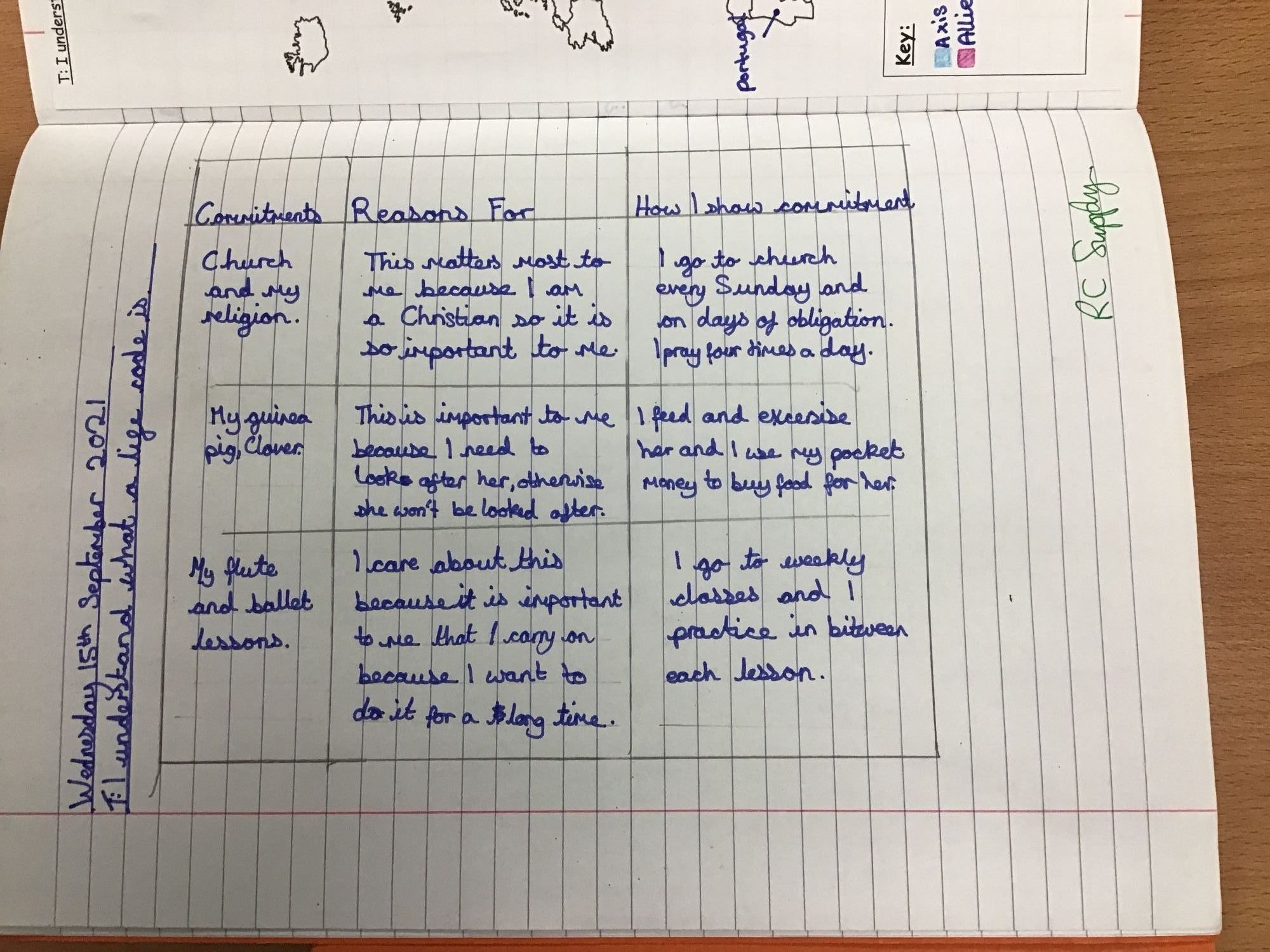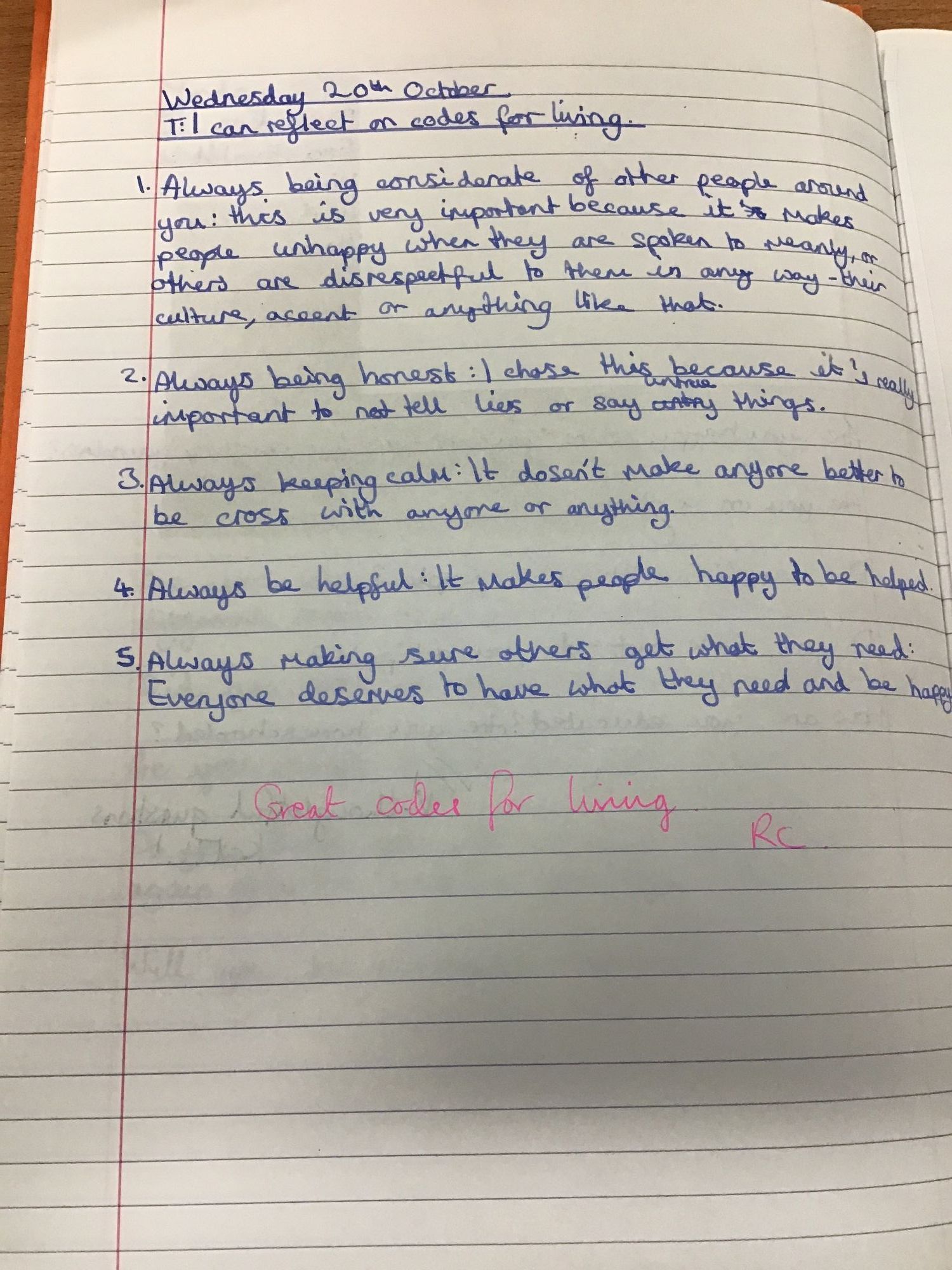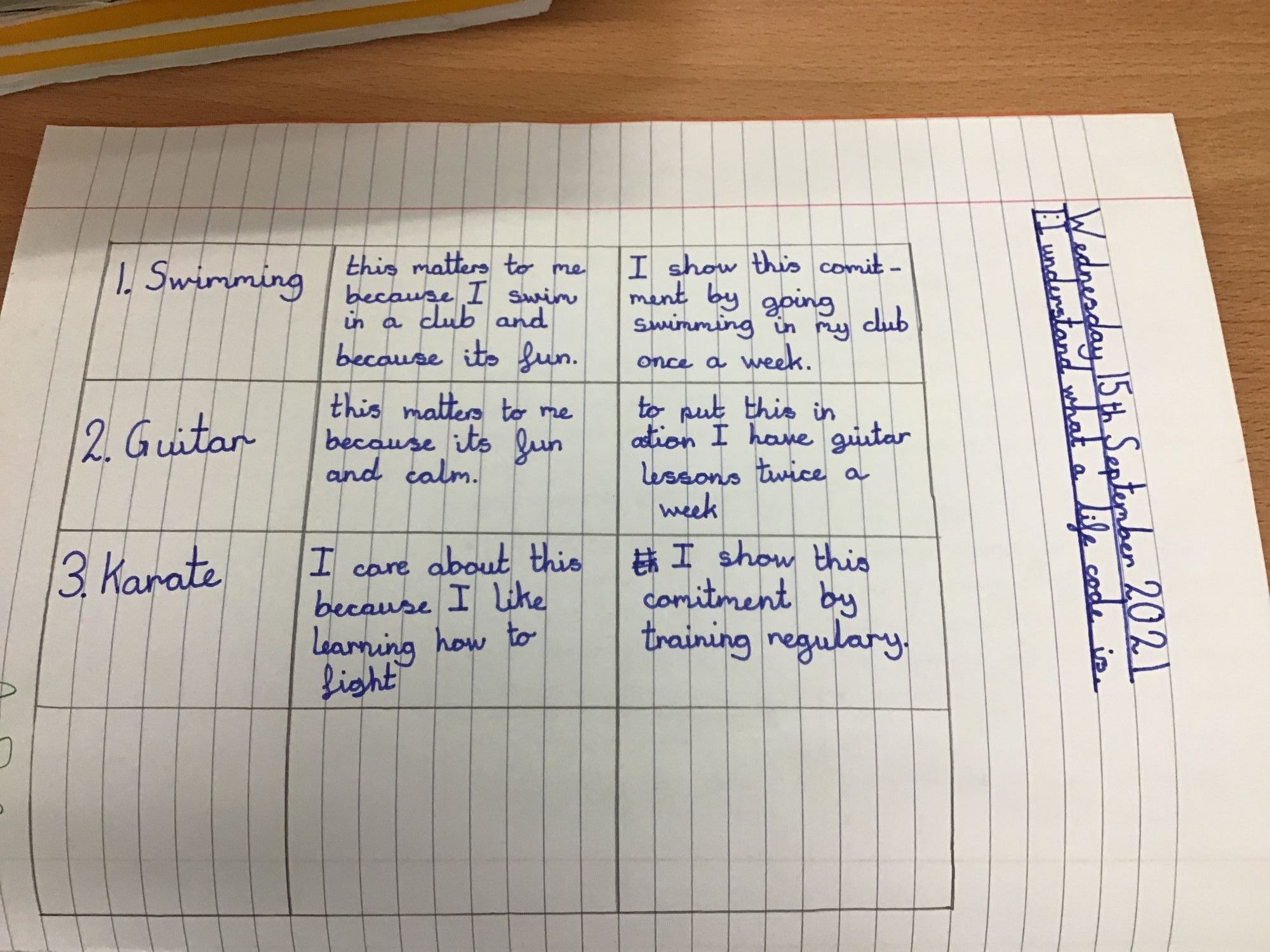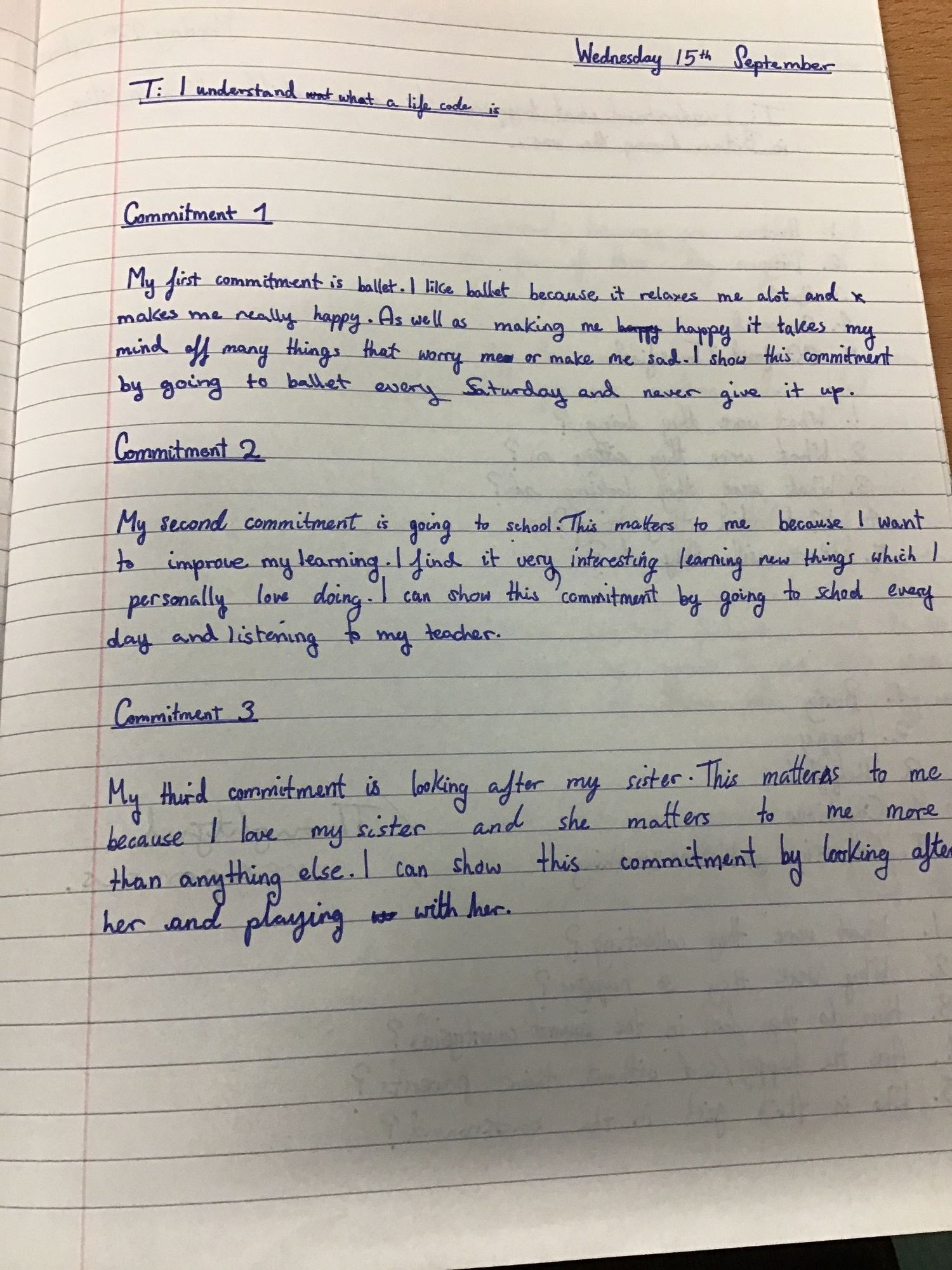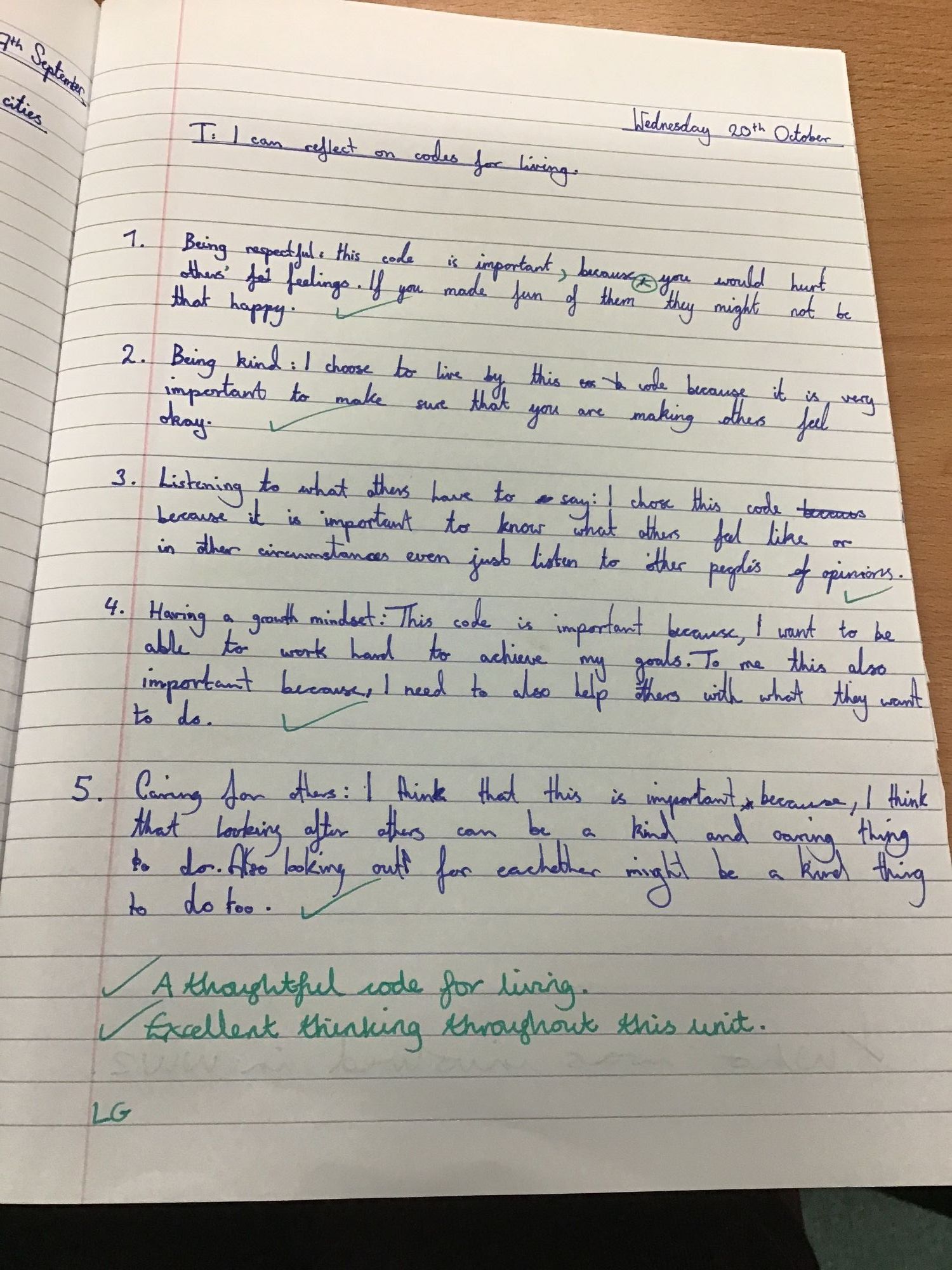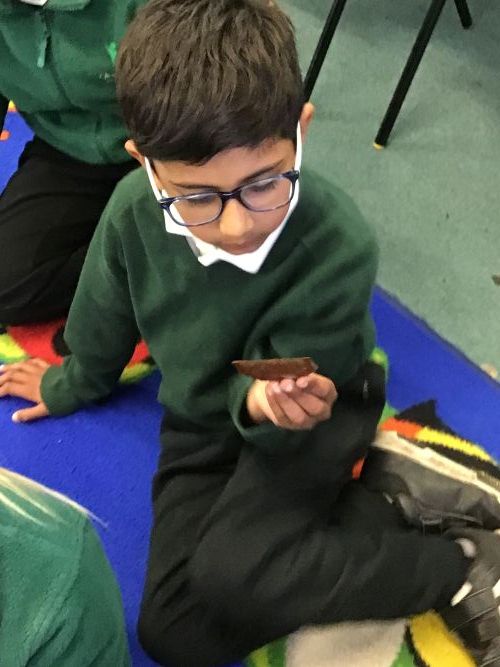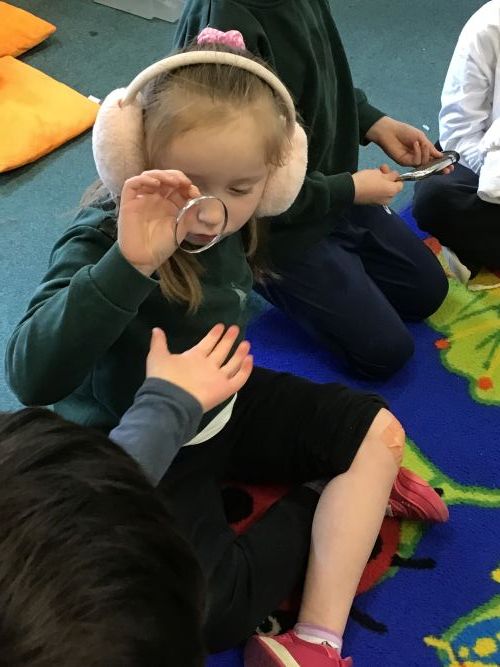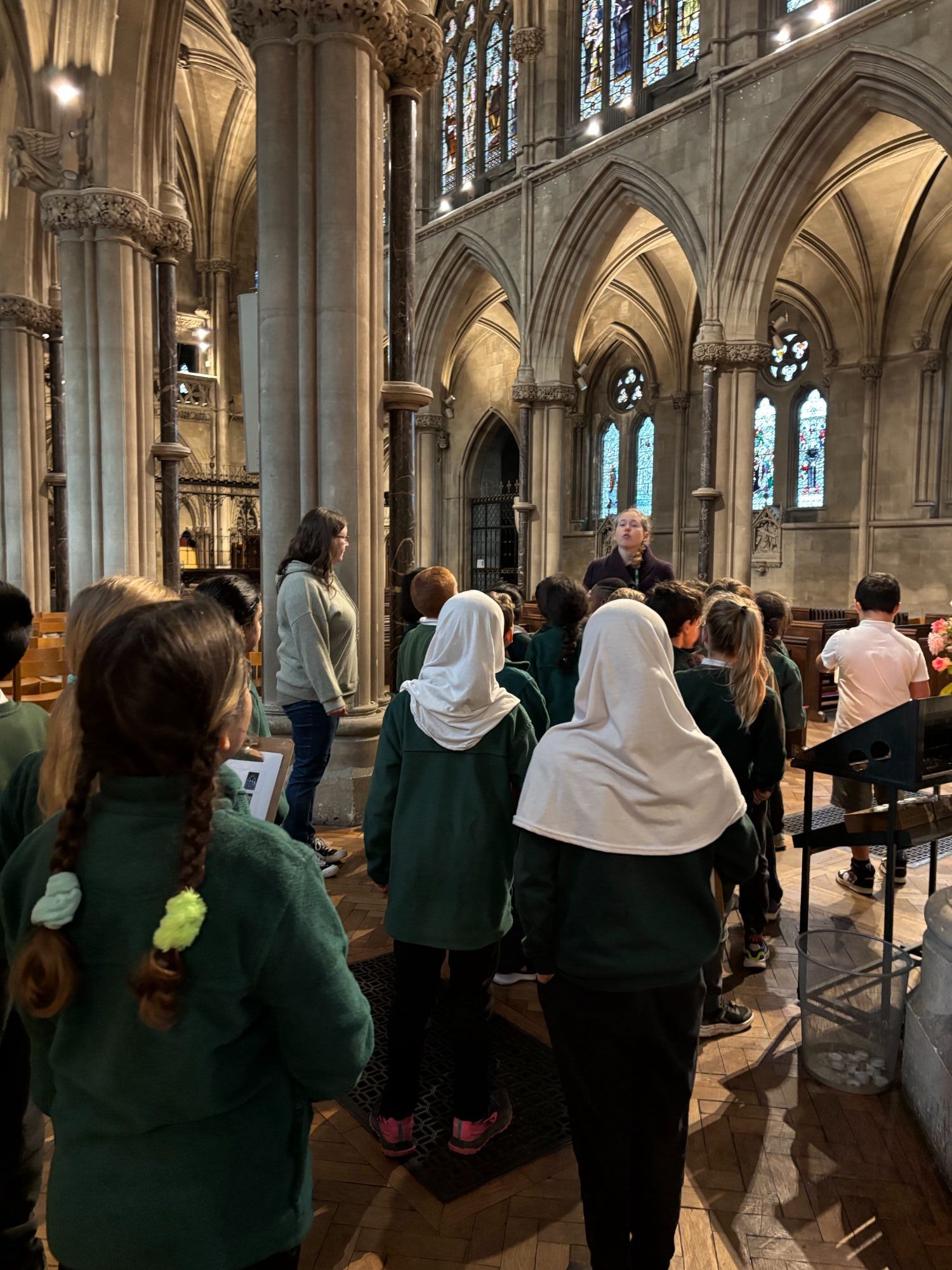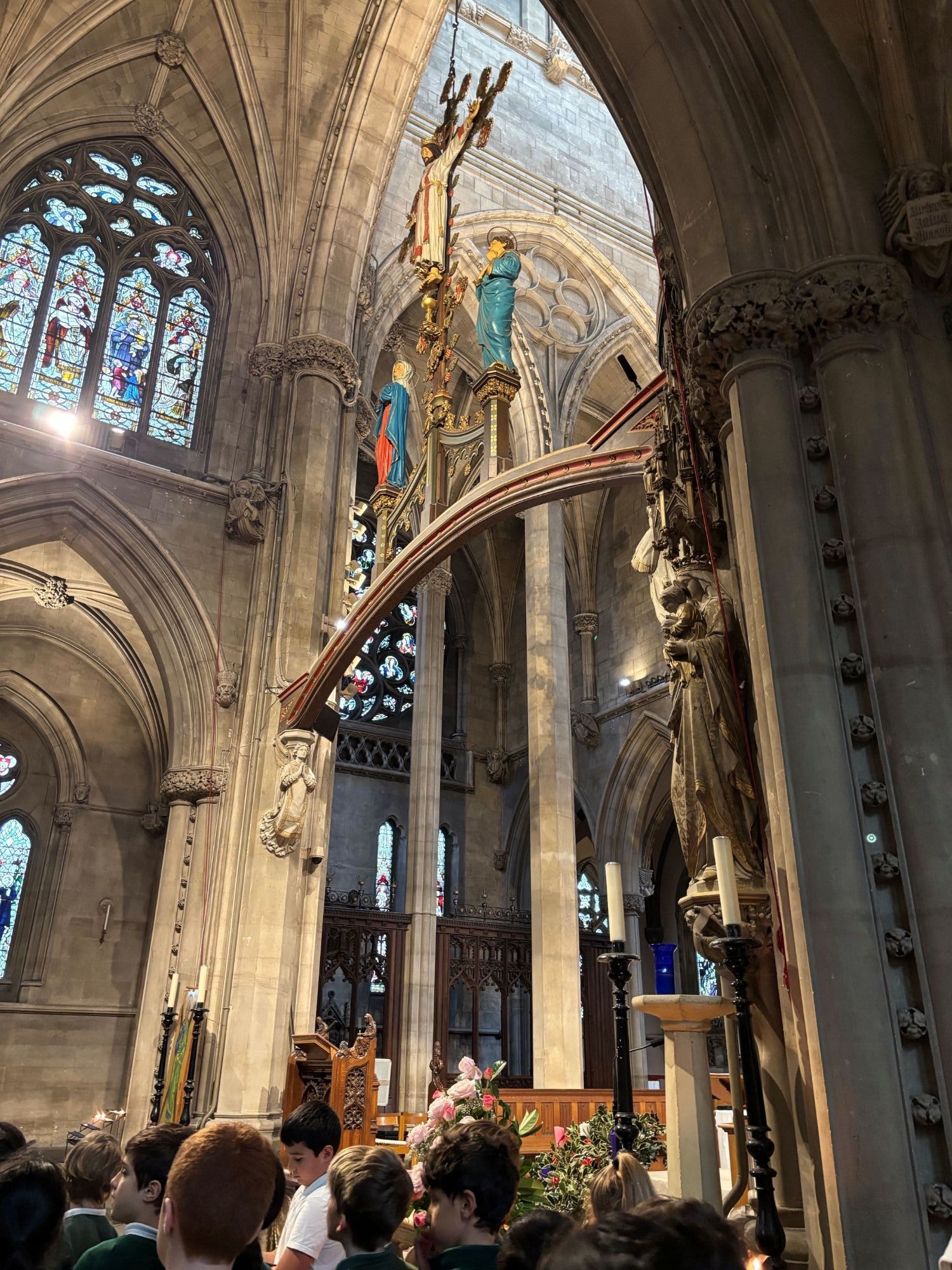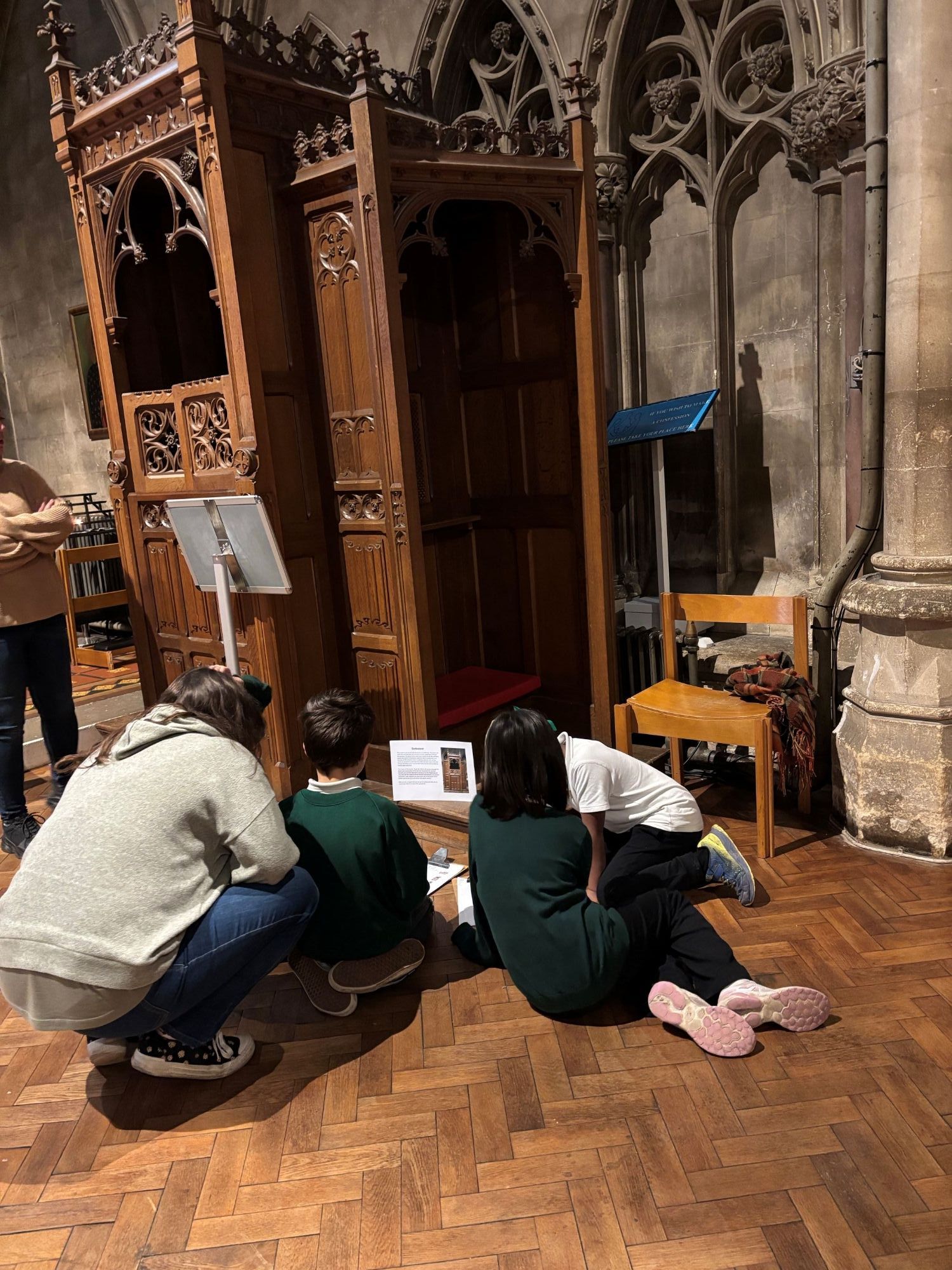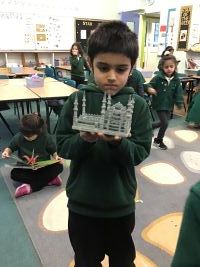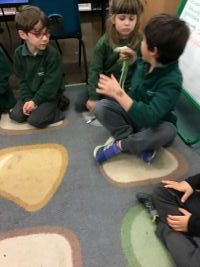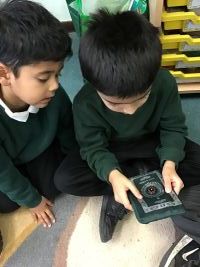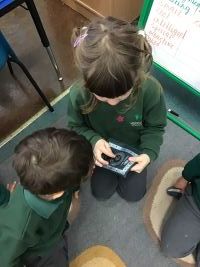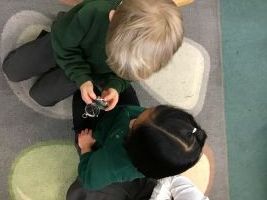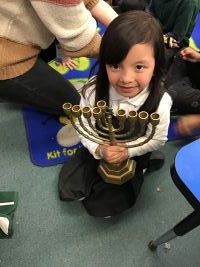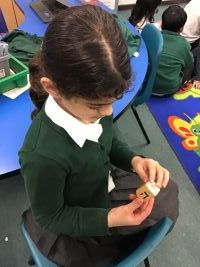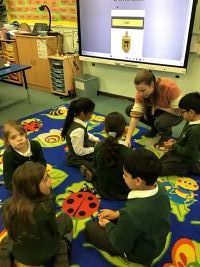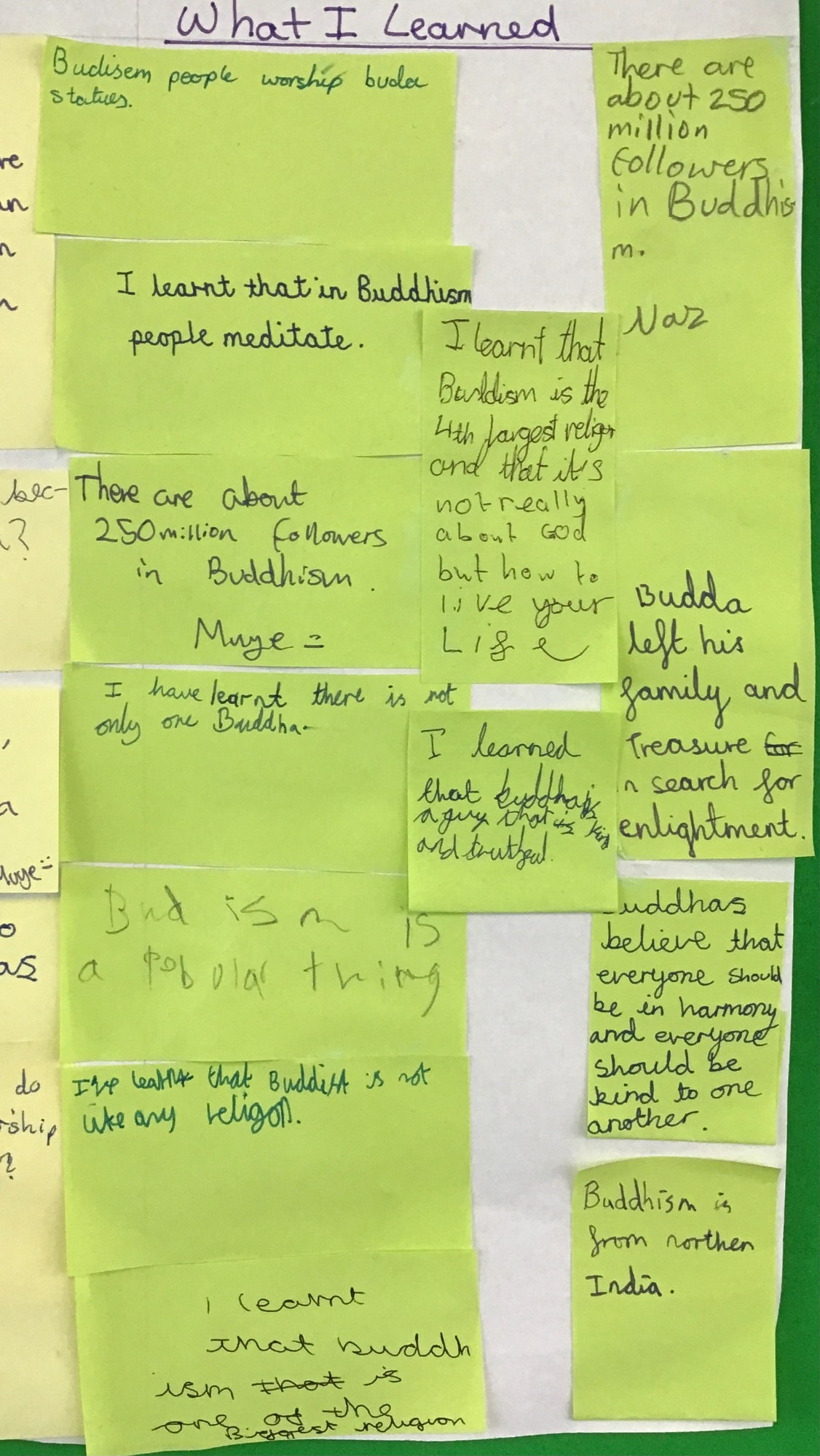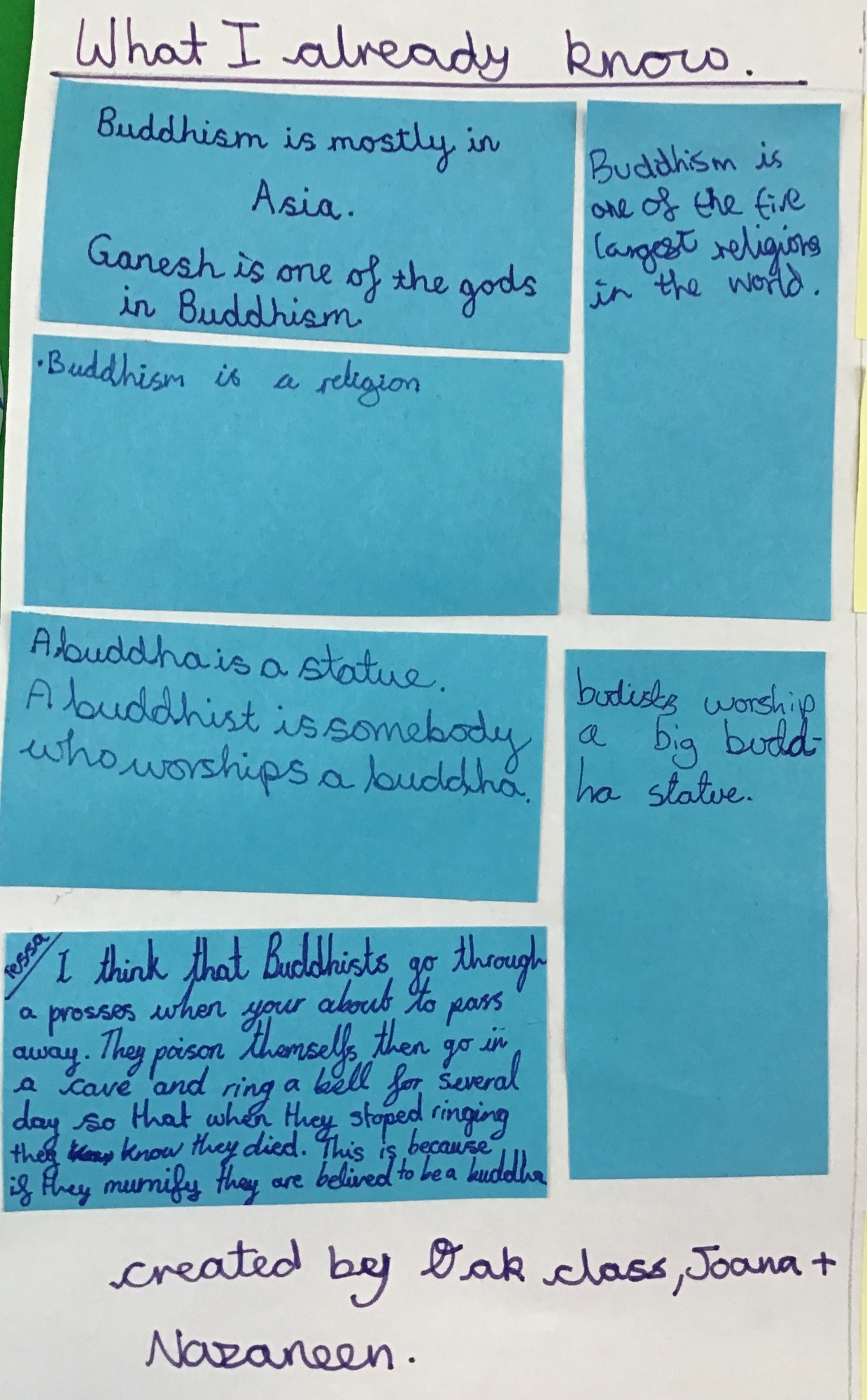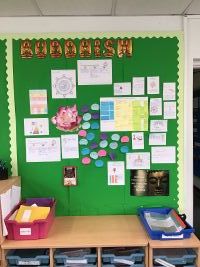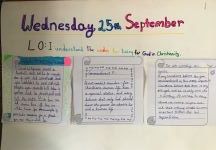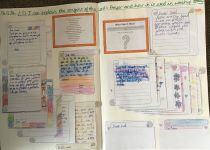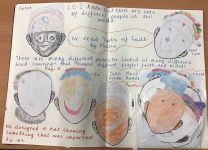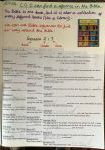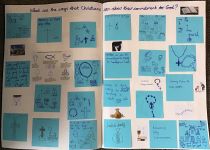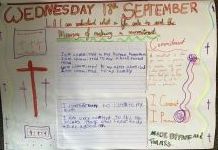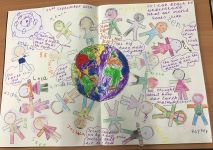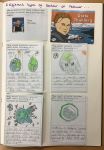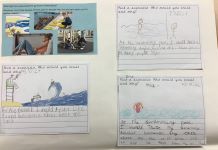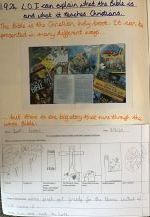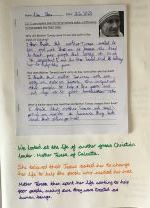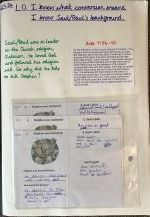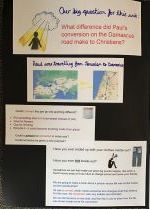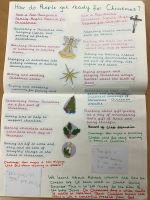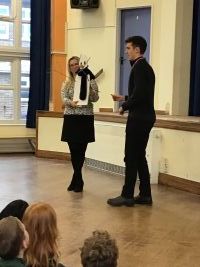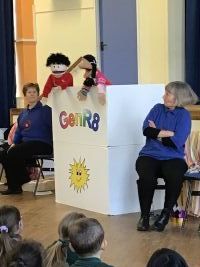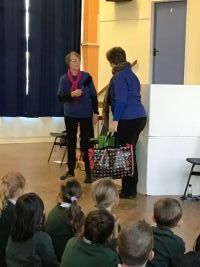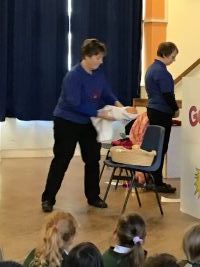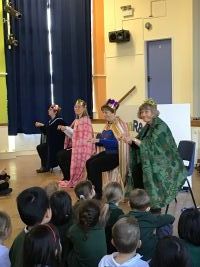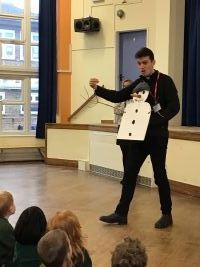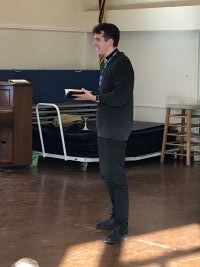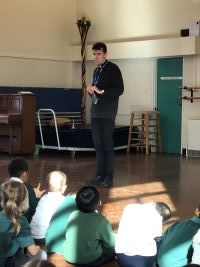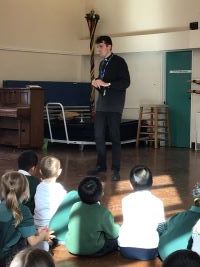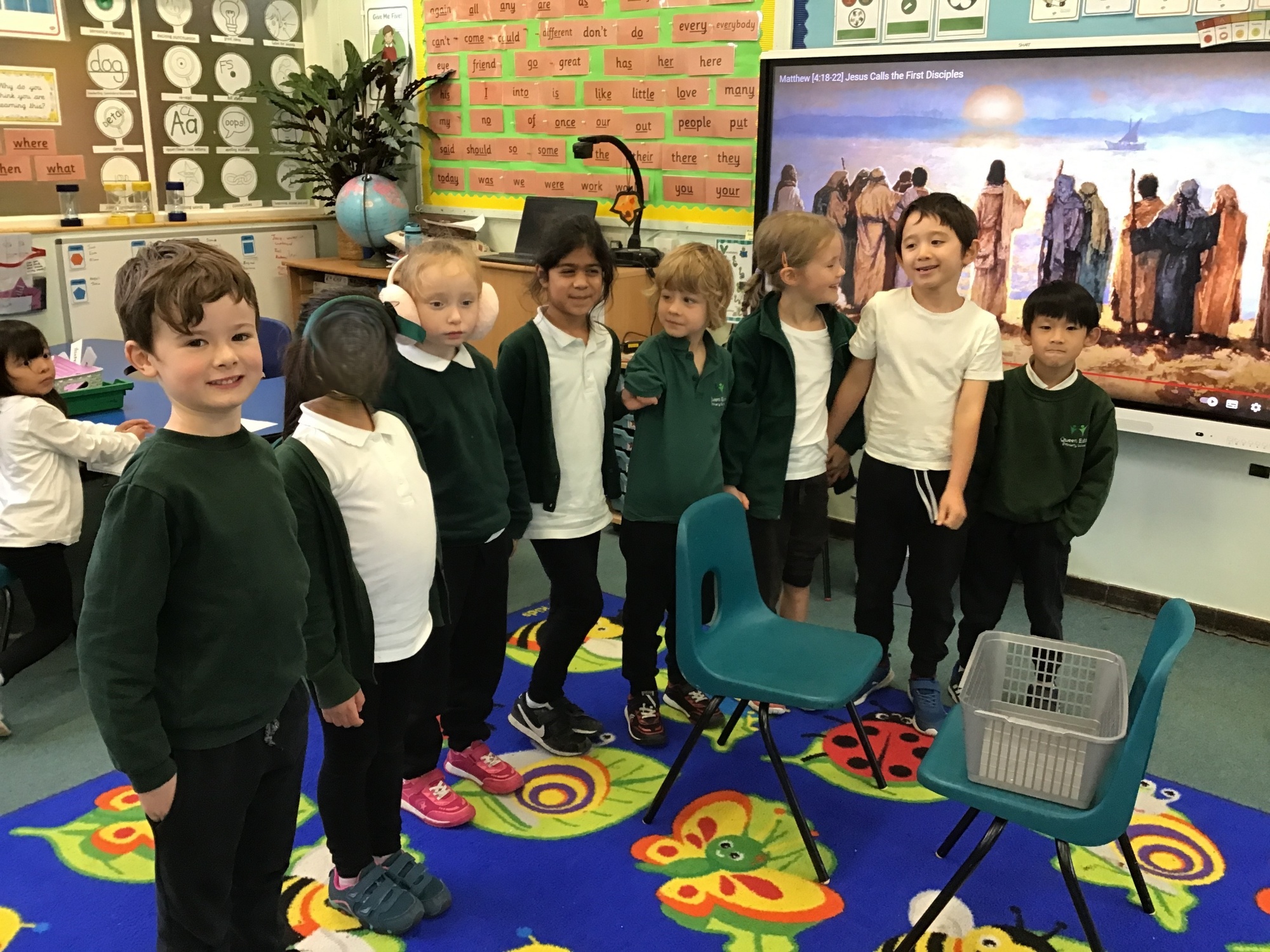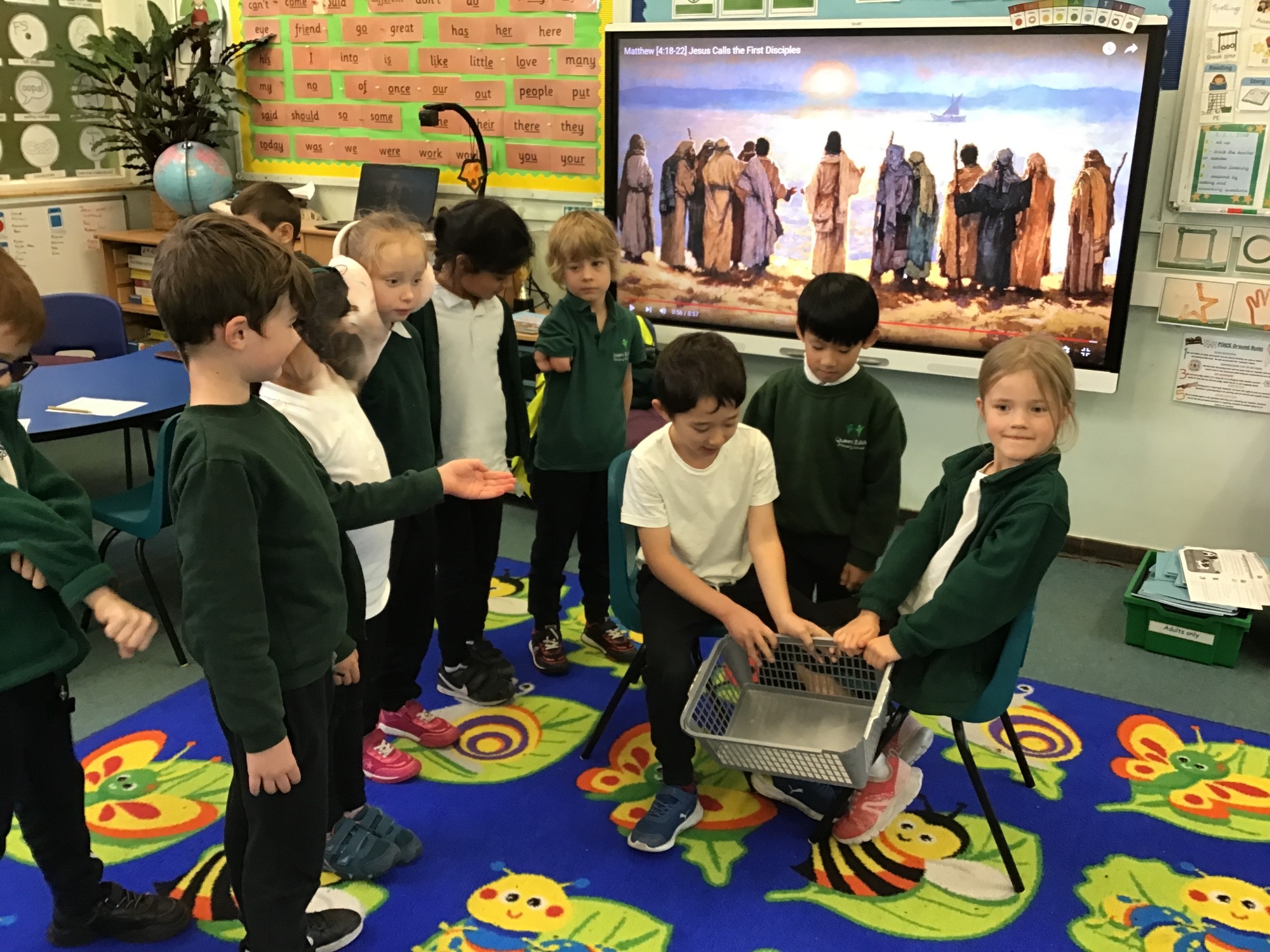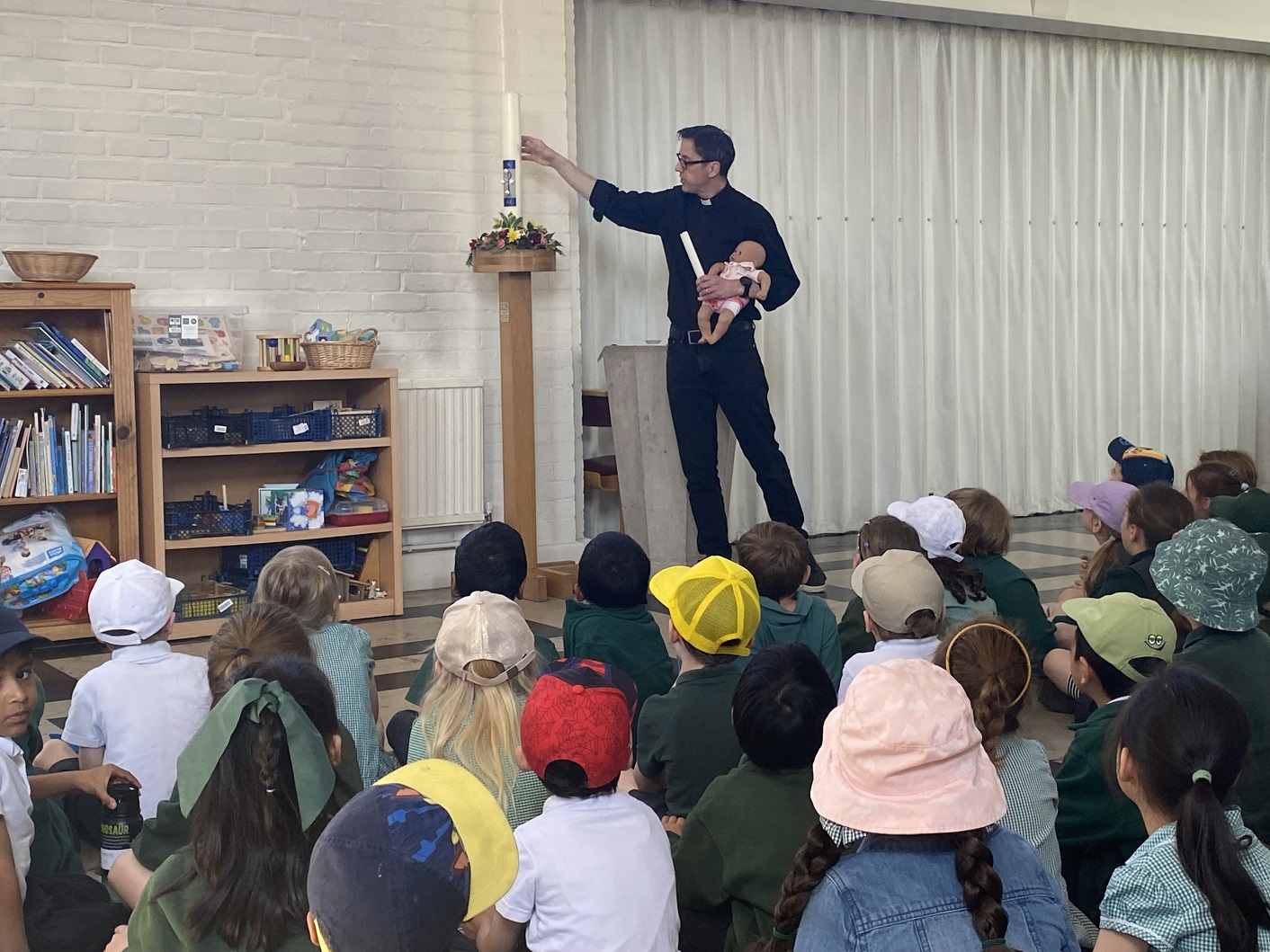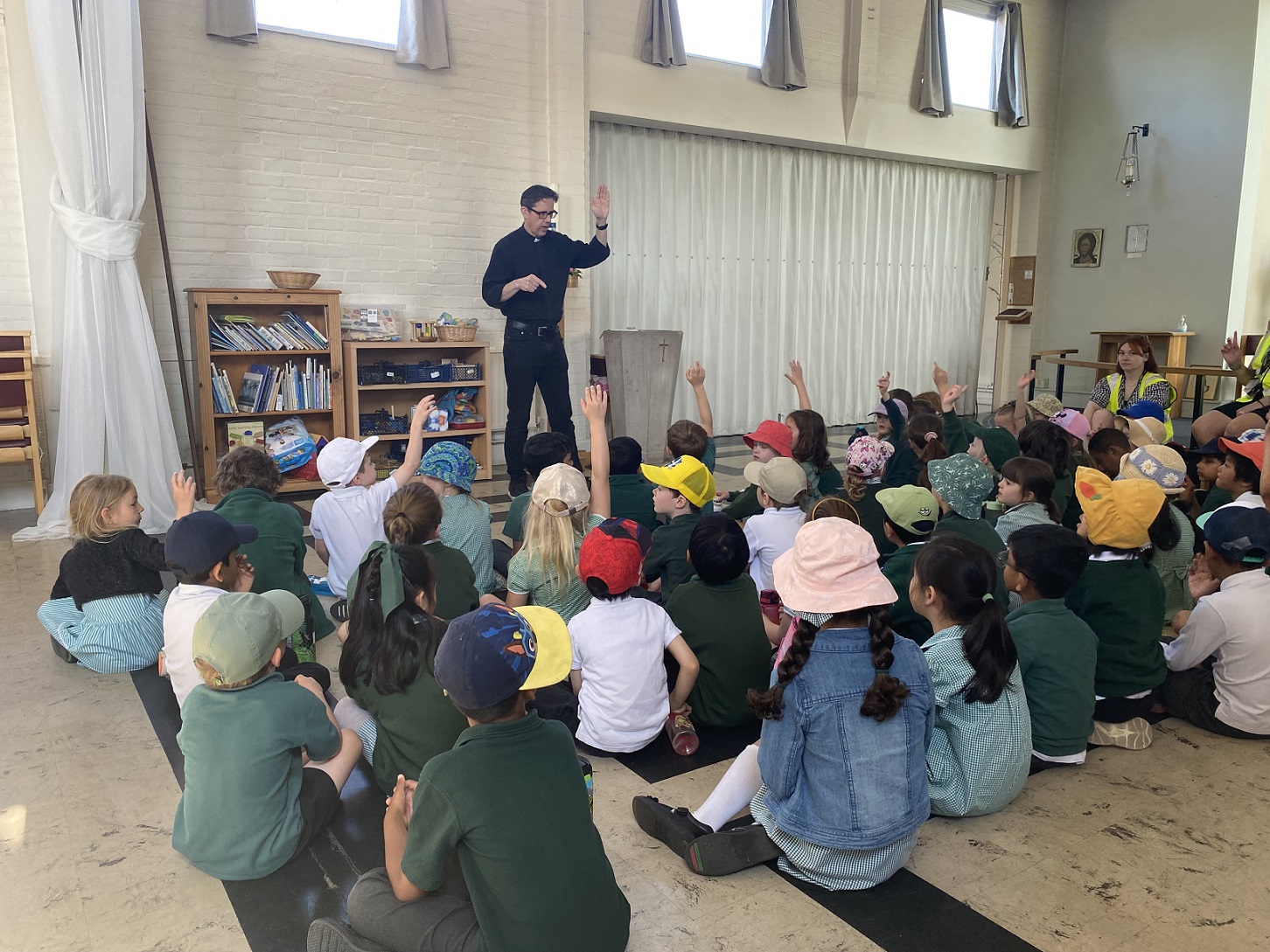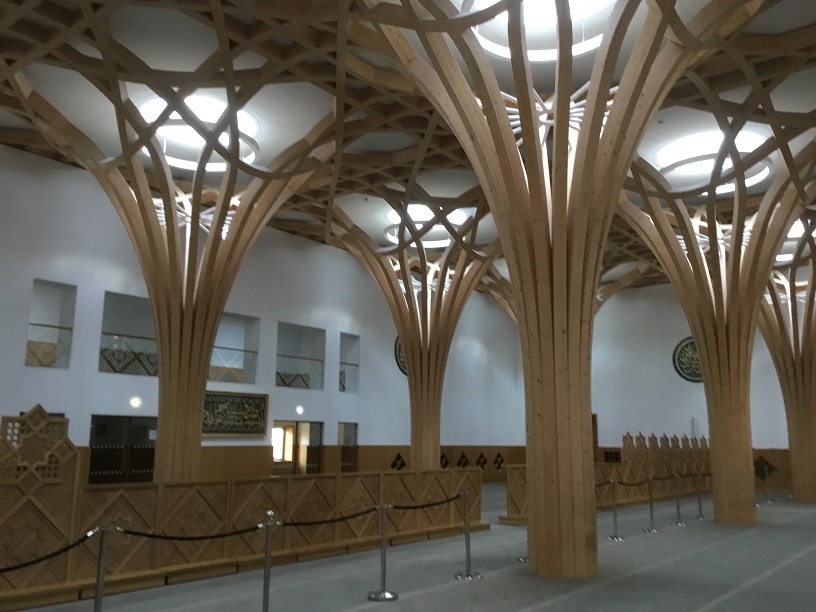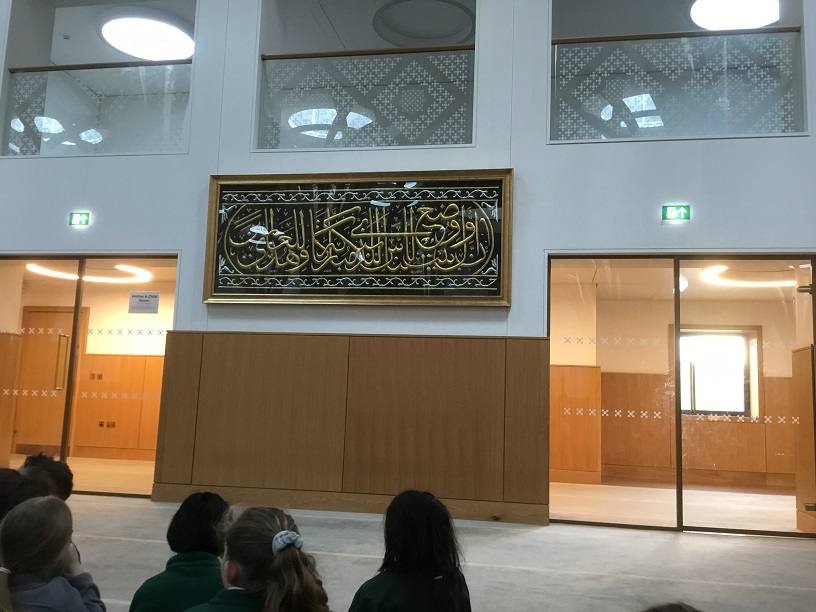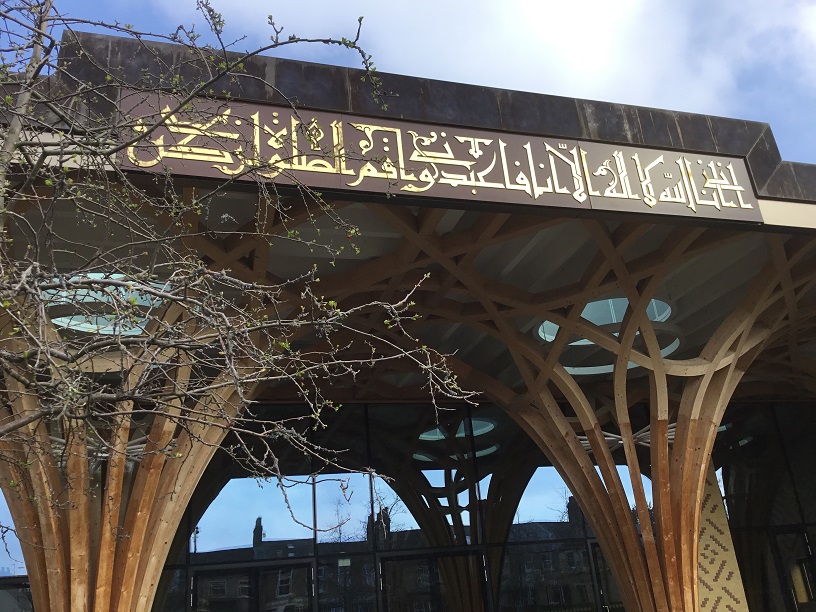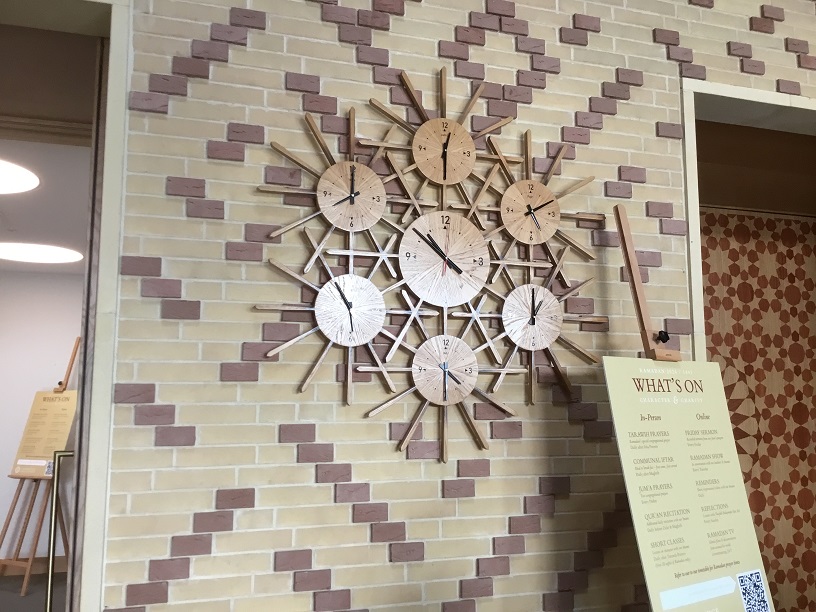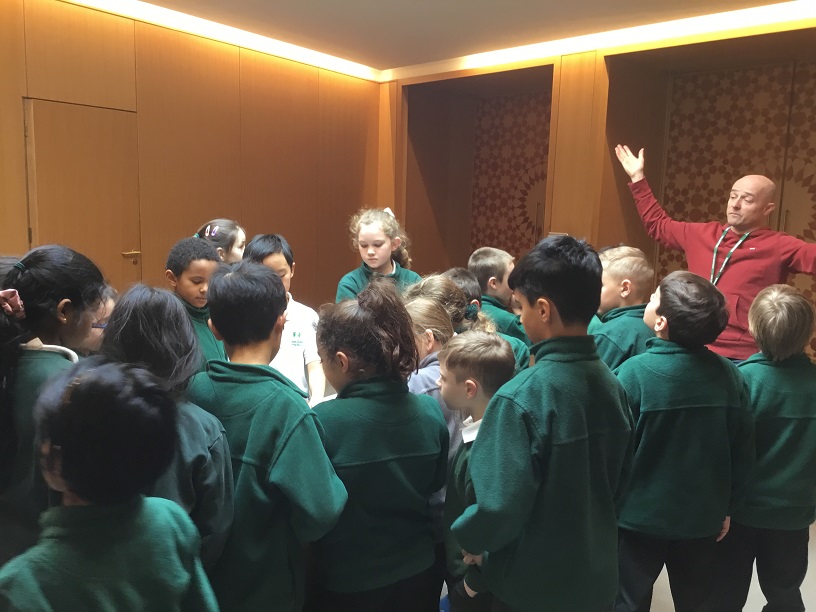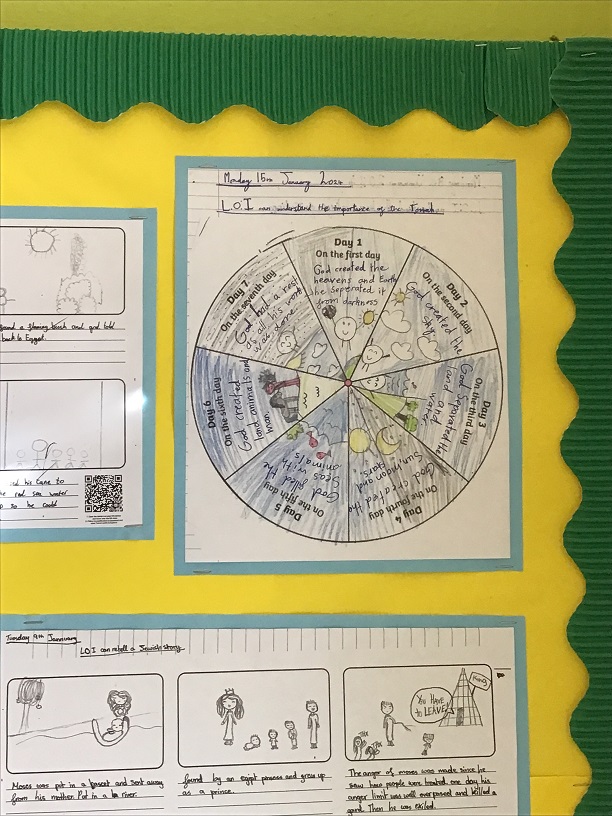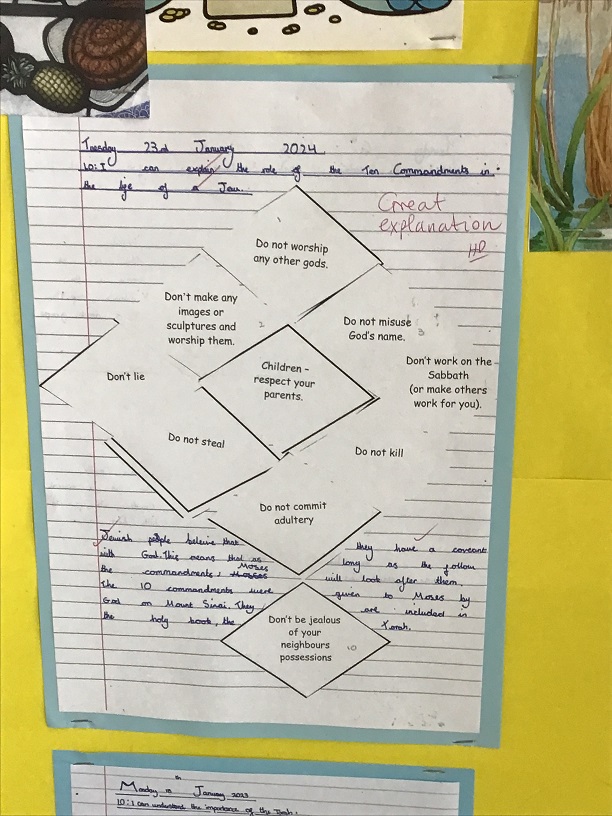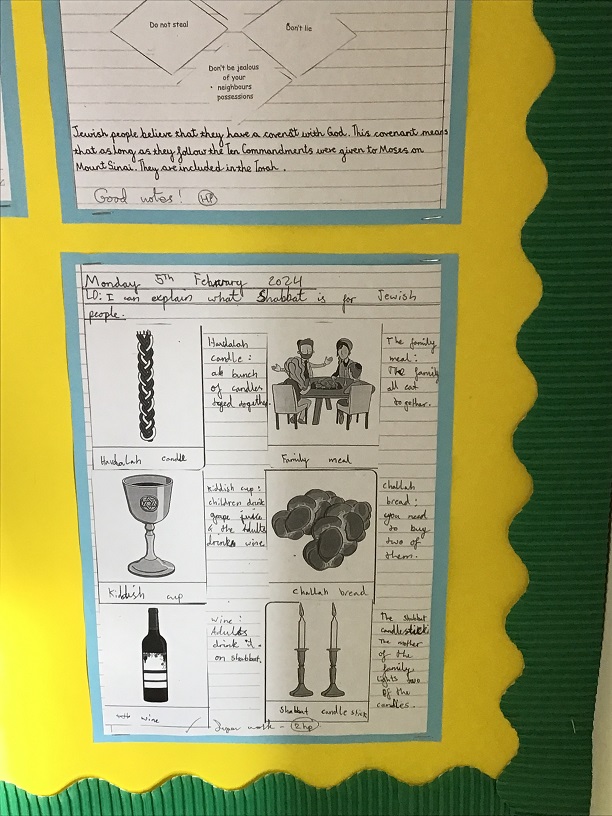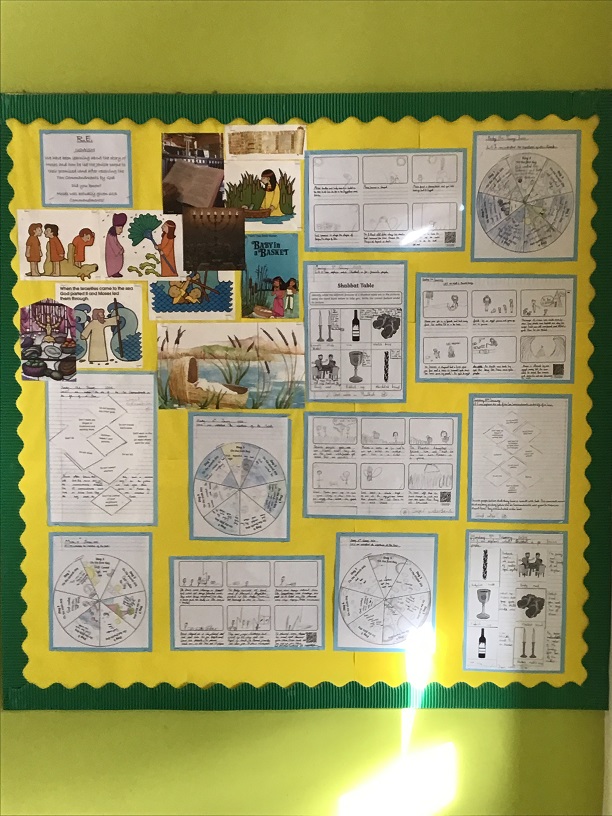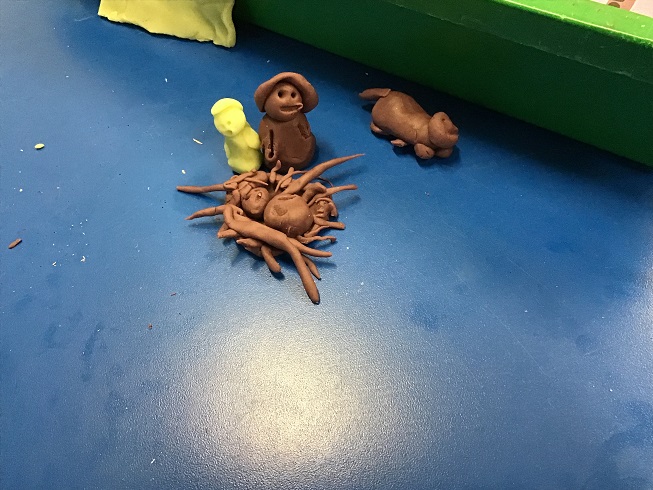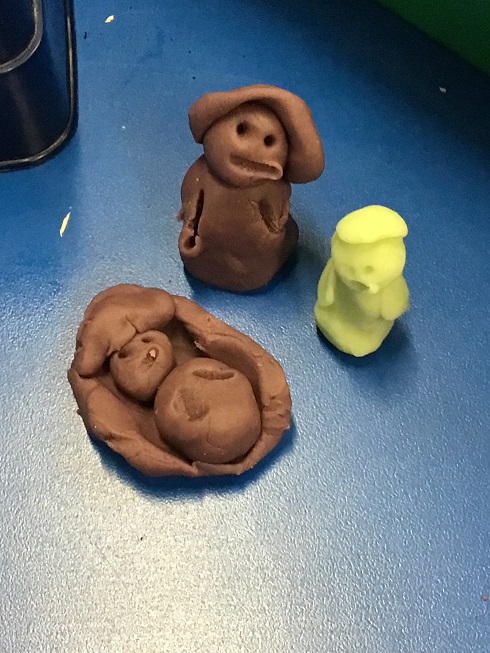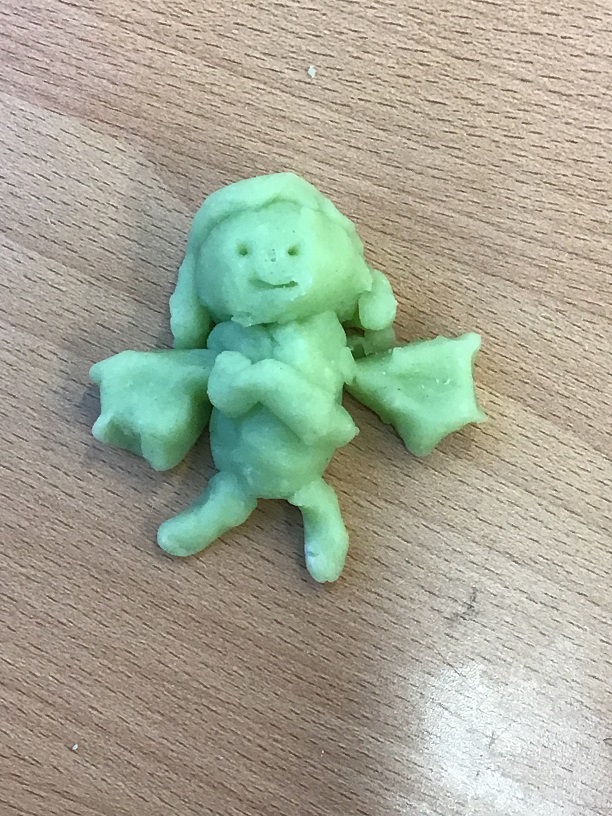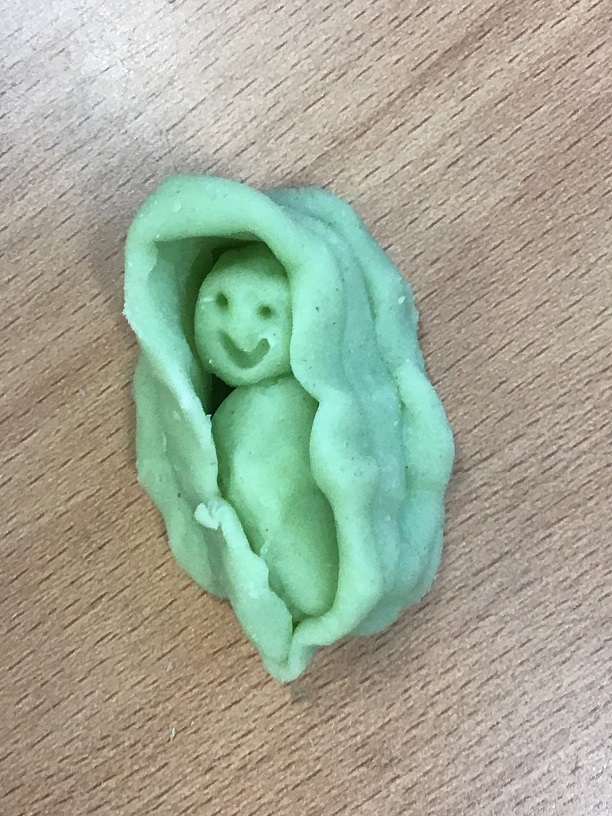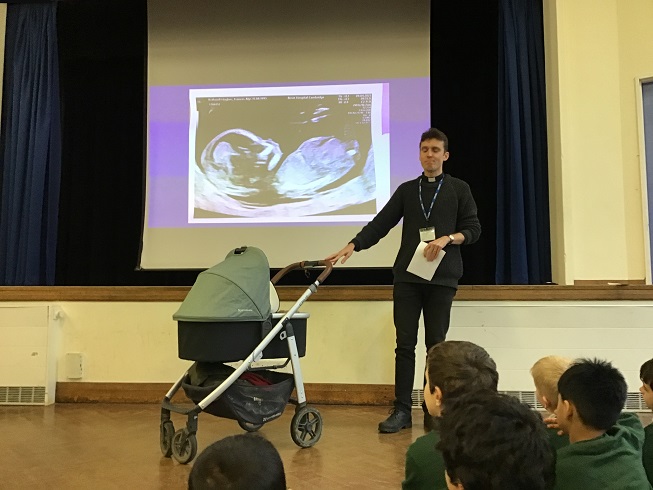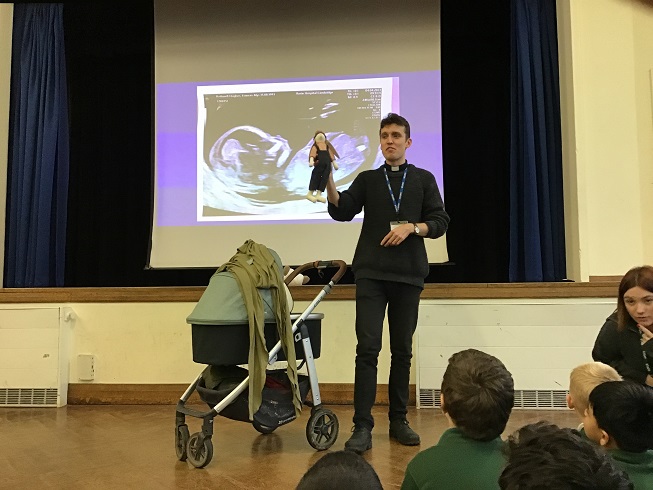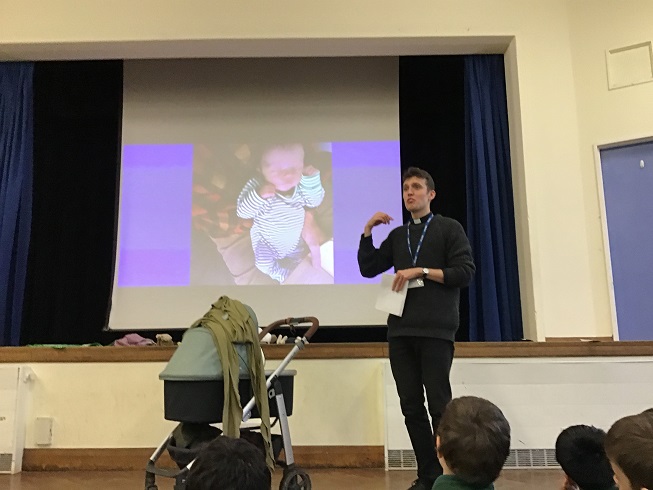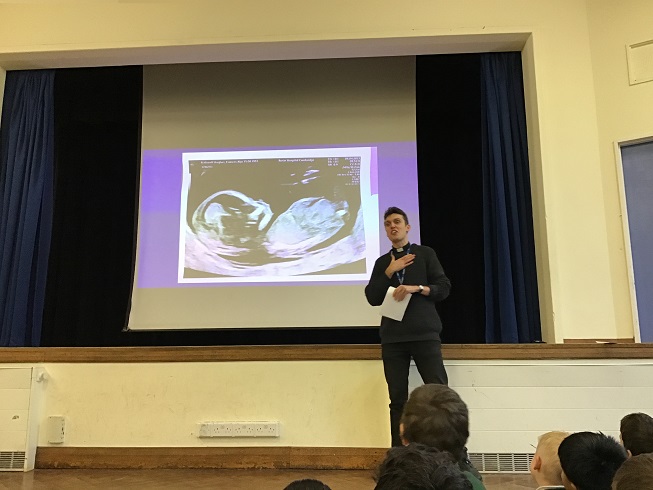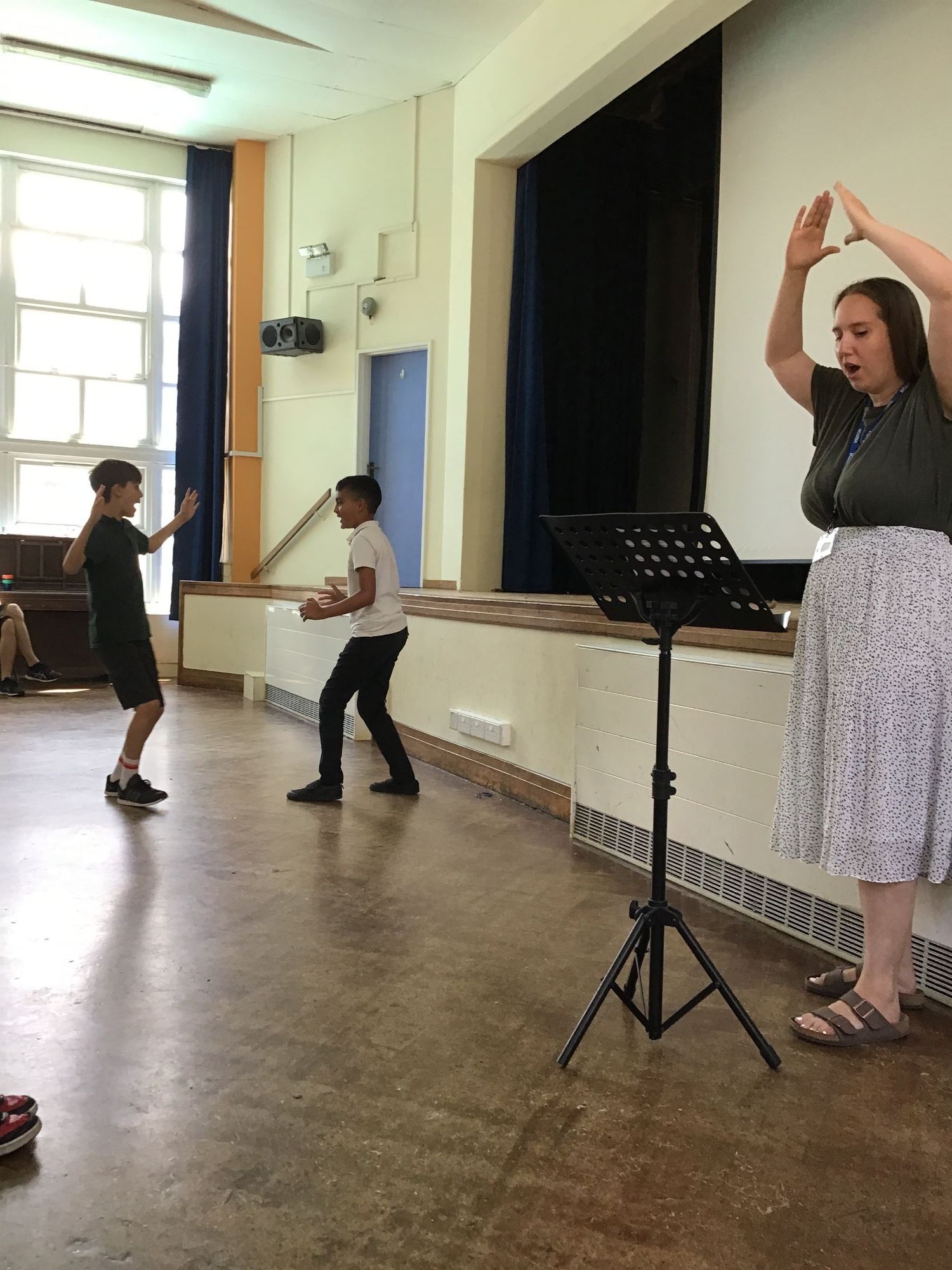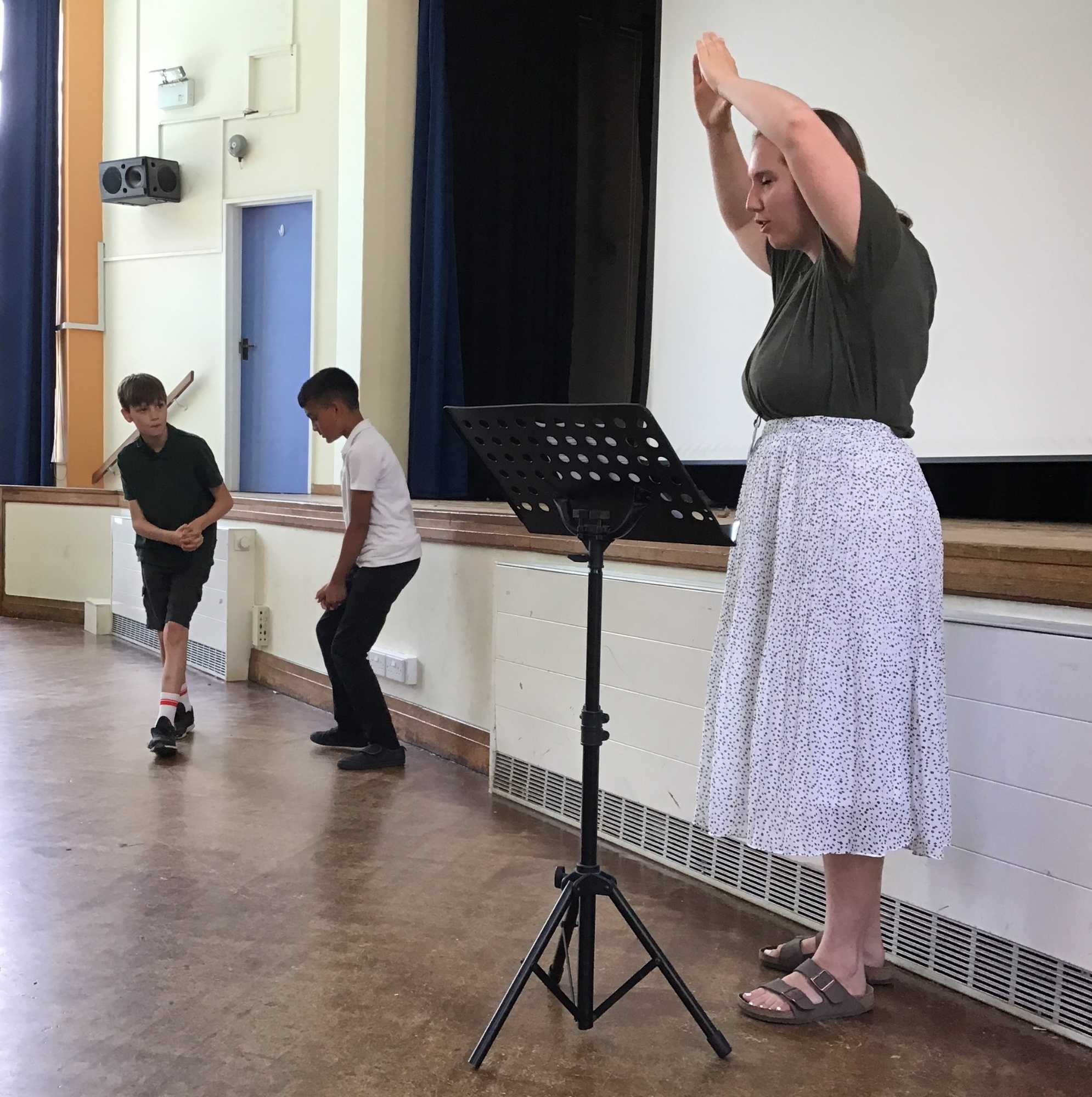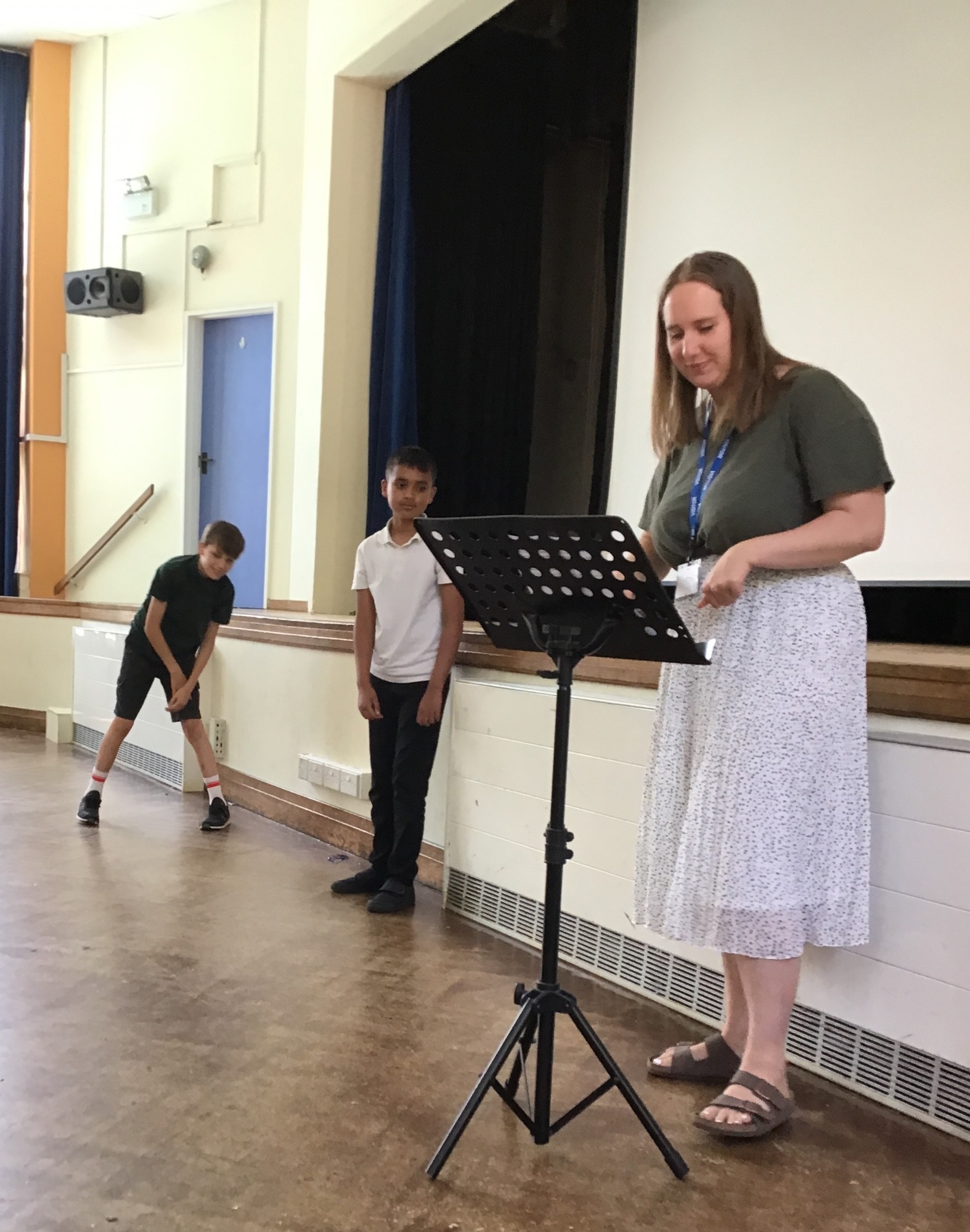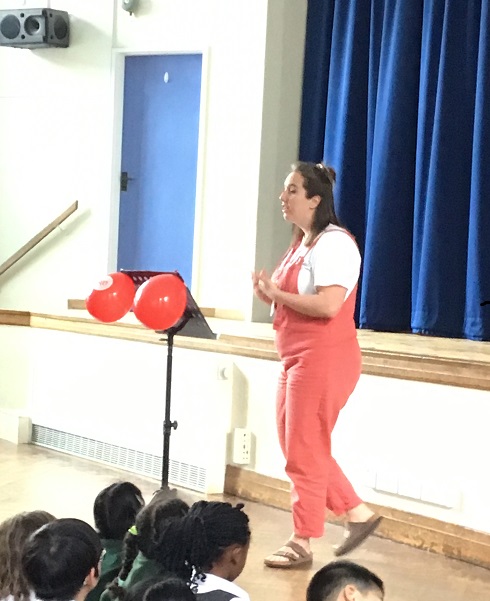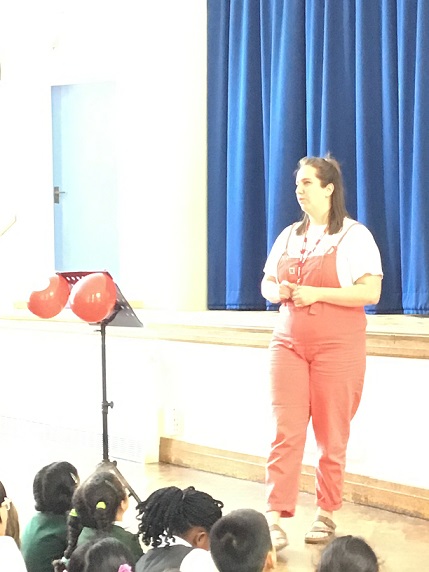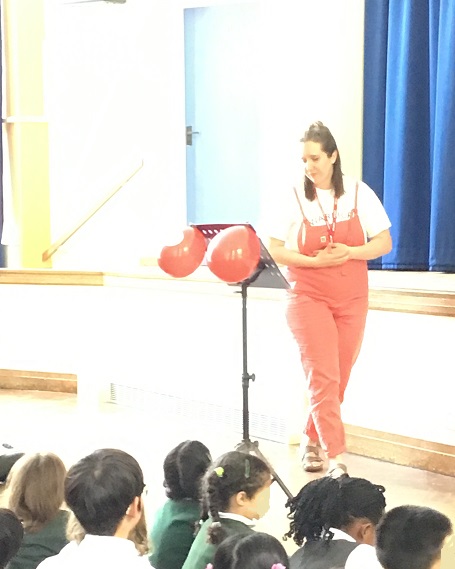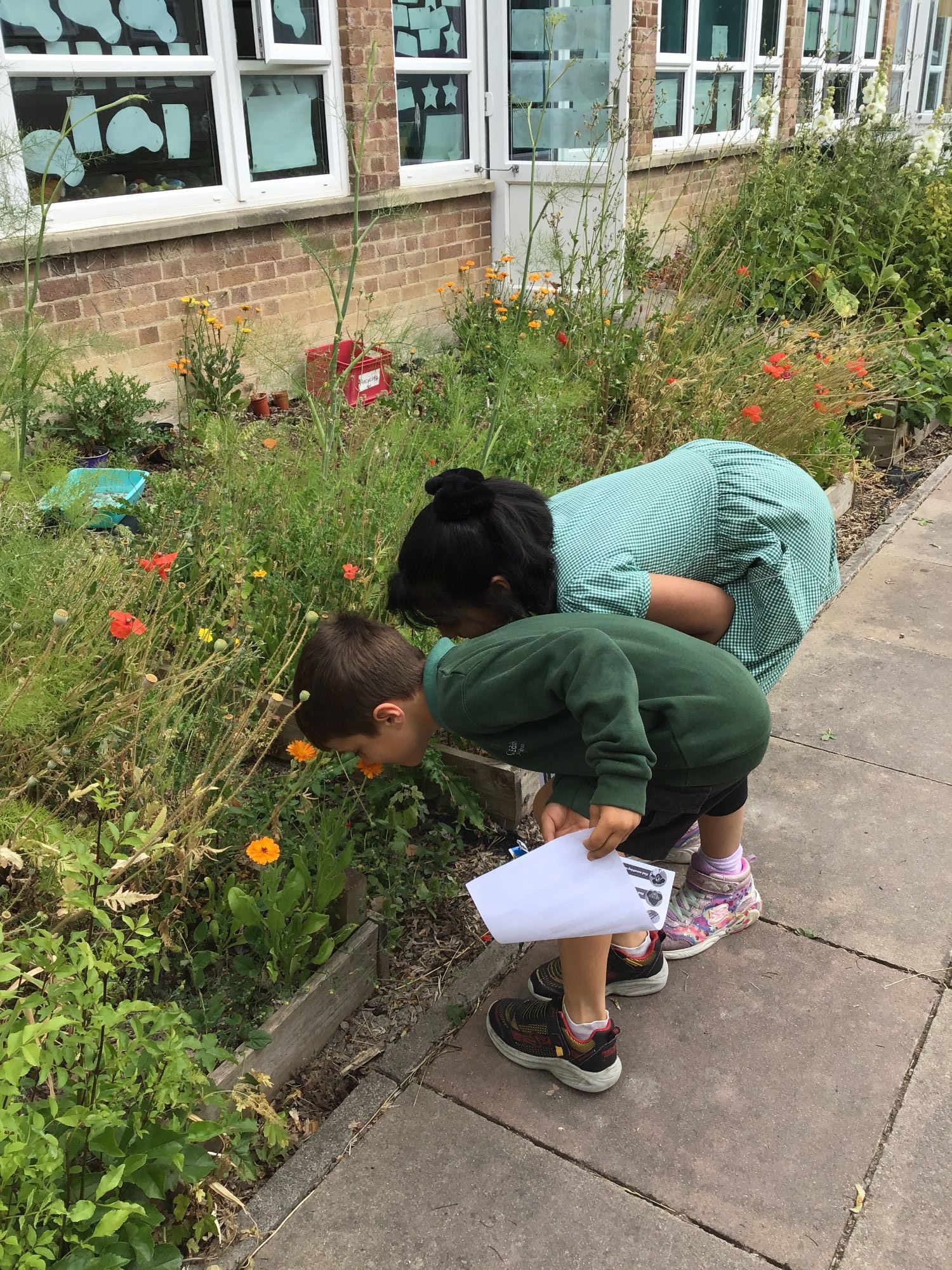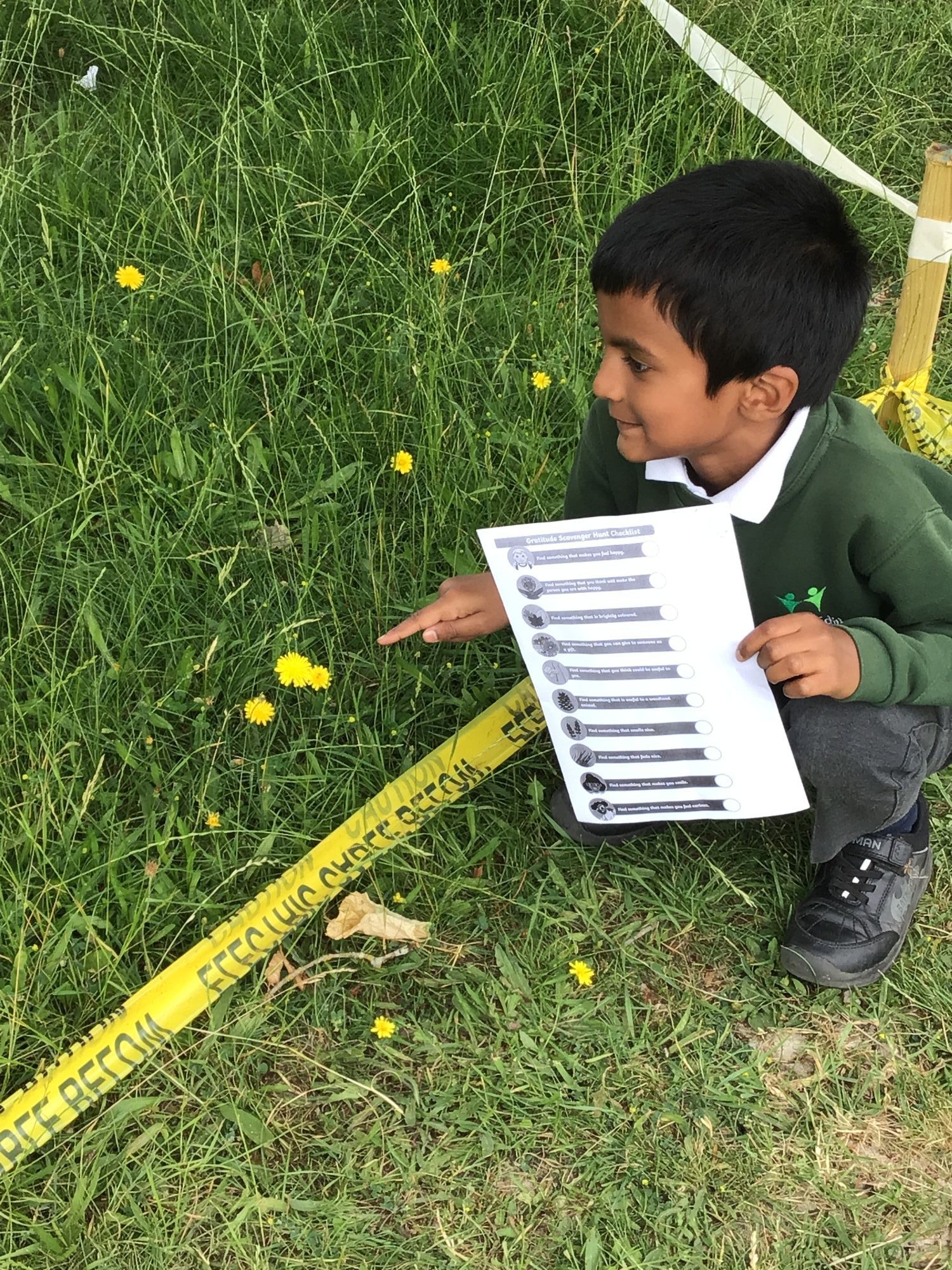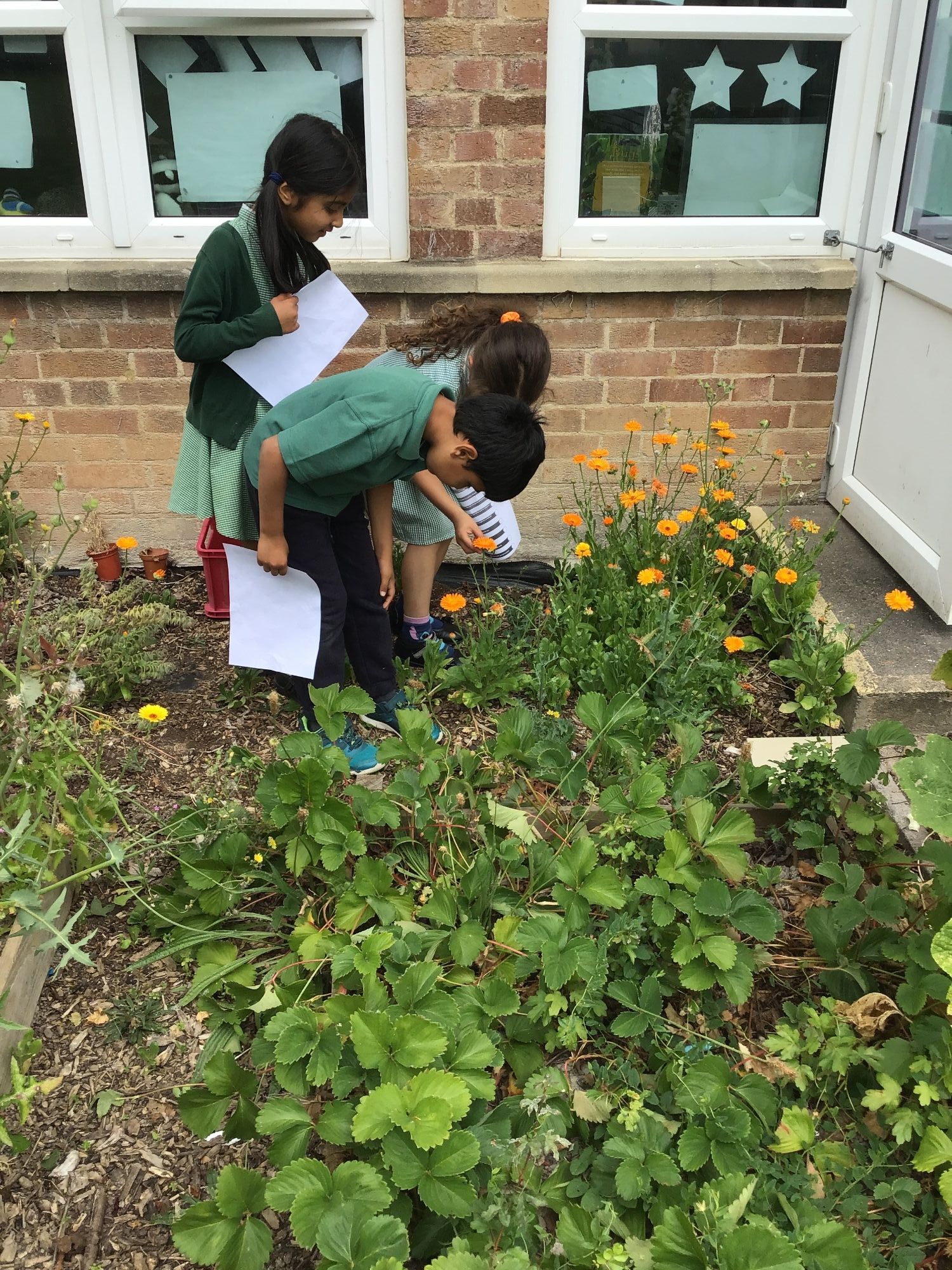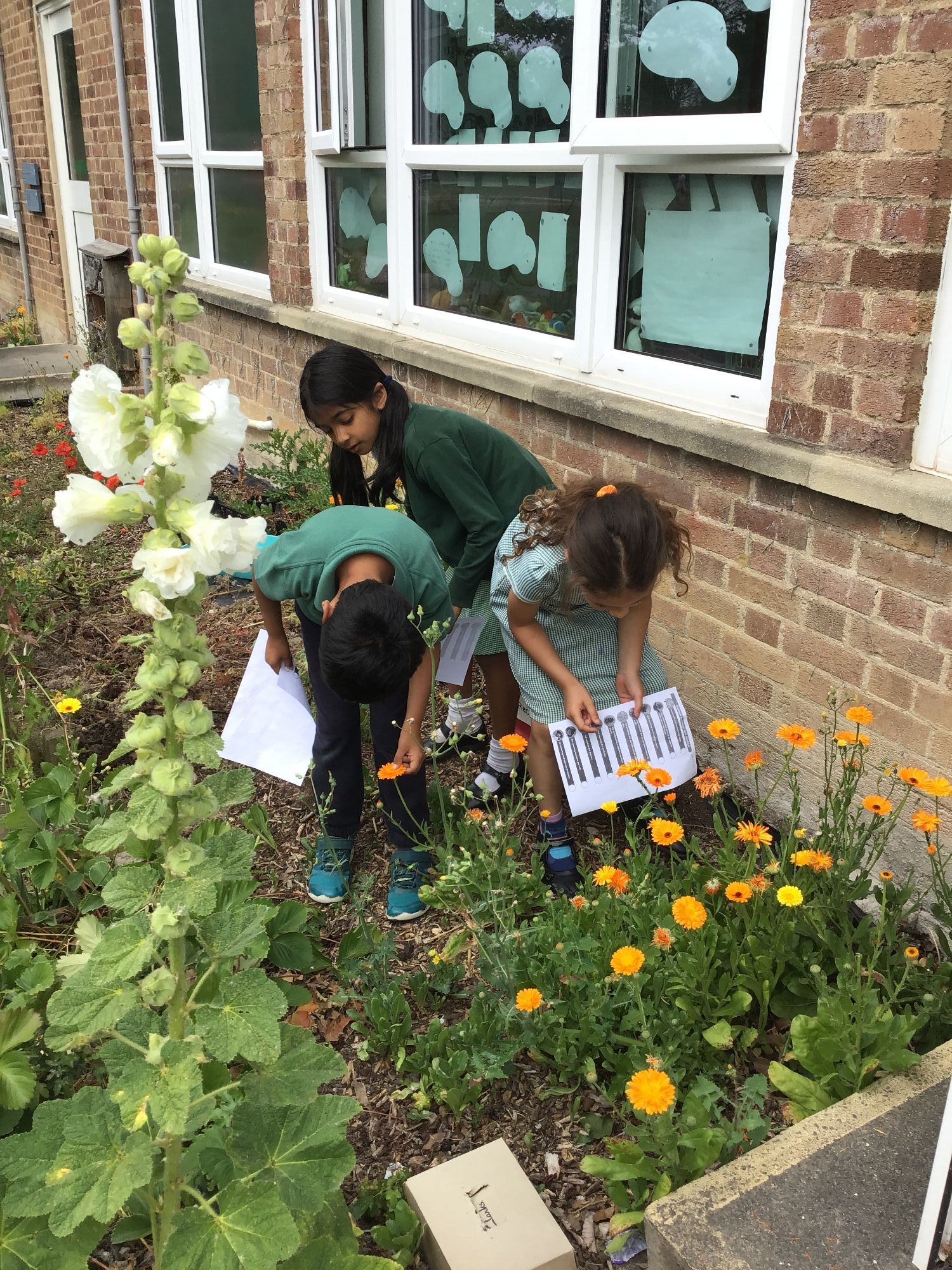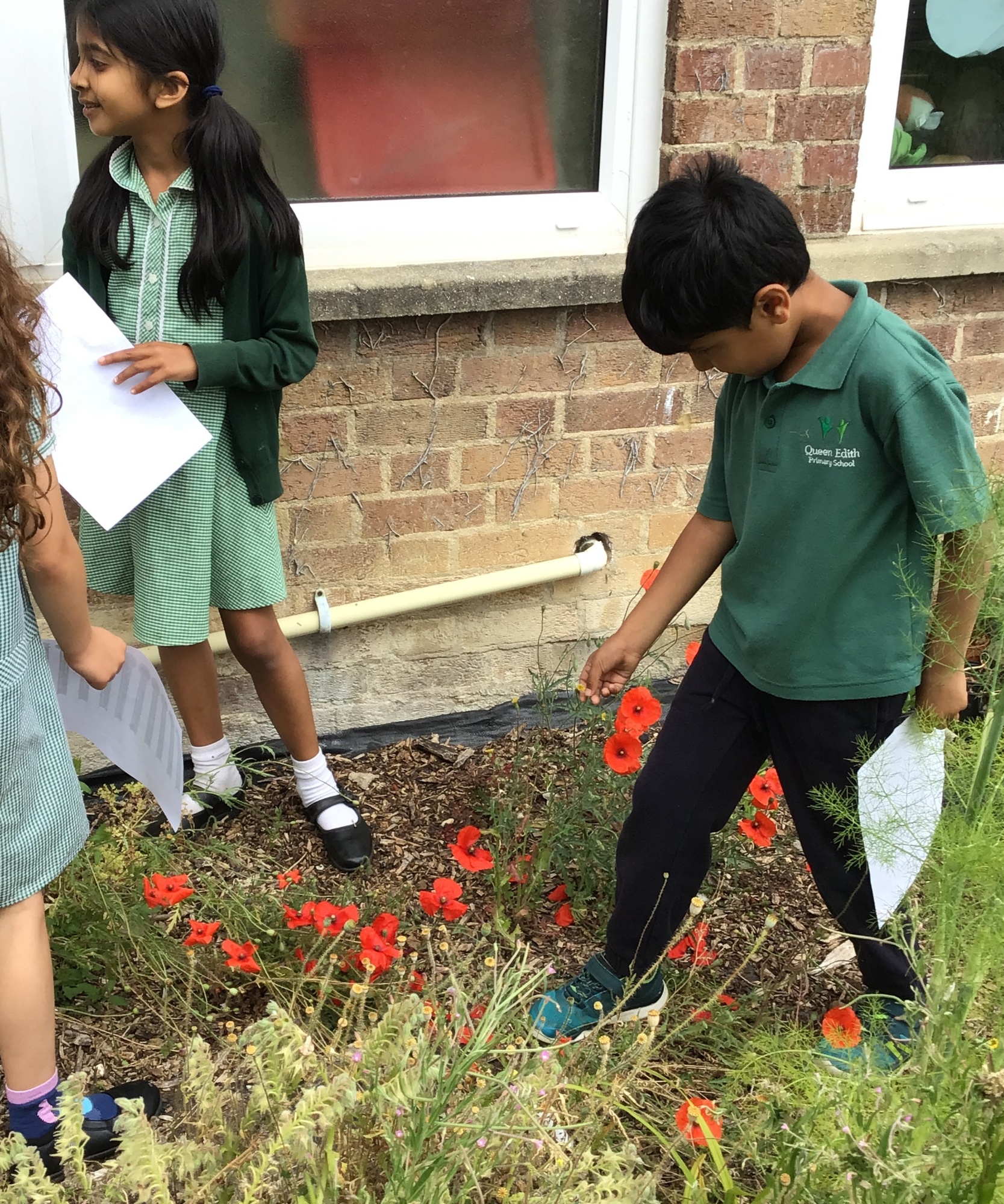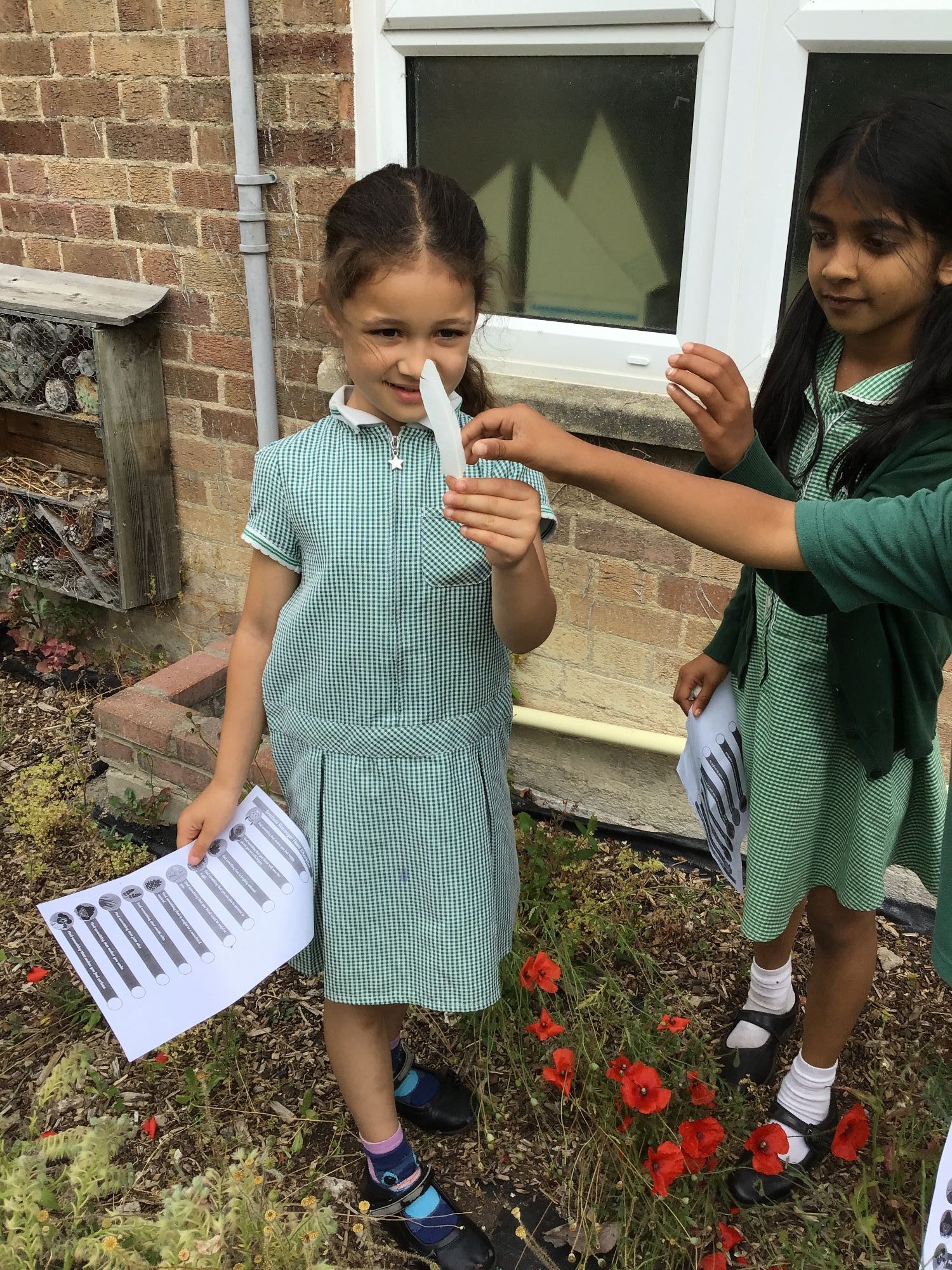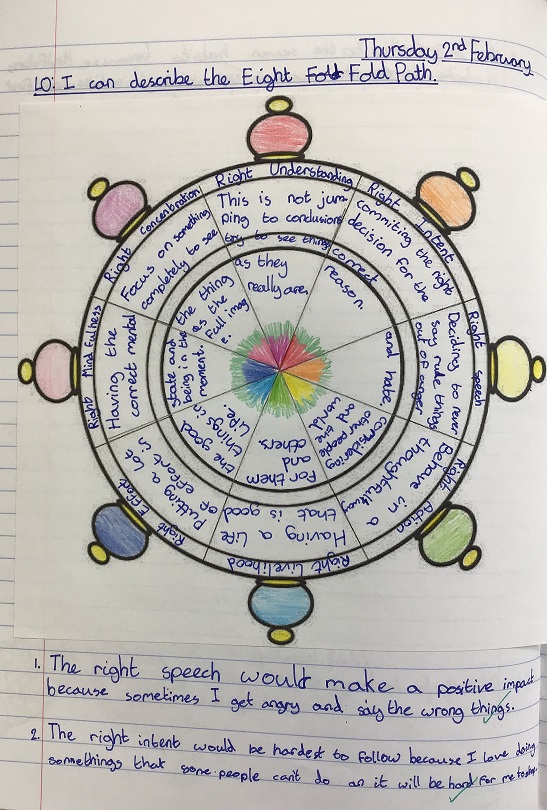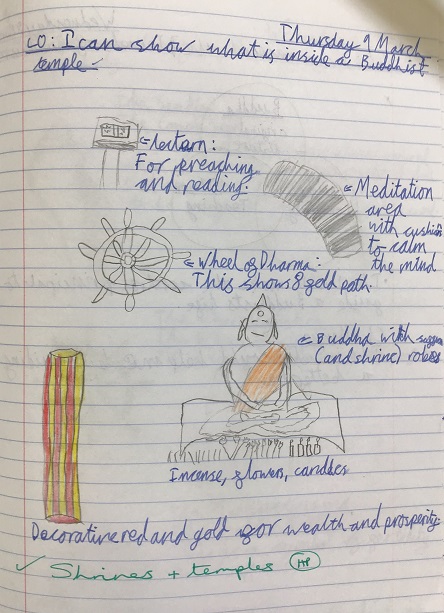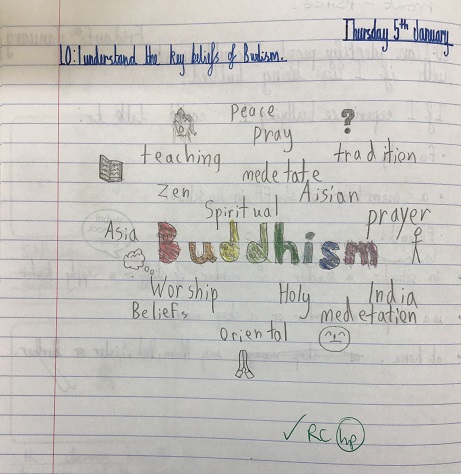Religious Education
Queens’ Federation: Religious Education Subject Statement
Intent
At the Queens’ Federation we aim to foster ‘Learning for Life.’
We will provide a rich, relevant and inspirational curriculum that promotes a lifelong love of learning and equips our pupils with the key knowledge and understanding, skills and personal qualities that they will need to thrive in a rapidly changing world. Our curriculum is designed to be relevant to our children and is linked to the context of our school and the local community.
At the Queens’ Federation, the aim of our RE curriculum is to promote religious understanding, respect and open-mindedness towards others with different religious and non-religious worldviews. It encourages pupils to develop their sense of identity and belonging through self-awareness and reflection.
The curriculum reflects the Cambridgeshire 2023 Agreed Syllabus for RE, which emphasises exploring religion and worldviews through an enquiry-based approach. Pupils engage with big questions about beliefs, values and practices to develop their understanding and appreciation of the beliefs, cultural practices and worldviews within the local, national and global community.
By integrating the study of both religious and non-religious perspectives, such as Humanism, our curriculum fosters tolerance, inclusivity and respect. Through this approach, pupils build the knowledge, skills and attitudes necessary to engage thoughtfully with the diverse world in which they live.
Implementation
Our RE curriculum focuses on developing religious and worldview literacy. Pupils explore Christianity alongside other major religions and non-religious worldviews, learning to appreciate both their own beliefs and those of others.
Using an enquiry-based approach, pupils engage with big questions about beliefs, values and practices that deepen their understanding of themselves and the wider world. Pupils explore how faiths and worldviews approach moral questions and compare responses across different traditions. Learning is contextualised through connections to family, local, national and global communities. This curriculum fosters critical thinking, empathy and respect, preparing pupils for life in a multicultural and interconnected society.
The RE curriculum is enriched through school assemblies and visitors from a wide range of faith communities. These have a valuable role to play in providing pupils with access to outside experiences and expertise. They also provide a link with the wider community. Our pupils have access to first-hand experiences of other faiths through visits to different places of worship, offering hands-on learning of how different faiths practice their beliefs, rituals and traditions, as well as providing opportunities to handle artefacts and engage with religious art and music, thus supporting creativity. We also welcome visitors from charities, such as those addressing homelessness, to support pupils in exploring big question units from a non-religious perspective.
Assessment is holistic and ongoing, using observation, questioning, dialogue and creative outcomes to track pupil progress. Assessment criteria, which are set as progression targets for the end of each year group, ensure pupils achieve the key knowledge and skills outlined in our units of work.
Impact
By the end of their time at Queens’ Federation, pupils will be able to hold thoughtful and respectful discussions about religion and beliefs, demonstrating respect and appreciation for the beliefs, values and traditions of others, including non-religious perspectives. They will retain a secure understanding of key concepts, practices and ideas across religious and non-religious worldviews and exhibit tolerance, open-mindedness and inclusivity, celebrating the diversity of their community and the wider world.
Pupil outcomes reflect a broad and balanced RE curriculum that prepares them to engage thoughtfully with others, equipping them to become compassionate and thoughtful members of society.
Yearly Overview
Religious Education may be taught weekly or through a full day or week’s learning on a specific question enquiring into a religion or worldview and its practices. This gives the pupils opportunity to engage fully with a topic. During their time at the Queens’ Federation, pupils complete an in-depth study of Christianity and other major religions and worldviews represented in the local community and the United Kingdom. The units of study are grouped to ensure pupils develop a sound understanding across the area of focus. The information below outlines in more detail the religions and questions covered in each year group
In the EYFS, pupils explore religions and religious understanding through the People, Culture and Communities strand of Understanding the World. Pupils investigate some similarities and differences between different religious and cultural communities in this country, drawing on their experiences and what has been read in class. Activities include learning about special times, such as birthdays, holidays and the arrival of a new family member; celebrating key events from home and key local events; learning about religious festivals; for example, Eid, Diwali, Hanukkah, Holi, Christmas, Chinese New Year, Ramadan, Easter and Bonfire Night. Pupils find out about special places and places of worship and visitors share information about their own communities and beliefs. Activities are practical and cross-curricular and include art, role-play, dance and music.
In Key Stage 1, pupils begin their journey with a unit called ‘Me in My World,’ exploring their place in the world through both religious and non-religious perspectives. This unit emphasises tolerance, open-mindedness and the celebration of diversity. Across the key stage, pupils learn about Christianity, Islam, Judaism and Sikhism, alongside broader questions such as ‘How do people show they are thankful? and ‘How is the birth of a baby celebrated?’ from various cultural and belief-based viewpoints.
In Key Stage 2, pupils deepen their understanding by studying Christianity, Islam, Judaism, Hinduism, Buddhism and non-religious worldviews, such as Humanism, developing their ability to reflect on and compare diverse beliefs. Learning is contextualised through connections to family, local, national and global communities. Big questions explore moral, ethical and philosophical themes from both religious and non-religious perspectives; for example, ‘How and why do we help people without a home?’, ‘How do people care for our world?’ and ‘How can we answer life’s ultimate questions?’ These units encourage pupils to think deeply and make connections across a range of traditions and worldviews.
This broad and balanced curriculum fosters a deeper appreciation of diversity, leading to greater understanding, respect and tolerance of the beliefs and values of others.
| Autumn | Spring | Summer | |
|---|---|---|---|
| Y1 |
Autumn A -People and the World Around Us:What does our world looks like and who are the different people that belong in this World ?Begin to introduce. Belonging: What diffrence does being a Christian make to a family? Autumn B - Celebration: Which story is important to Christians at Christmas? |
Spring A - Belonging: What difference does being Muslim make to a family? Spring B - Celebration: Why was Jesus welcomed like a king on Palm Sunday? | Summer A - Stories: What did Jesus teach about God in his parables? Summer B - Big Questions: How is the birth of a baby celebrated? |
| Y2 | Autumn A - Leaders: Why do Christians trust Jesus and follow him? Autumn B - Believing: Why was Jesus given the name Saviour? - Christmas unit | Spring A - Belonging: What is important to Jewish families? Spring B - Symbols: What are the best symbols of Jesus' death and resurrection at Easter? | Summer A - Belonging: How do Sikh beliefs influence how Sikhs live? Summer B - Big Questions: How do people show they are thankful? |
| Y3 | Autumn A - Impact on Individuals: Why is the Bible important to Christians today? Autumn B - Believing: What can different churches tell us about the variety of Christian beliefs? | Spring A - Engage: How does being a Hindu impact a child's life? Spring B - Celebration: Is Easter a festival of new life or sacrifice? - Good Friday focus | Summer A - Impact on Individuals: Why do Hindus want to collect good karma? Summer B - Big Questions: How and why do people care for our World? |
| Y4 | Autumn A - Leaders: What difference did Paul's conversion make to Christians? Autumn B - Beliefs in Action: What do Christians mean when they talk about the Kingdom of God? | Spring A - Leaders: Could Jesus really perform miracles? Spring B - Impact on Individuals: How do Muslims show their submission and obedience to Allah? | Summer A - Leaders: Why do Muslims call Muhammed the 'Seal of the Prophets'? Summer B - Big Questions: How and why do people help those without a home? |
| Y5 | Autumn A - Commitment: What is the best way for Christians to show commitment to God? Autumn B - Leader: Jesus: Who do people say I am? | Spring A - Teachings: What influences Jewish people? Spring B - Engage: Why do humanists say happiness is the goal of life? | Summer A - Beliefs: How did the World begin? Summer B - Big Questions: How can we answer life's ultimate questions? |
| Y6 | Autumn A - Codes for Living / Big Questions: Being Me - Moving on. Autumn B - Beliefs: How do Christians show their belief that Jesus us God incarnate? | Spring A - Symbols and Religious Expression: How did Buddha teach his followers to find enlightenment? Spring B - Resurrection: Should believing in the resurrection change how Christians view life and death? | Summer A - Journey of Life and Death: How does the Triple Refuge help Buddhists in their journey through life? Summer B - Codes for Living / Big Questions: Being Me - Moving On. |
Information for Parents
At Queens’ Federation we openly encourage parents, other relations and members of specific faiths to come in to provide a personal and accurate explanation of their beliefs and to answer children’s questions. These experiences are invaluable to the children and their understanding, as they hear first-hand what it means to be part of different faith communities. We also seek to offer children opportunities to visit local places of worship throughout their time at our school. If you would be interested in speaking with a class to share your faith and beliefs, or might be able to help facilitate a visit to a place of worship, please speak to your class teacher or the R.E. co-ordinator, Mrs Garley
Examples of Work
2024-2025 Summer Term
Year 2
In RE, the children enjoyed learning about Sikhism and the 5Ks—five special items that Sikhs wear to show their faith. These include the Kara (a steel bracelet), Kesh (uncut hair), Kanga (a wooden comb), Kachera (cotton shorts), and Kirpan (a small sword). Each of these symbols represents important values such as self-discipline, honesty, and commitment to the Sikh faith. The children also learned about the turban, which is worn to cover and respect the uncut hair, but is not one of the 5Ks.
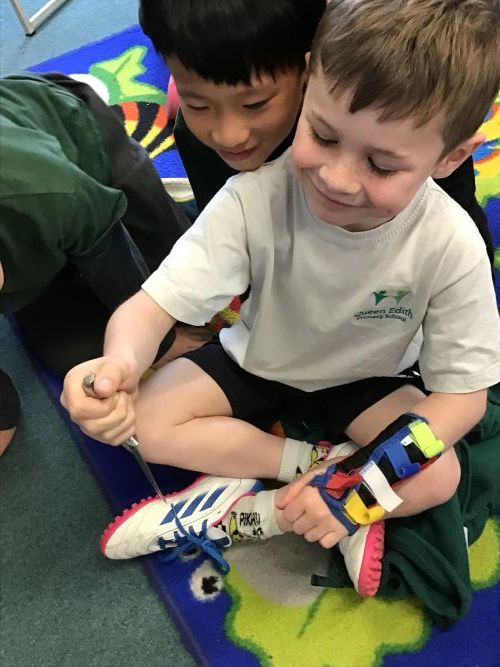
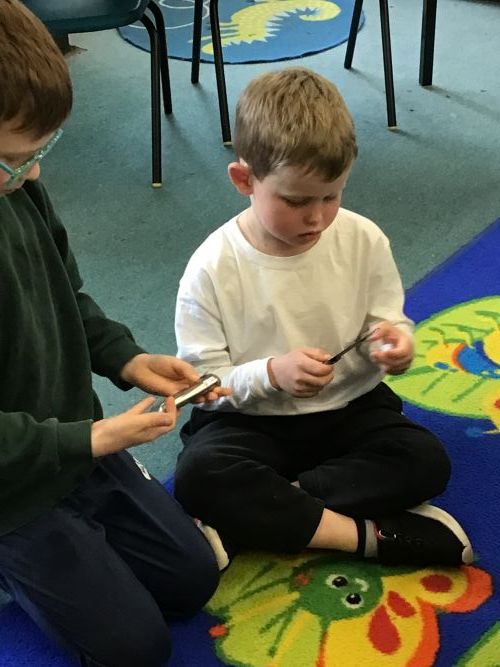
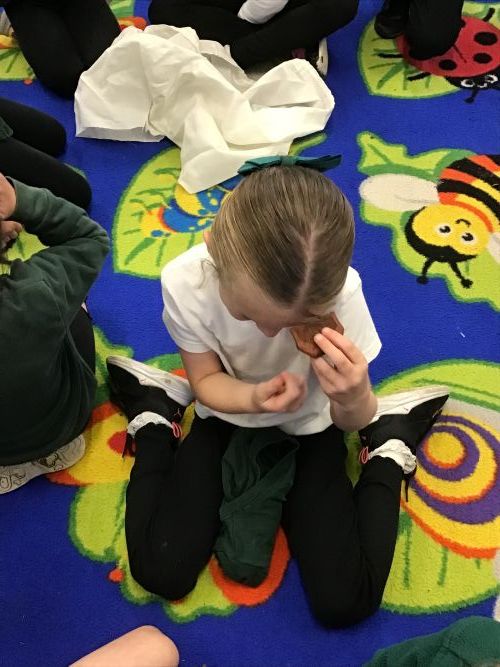
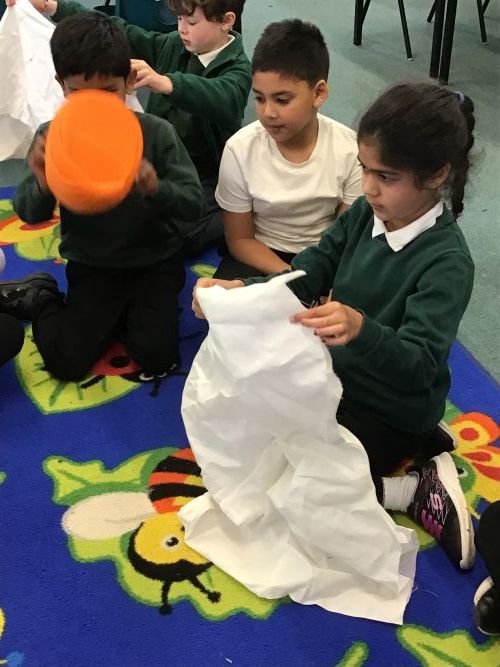
2024-2025 Spring Term
Year 4
The children in Year 4 enjoyed a visit to a local church, which provided a valuable opportunity to enhance their learning. The trip allowed the children to explore the history, architecture and cultural significance of the church, linking to their learning in RE. By observing the church's features and learning about its role in the community, the children gained a deeper understanding of different beliefs and traditions. This visit supported their development of respect for diversity and provided a hands-on experience that complemented their classroom learning, helping to bring their studies to life.
Nursery
Children in Bumblebee class have enjoyed learning about the Lunar New Year. They have made decorations, shared stories and information books, used chopsticks to eat orange segments and watched a dragon dance. The children played drums and cymbals and took turns to take part in our own dragon dance at nursery. We were also very grateful to welcome one of our parents who came to talk to the children about their own Lunar New Year celebrations.
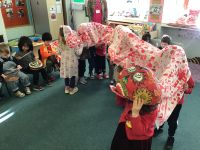
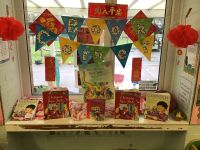
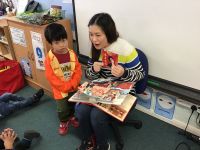
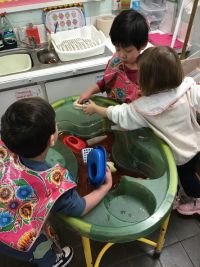
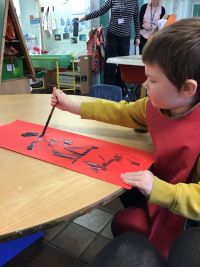
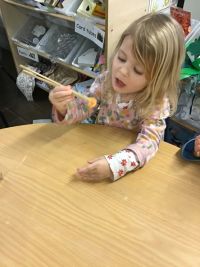
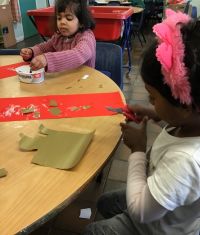
Reception
In early February Reception children learnt all about Lunar New year. We joined together to watch a short video about a little girl preparing for and celebrating Lunar New Year. The children were then able to choose from different activities in both the Reception classes. They enjoyed activities such as lantern and lucky banner making, using chopsticks, re-telling the story of the 12 animals race and dragon dancing! We all had a great morning!
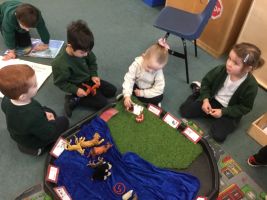
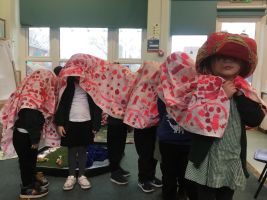
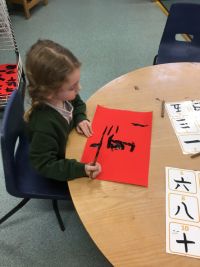
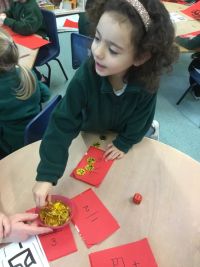
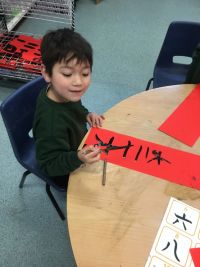
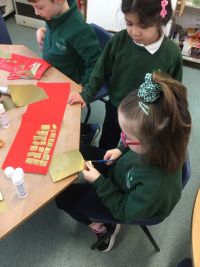
Year 1
In Year 1 we have been learning about Islam and thinking about the different things that Muslims believe in. We have enjoyed looking at a range of artefacts such as a Quran, prayer mats and compasses and thinking about how they are used in the daily lives of Muslims.
Year 2
In Year 2, the children have been exploring what is important to Jewish families. They enjoyed learning about the Torah scroll and discovering the significance of Jewish traditions. As part of their study of Hanukkah, they also had fun playing the dreidel game, deepening their understanding of the celebration and its cultural importance.
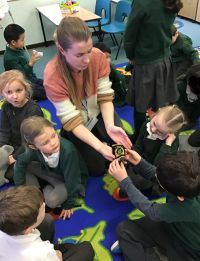
Year 6
Buddhism
Year 6 have been exploring the teachings of Buddhism, learning about how the religion was formed, and delving into the Four Noble Truths and the Eightfold Path. This study has sparked interesting discussions on big worldview questions, such as "Would you want to live forever?" To deepen their understanding, the children also tried mindfulness techniques and yoga, helping them connect with Buddhist practices in a personal and meaningful way.
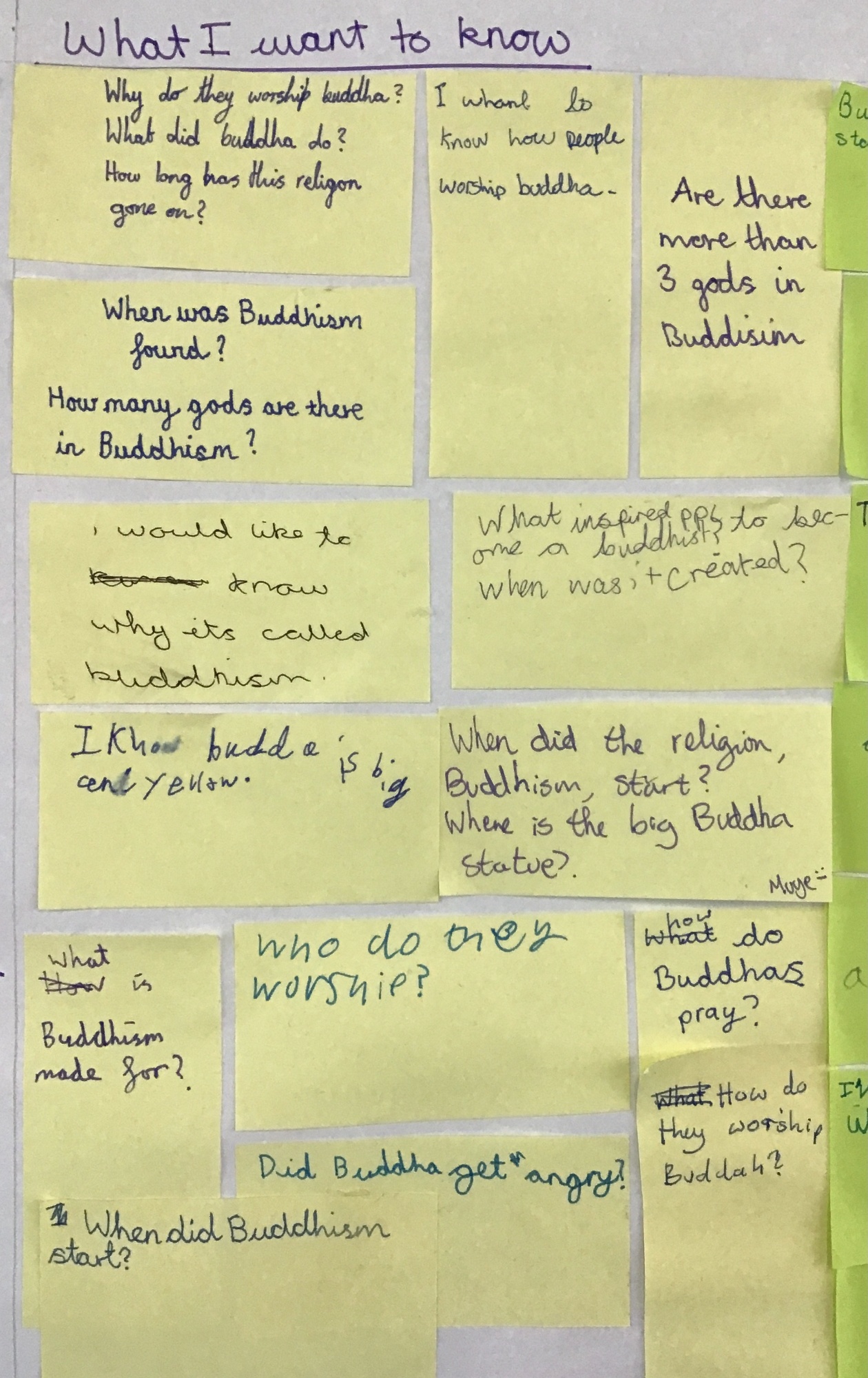
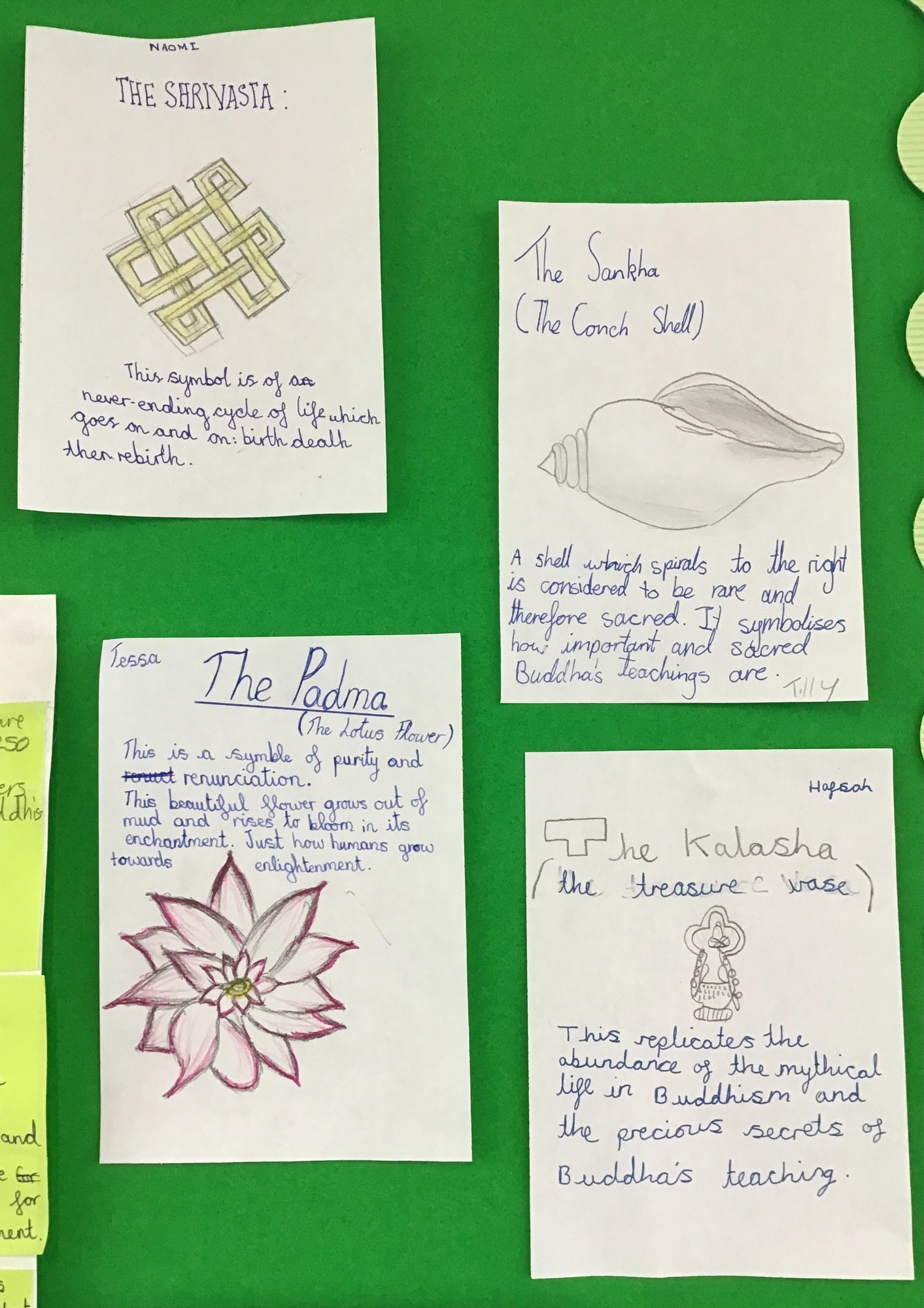
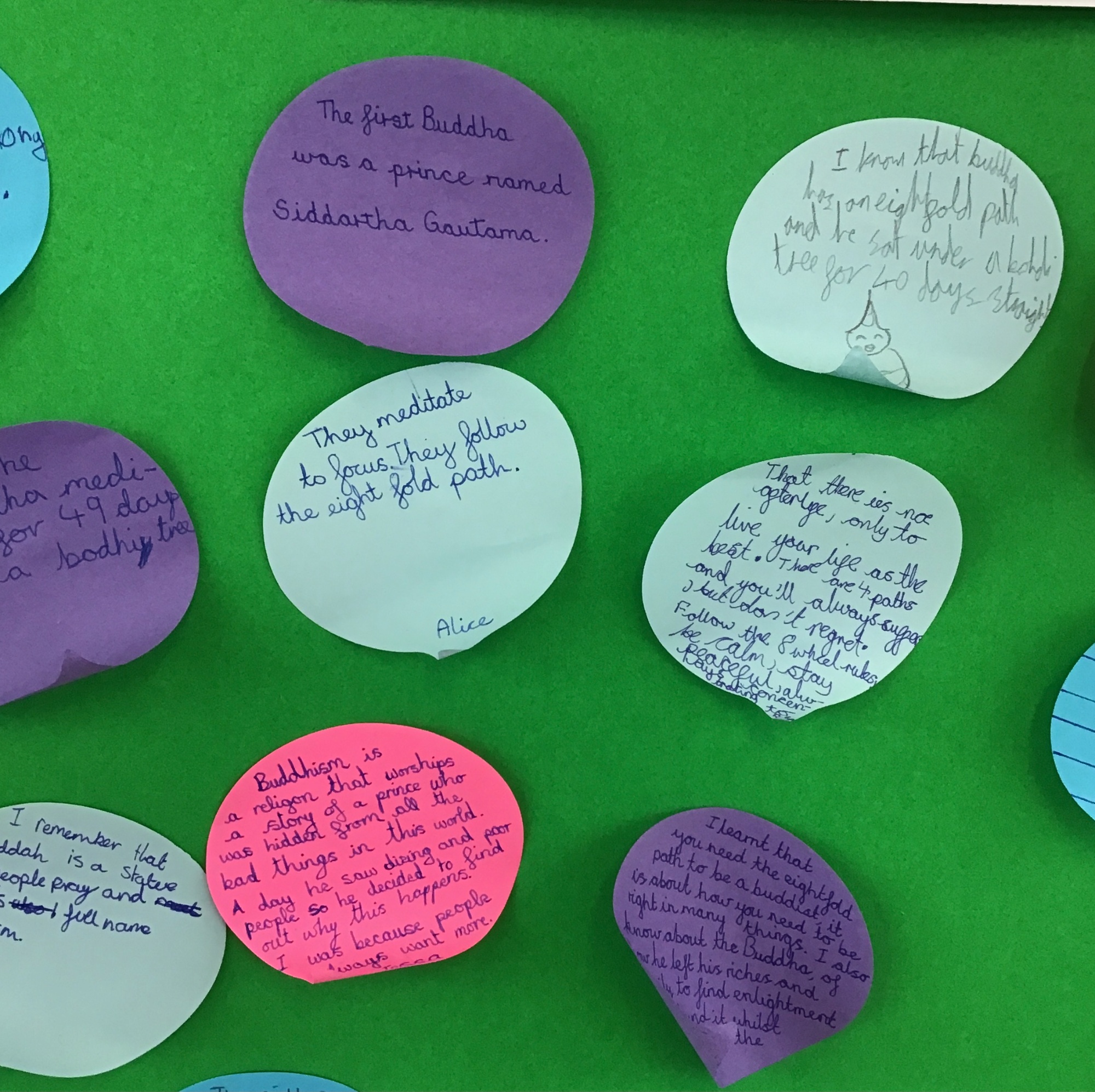
Reception
Reception children enjoyed learning all about Diwali.
They were able to choose from activities between both Reception classrooms such as clay Diva making, creating rangoli patterns both inside and out, learning songs and dances and designing careful Mehndi patterns.
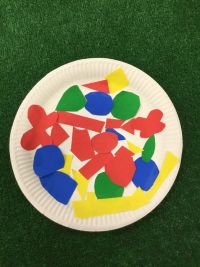
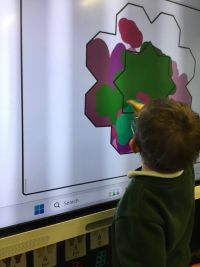
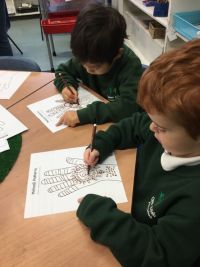
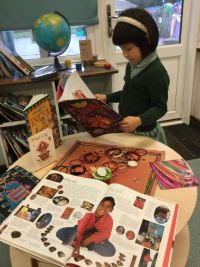
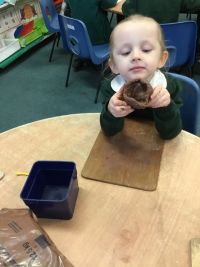
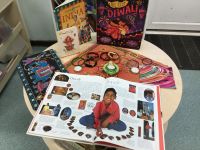
Year 2
In RE, we have started using floor books to record our learning. Floor books provide an interactive way for the children to share their ideas, reflections and questions. They allow us to capture group discussions, individual thoughts and creative responses, making the learning visible and collaborative. This approach encourages deeper thinking and helps the children take ownership of their learning journey. Here you can see some examples of pages from our floor books, ranging from Year 1 to Year 6.
This half-term, the children enjoyed two special visits during assembly. Reverend Hawkins from St. James’ Church shared a heartwarming story about kindness and the joy of giving, encouraging the children to reflect on the importance of helping others. Our friends from GenR8 also visited, reminding the children about the Christian significance of Christmas. They spoke about the need to pause and make room in their hearts for Jesus, especially during a season that can often feel busy with other festivities. These meaningful assemblies helped the children focus on the true spirit of Christmas.
As part of their exploration into the question, 'Why do Christians Trust and Follow Jesus?', the Y2 classes welcomed The Reverend Hawkins from St James' Church. During his visit, he shared insights about his faith and his own trust and belief in Jesus. The children listened carefully and asked some excellent questions, demonstrating both their curiosity and their understanding of this topic.
In Year 2, the children have been exploring the question, “Why do Christians trust and follow Jesus?” They listened to the story of Jesus calling the fishermen to be his disciples. In the story, Jesus saw Simon Peter and Andrew fishing and invited them to follow him, saying he would make them “fishers of men.” They immediately left their nets to follow him. The children discussed why the fishermen might have trusted and followed Jesus and had fun acting out the story together. This helped them understand how important Jesus is to Christians and why people choose to follow him.
2023-2024 Summer Term
Year 1
In Year 1, we have enjoyed learning about how babies are celebrated in different faiths and religions. As part of our topic, we visited Queen Edith Chapel to learn about how babies are welcomed in Christianity.
Year 6
In Year 6, the children learnt about Buddhism, including the life story of Buddha, the Eightfold Path, the Three Jewels and the purpose of meditation. This comprehensive study provided them with insights into Buddhist teachings and practices, enriching their understanding of this peaceful and reflective religion.
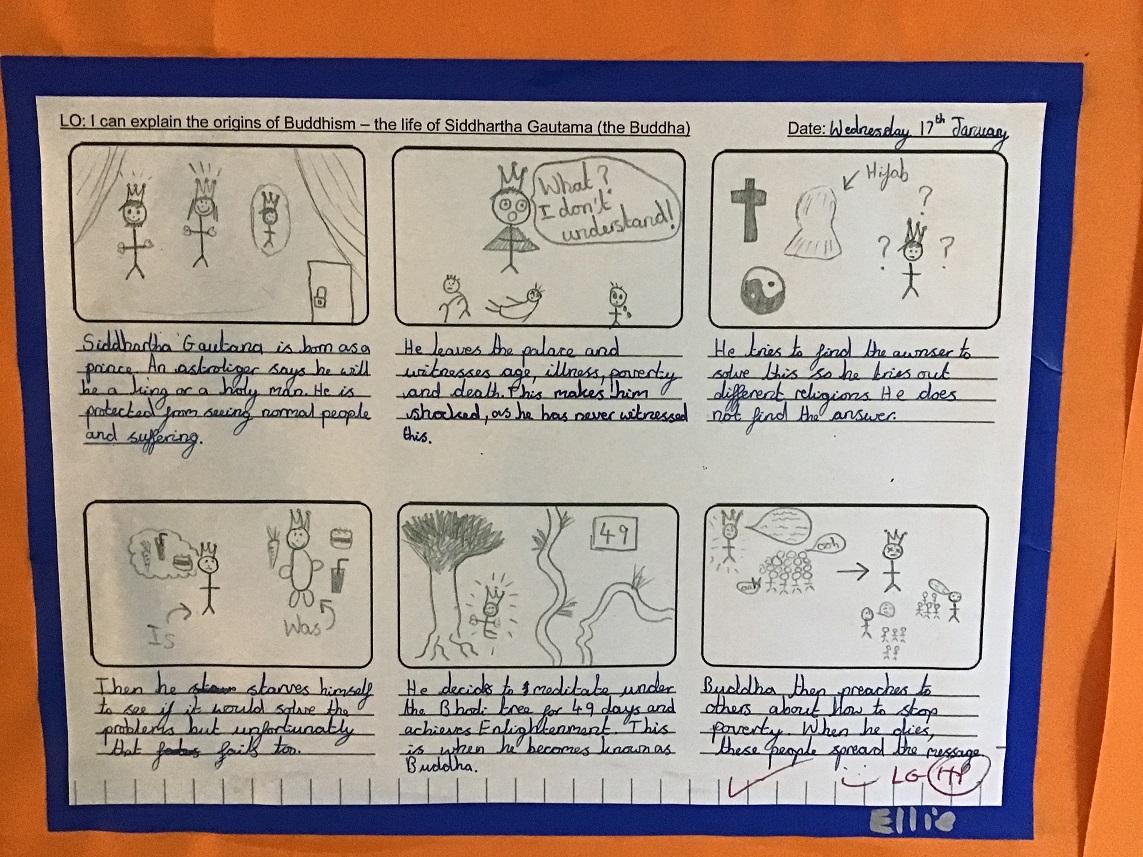
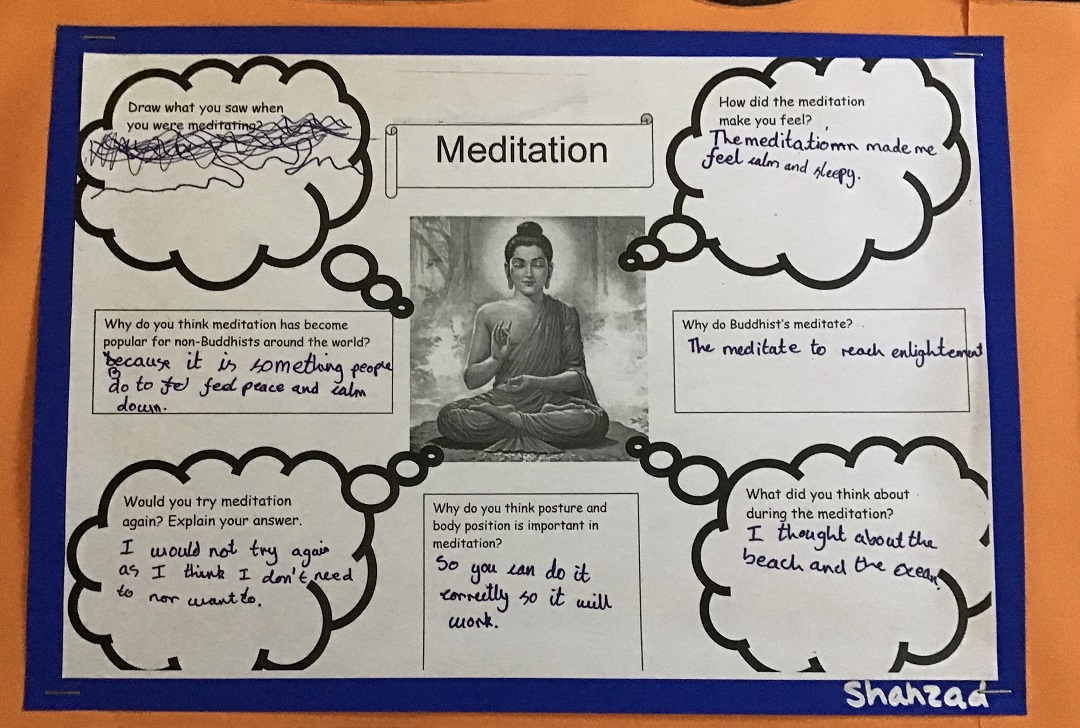
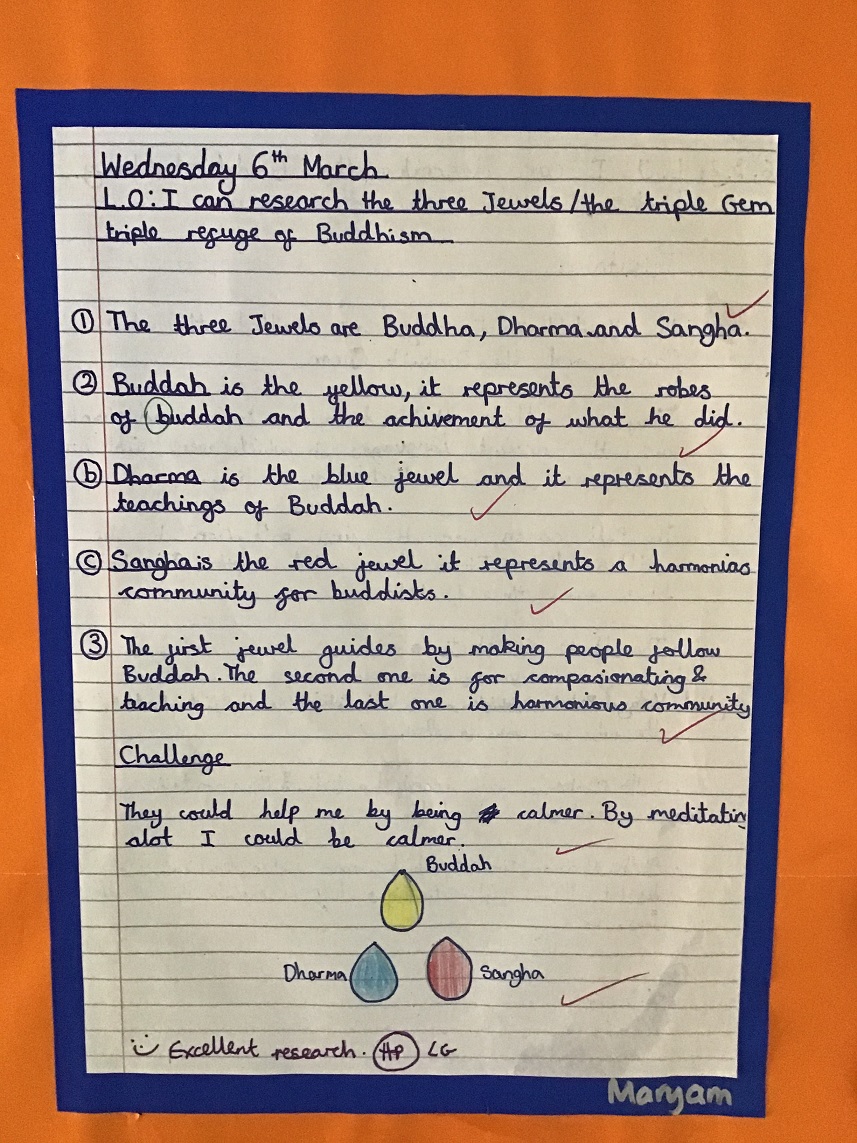
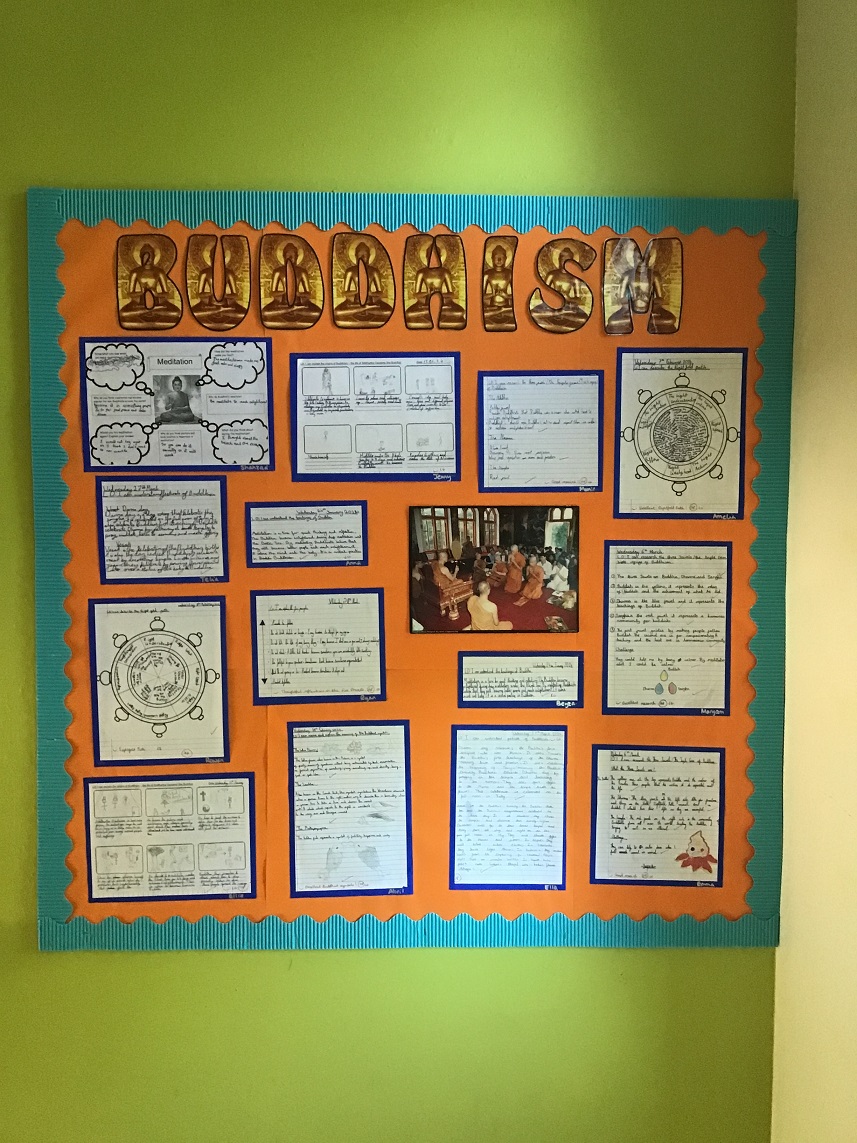
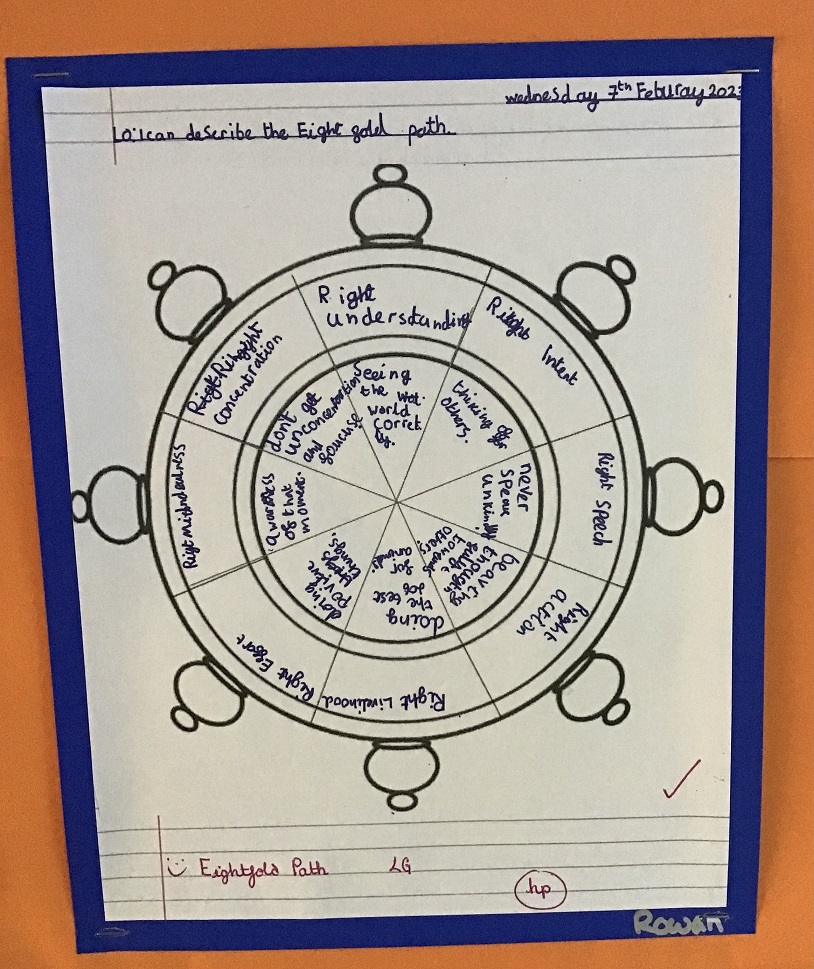
Year 2
Quiet Time with St Barnabas Church
The children enjoyed some quiet time activities with our friends from St Barnabas Church. Through a range of thoughtful and reflective activities, the children had the opportunity to pause, think and connect with their inner selves. This calming experience allowed them to practice mindfulness and appreciate the importance of quiet reflection in their busy lives.
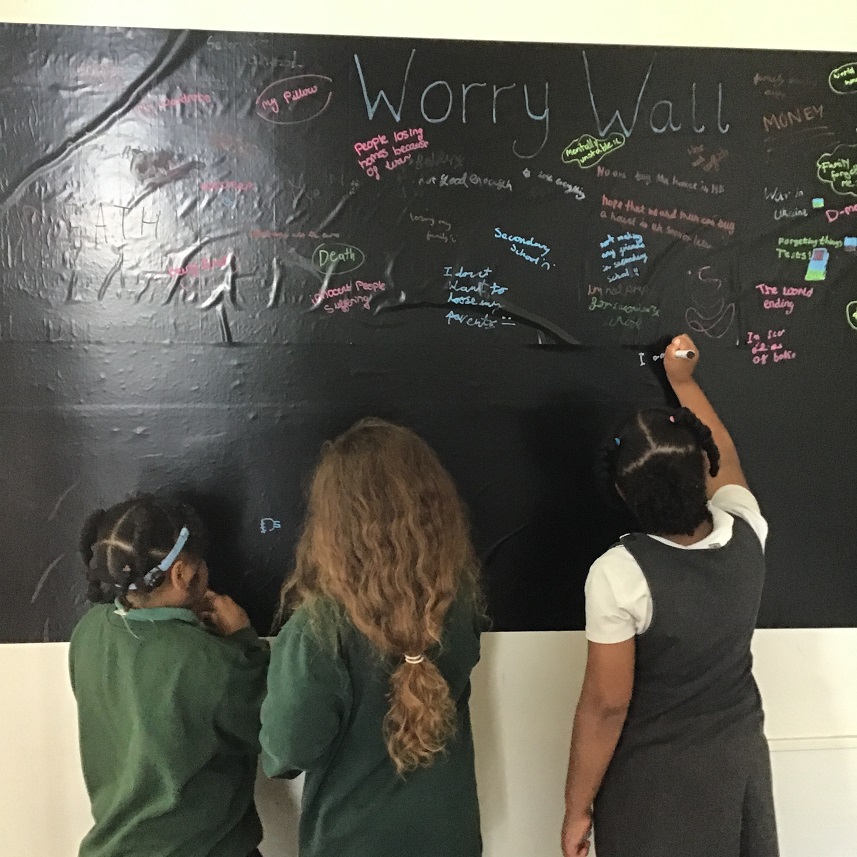
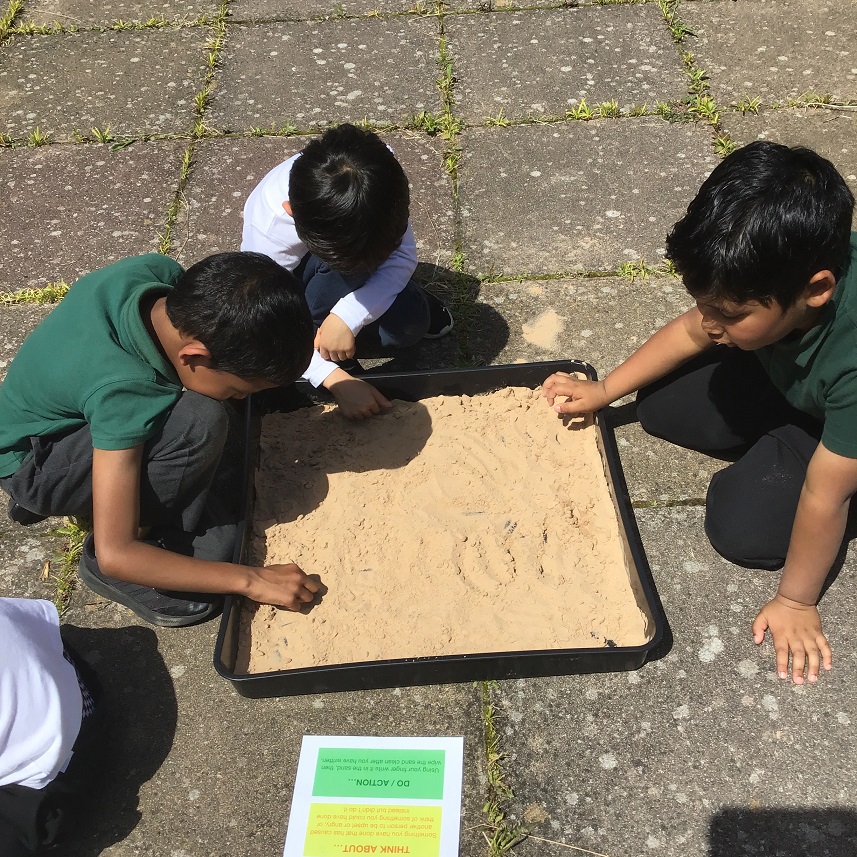
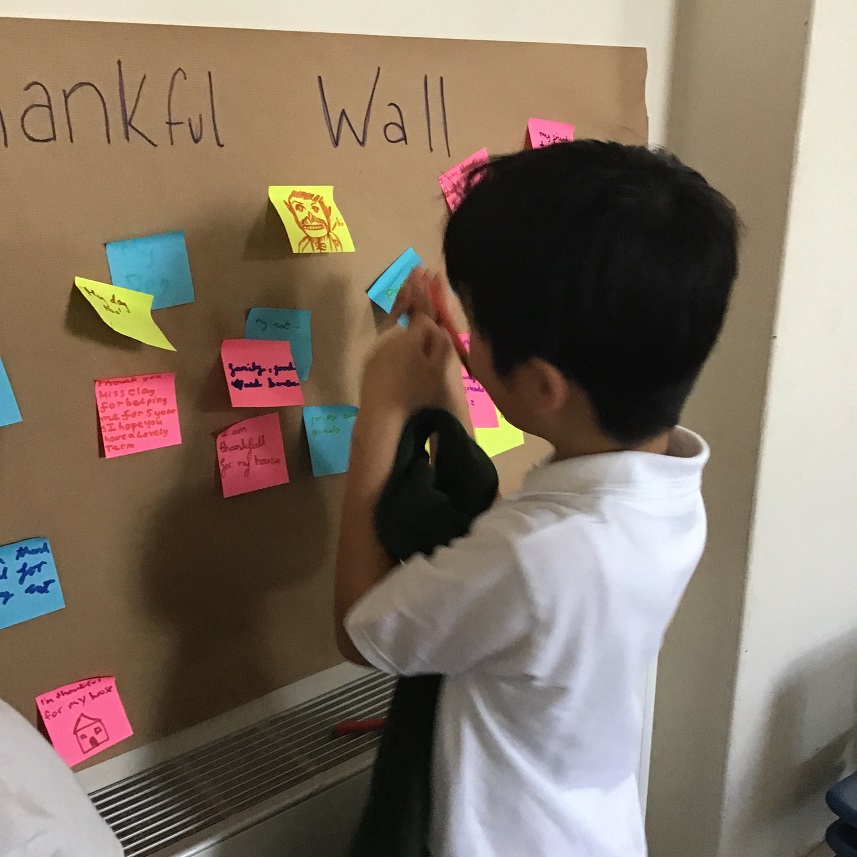
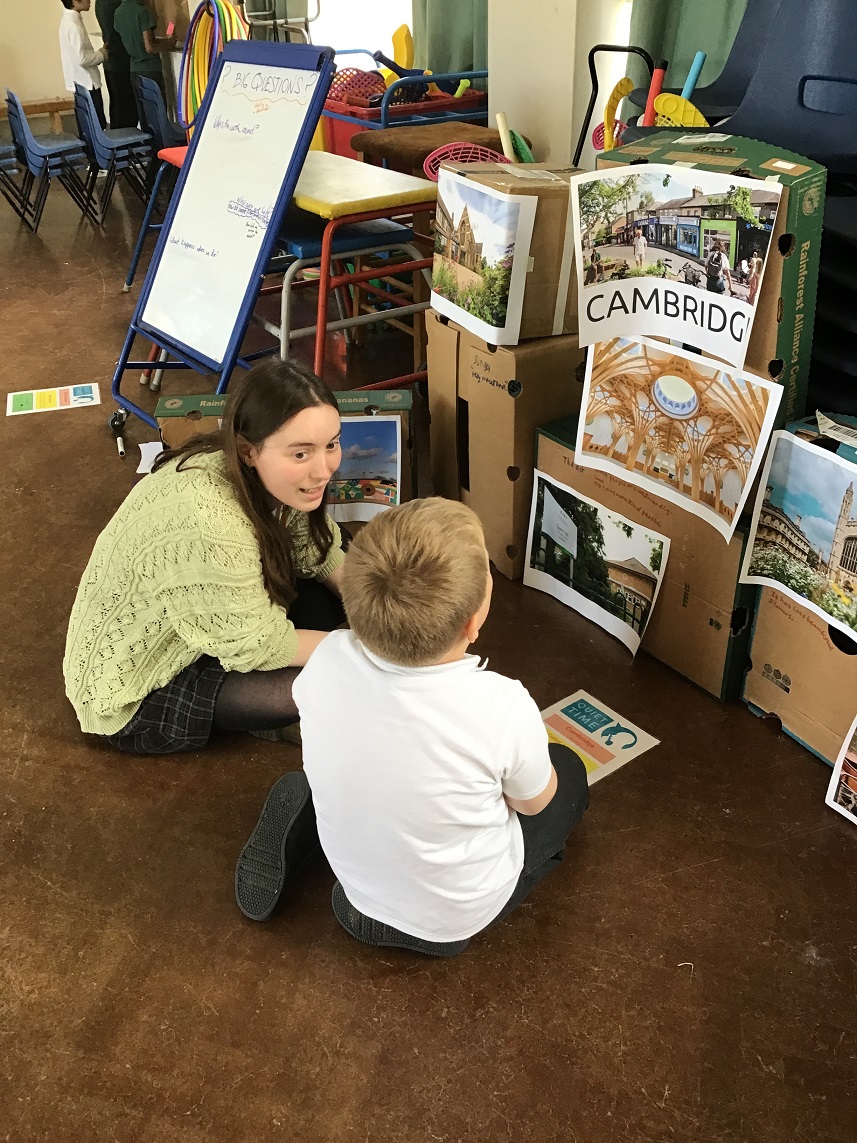
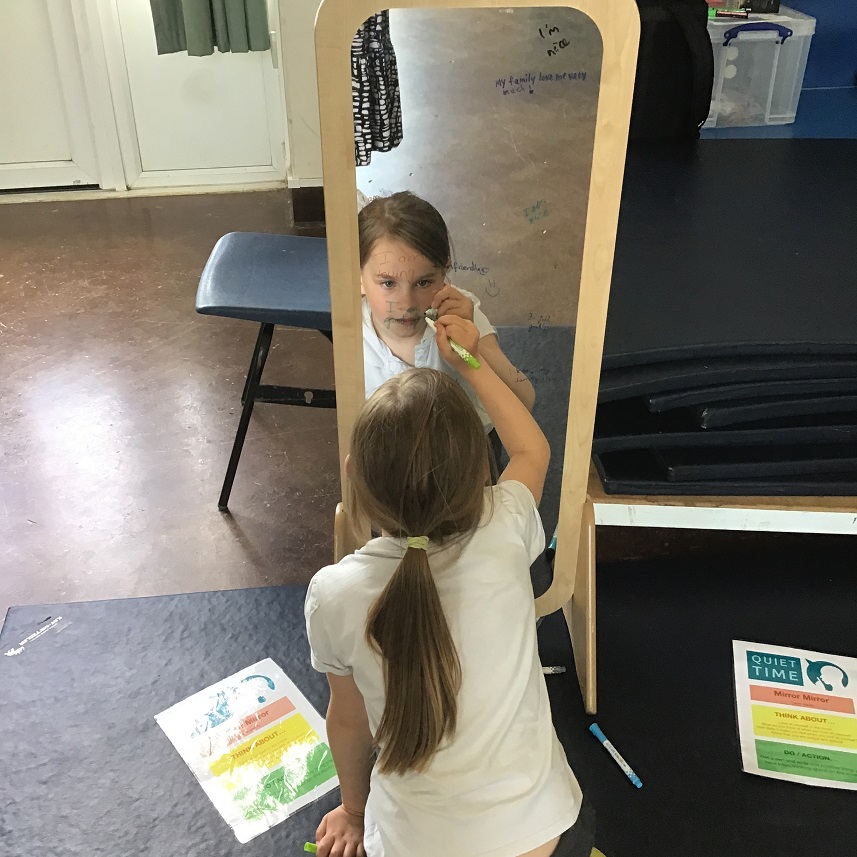
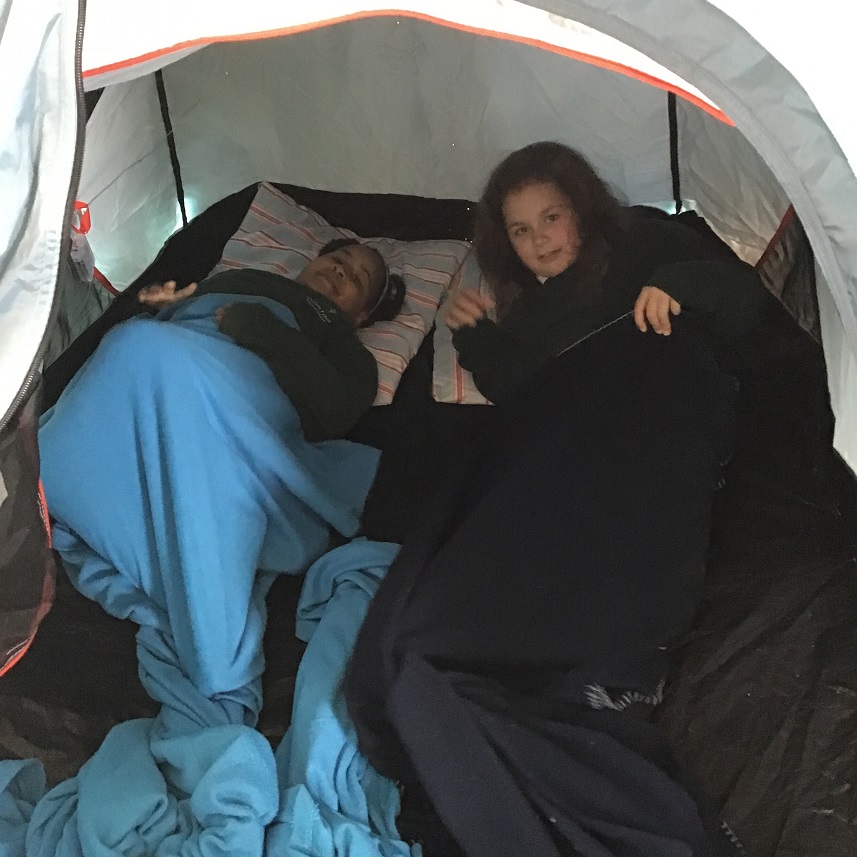
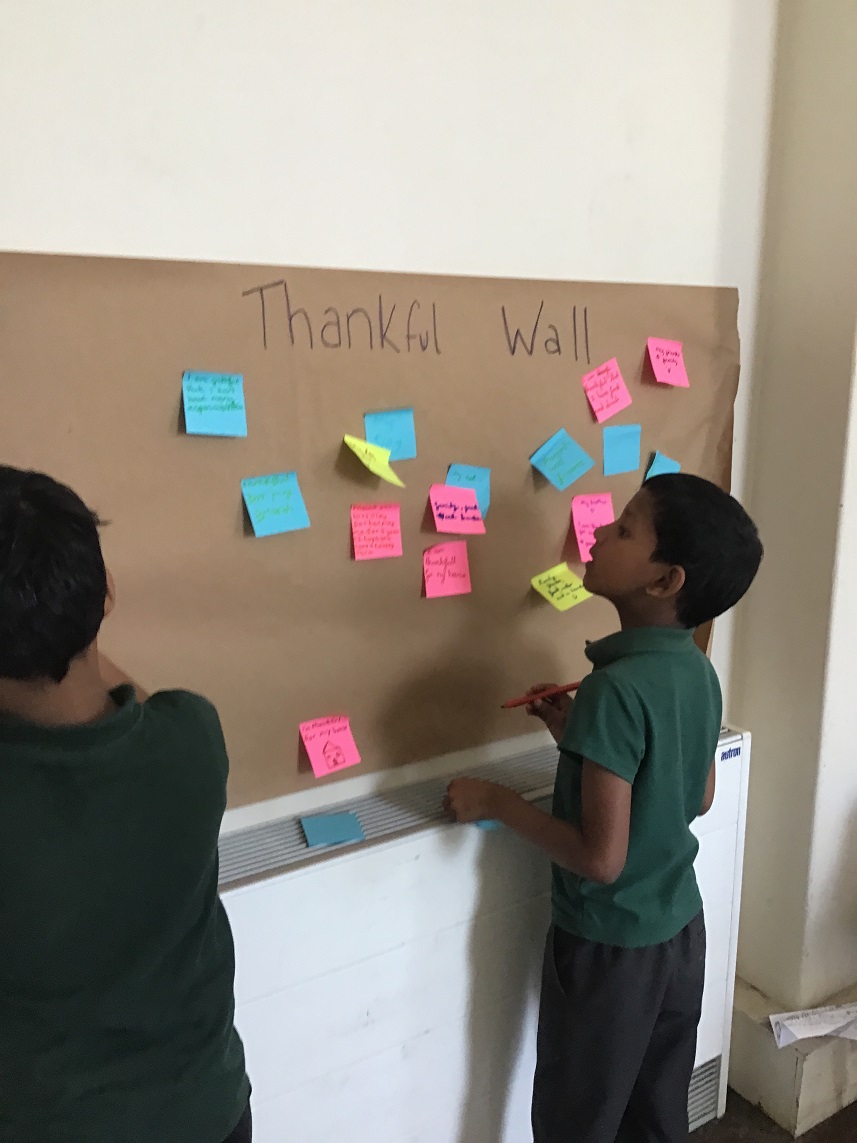
This term, Year 2 explored the question, “How and why do people show they are thankful?” The children delved into various traditions and celebrations, including Harvest Festival, Sukkot, Thanksgiving, Zakat in Islam and the Sikh act of Seva. The children discussed what they are thankful for and learned about giving and selfless service. A highlight was our natural world scavenger hunt, where the children found items they are grateful for in nature. This enriching experience broadened their understanding of gratitude across different cultures and beliefs.
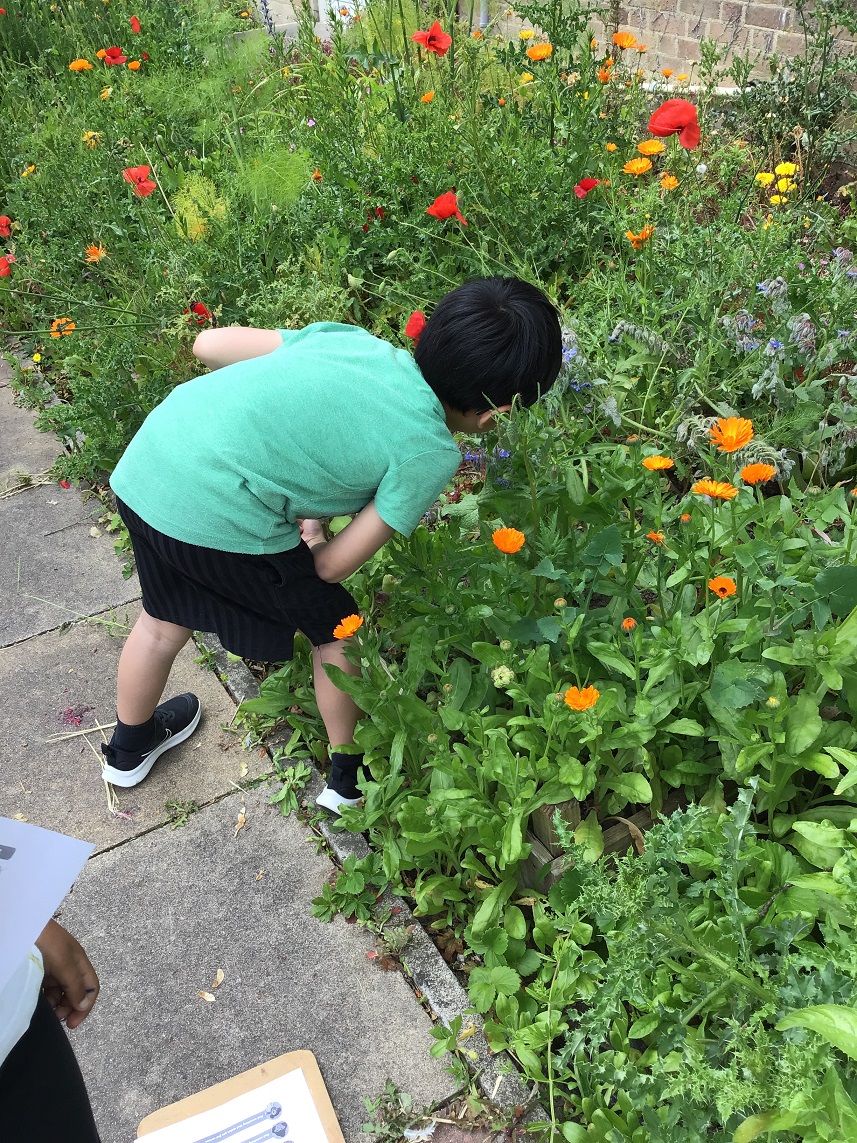
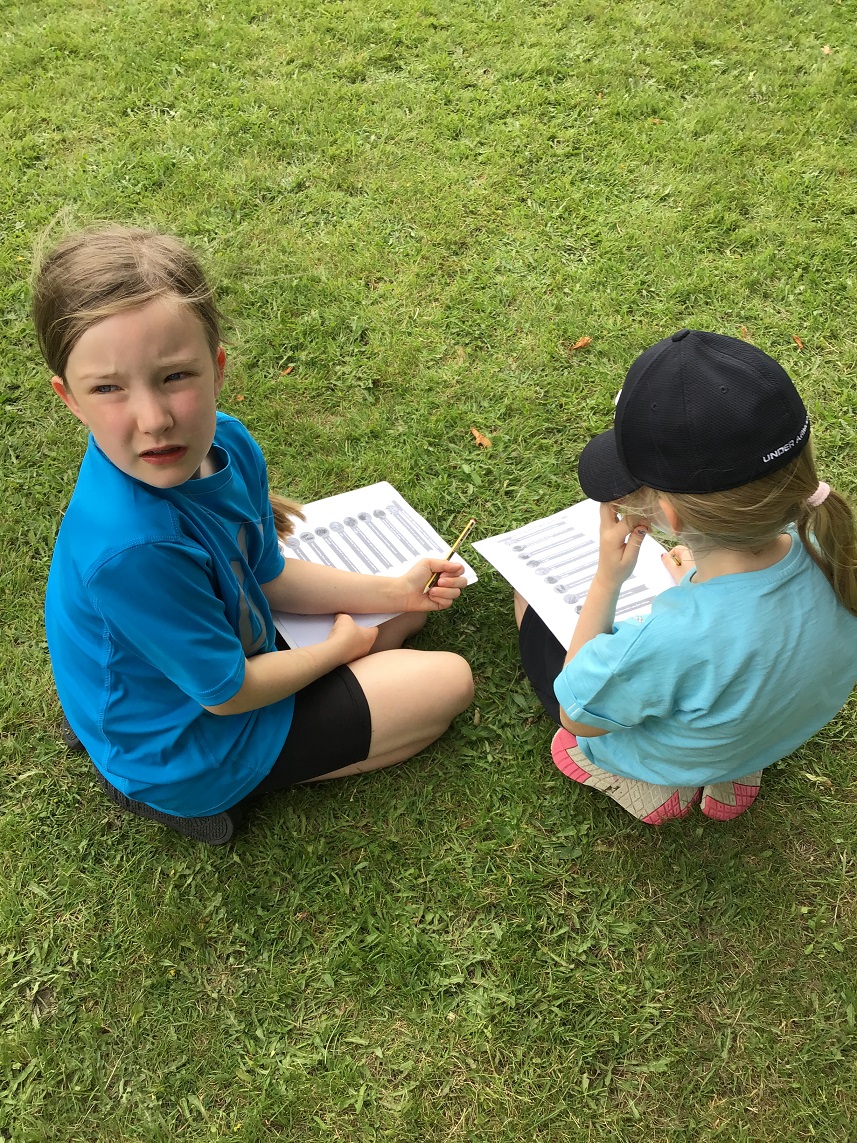
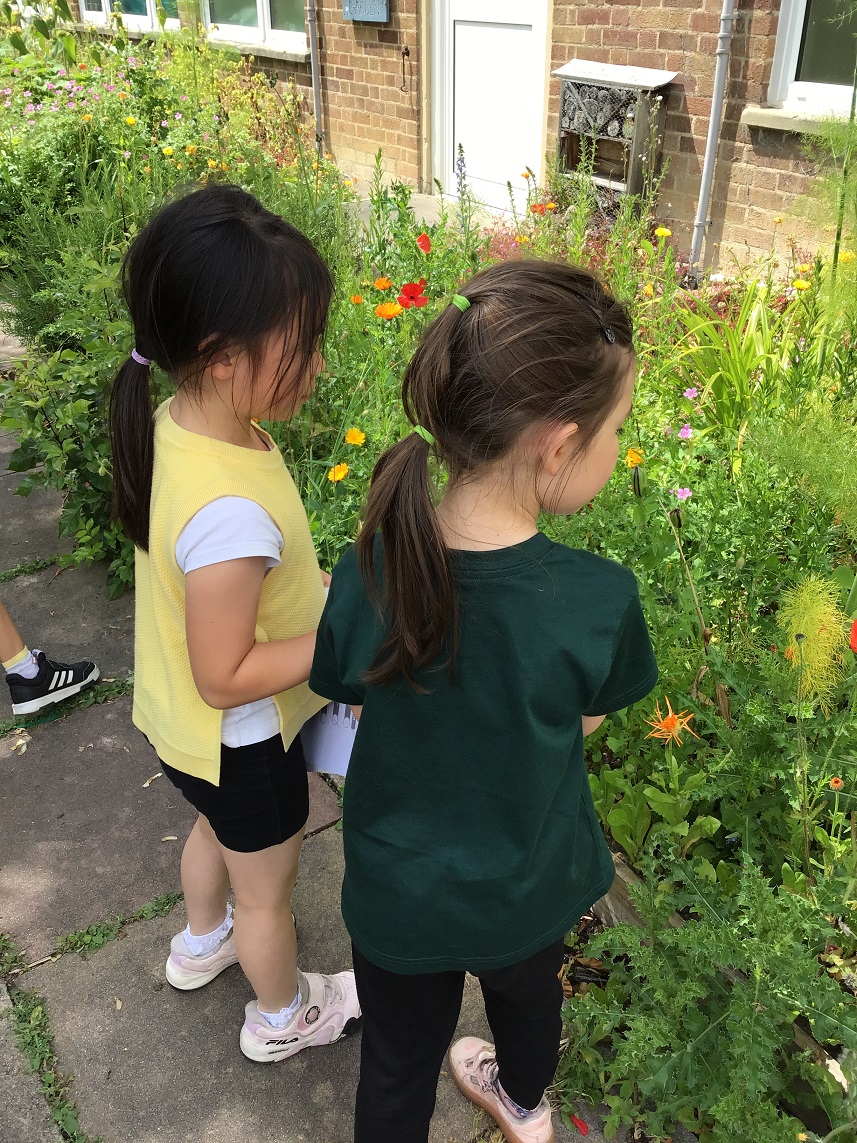
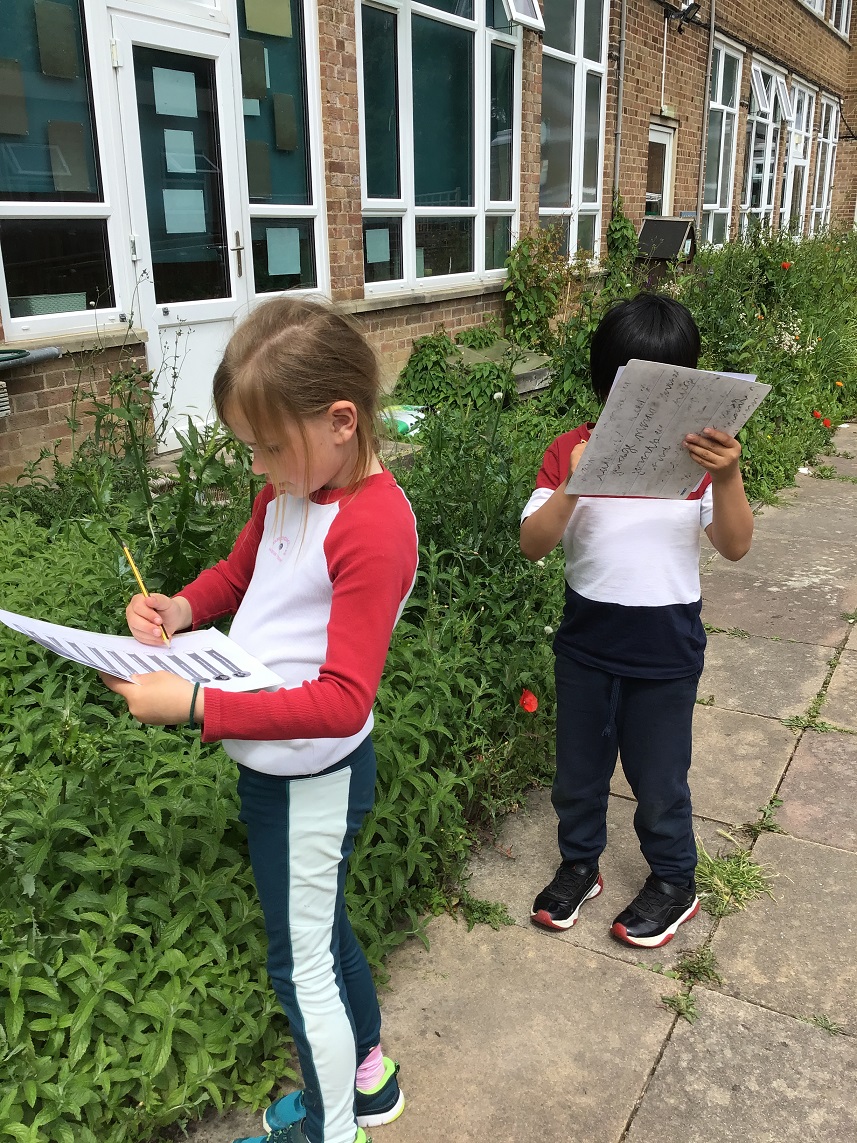
Our friends from GeneR8 led a whole school assembly, teaching the importance of respecting each other.
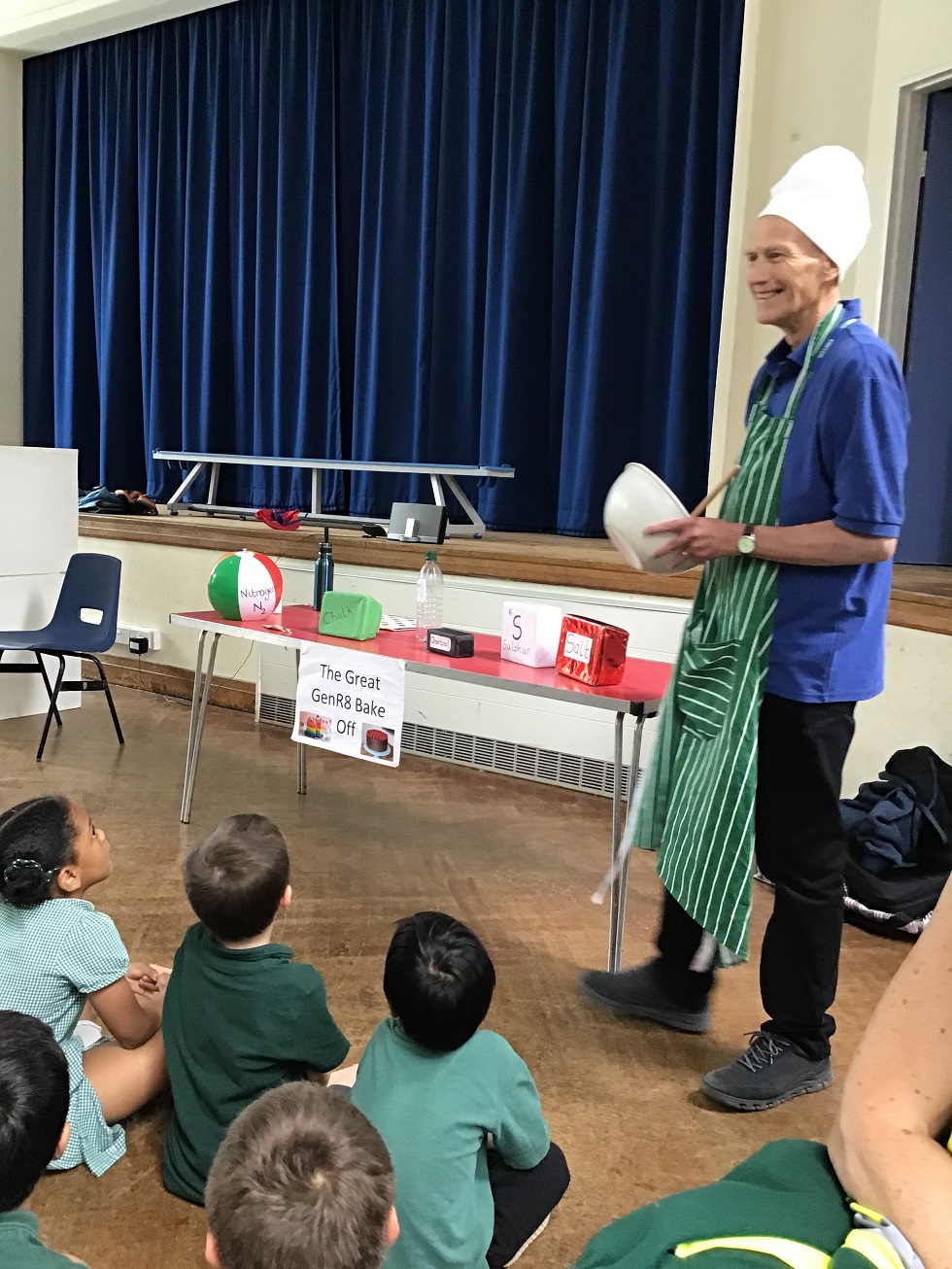
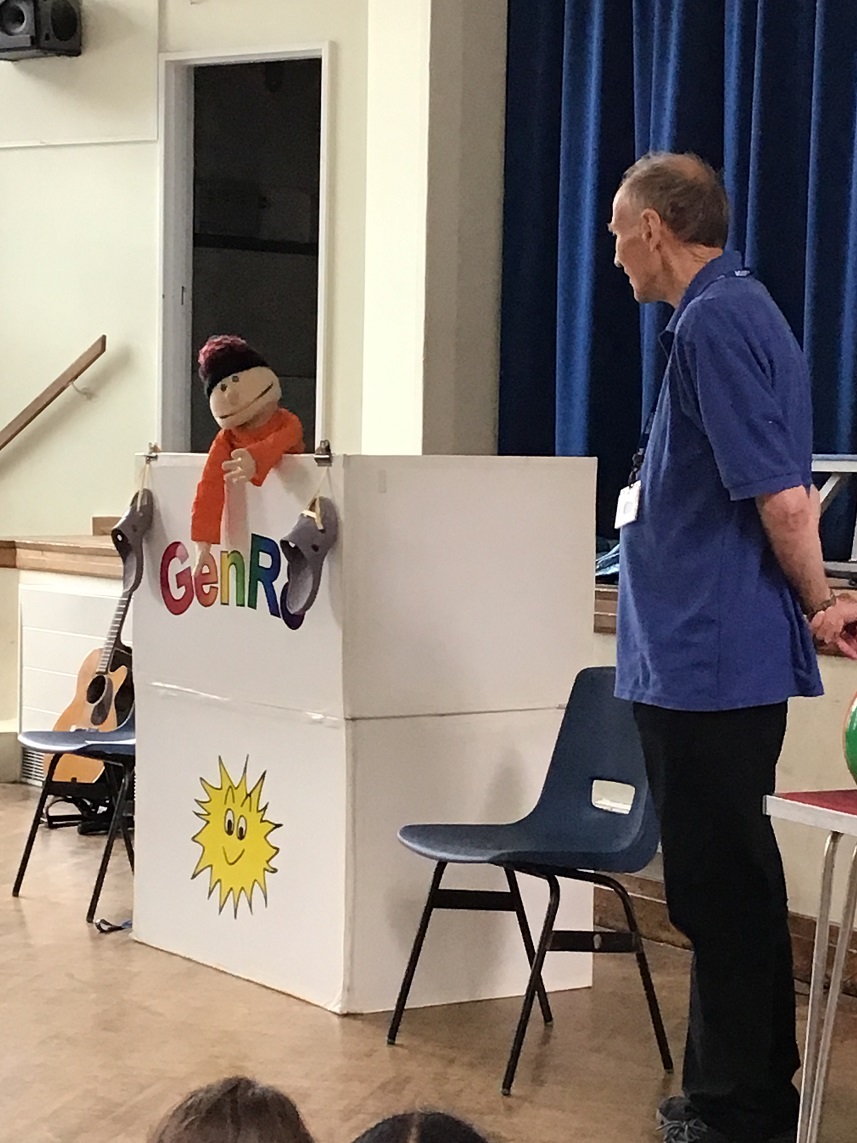
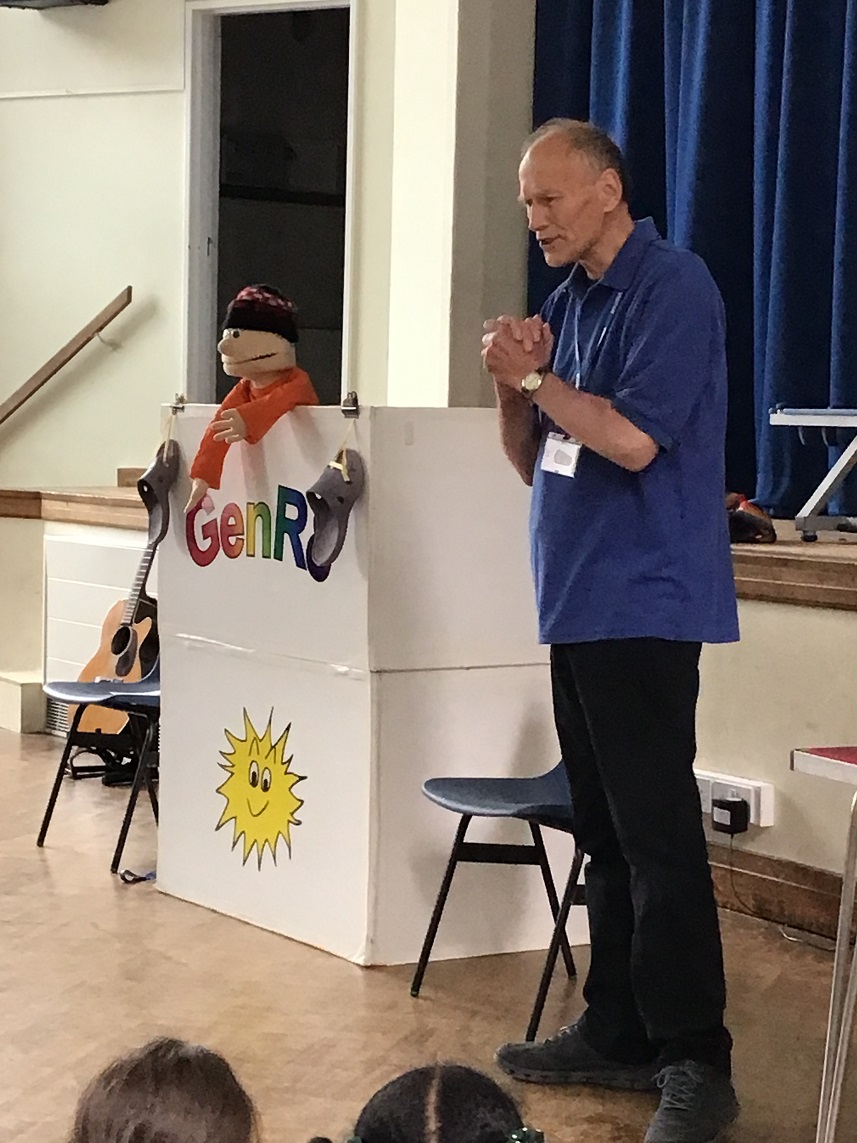
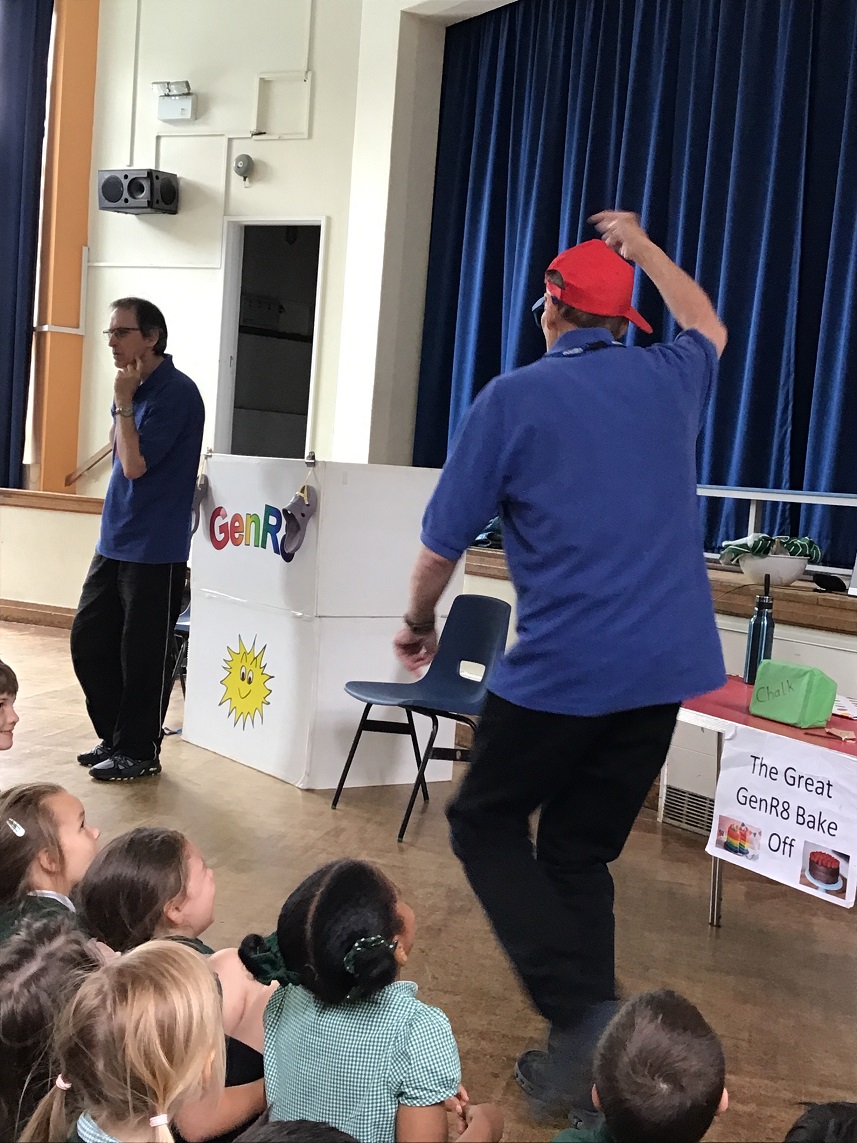
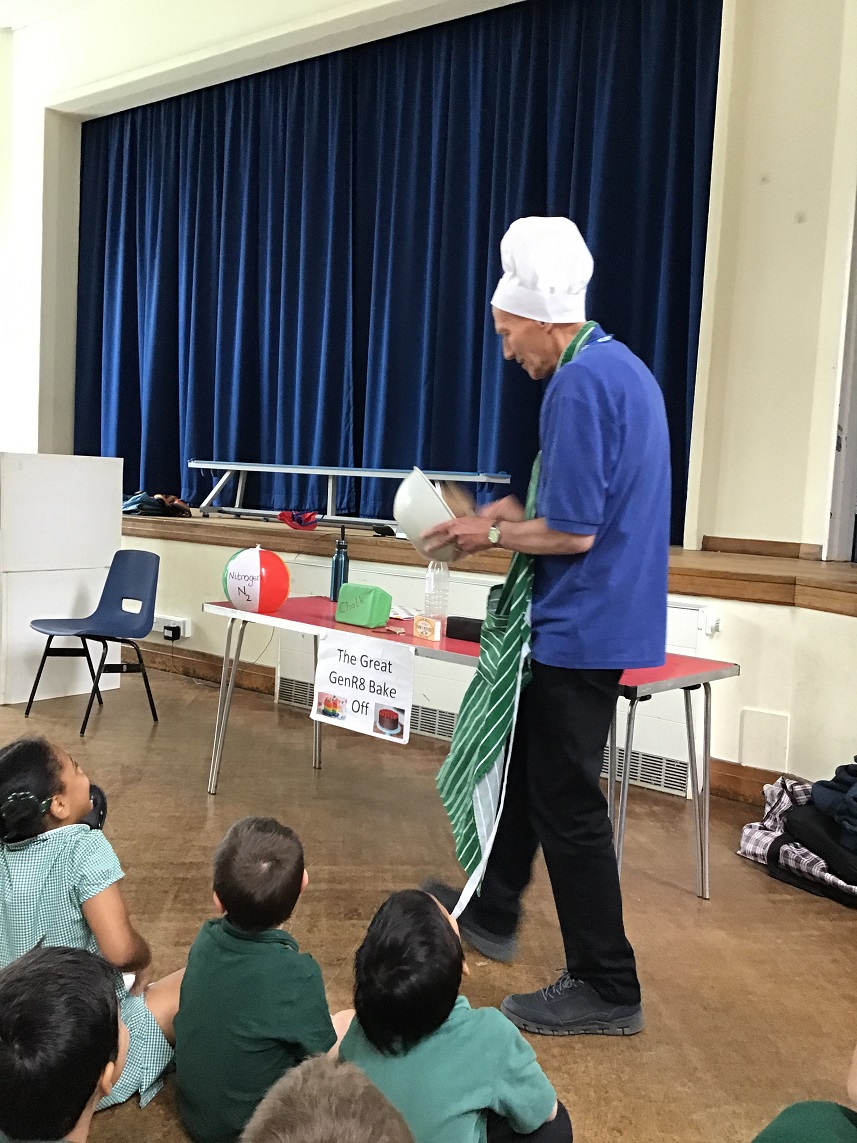
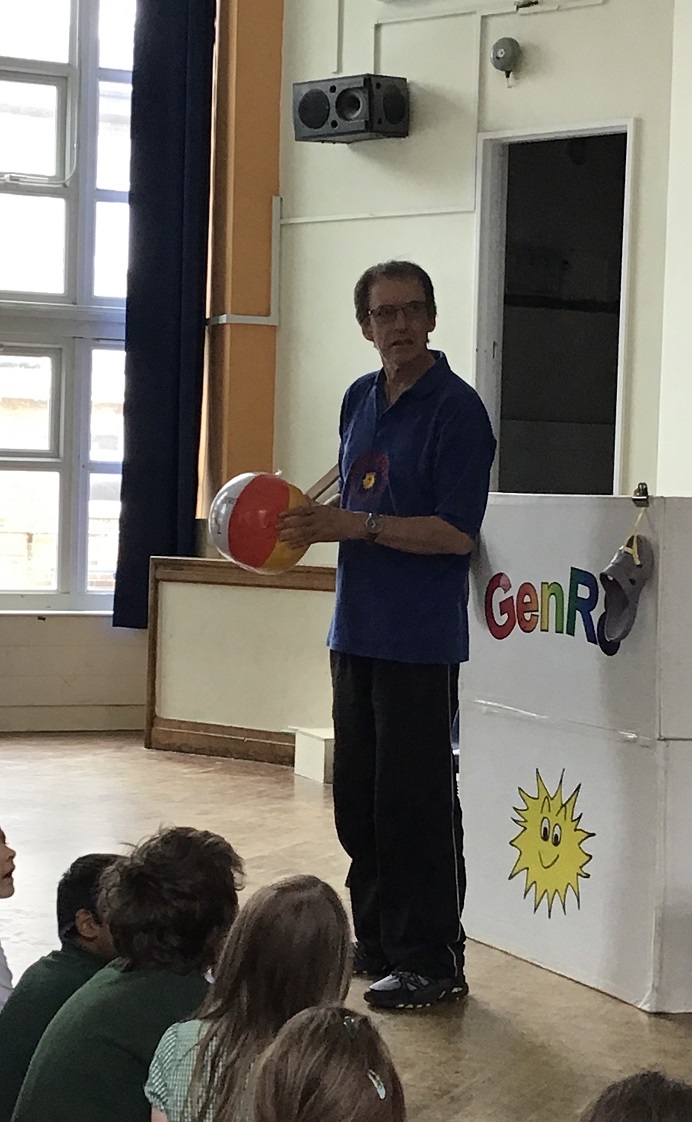
Reception
Reception had a great morning learning all about Eid. The children found out how some of our friends had celebrated and enjoyed activities across both classes such as making cards, salt dough stars and a mosque building.
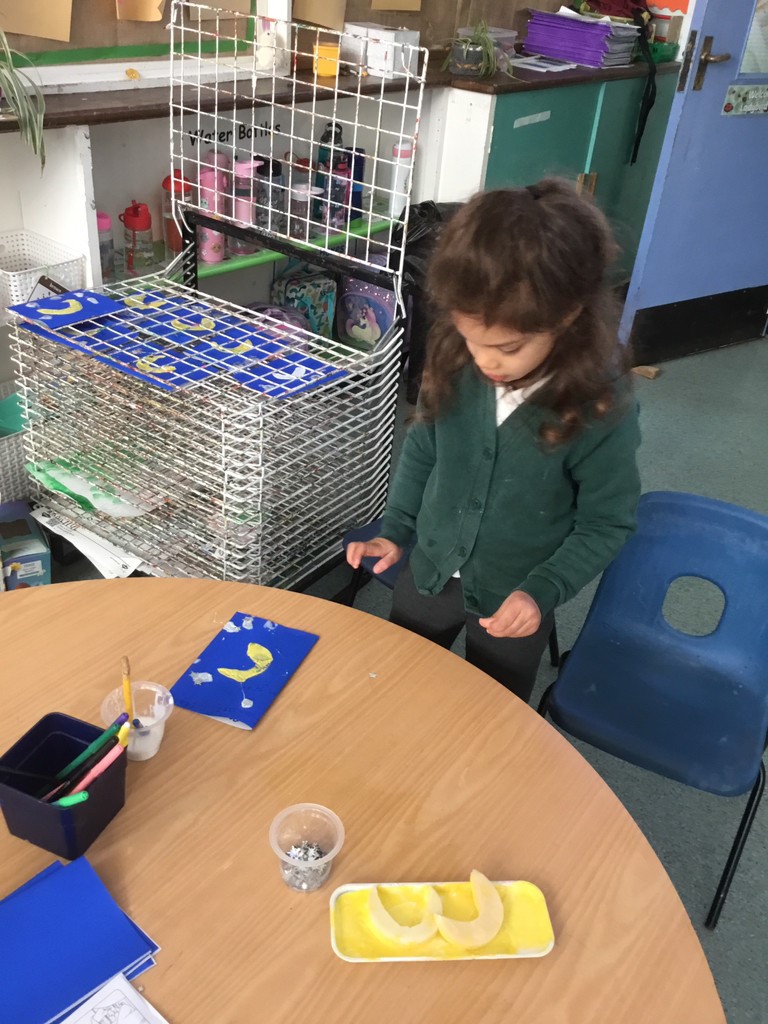
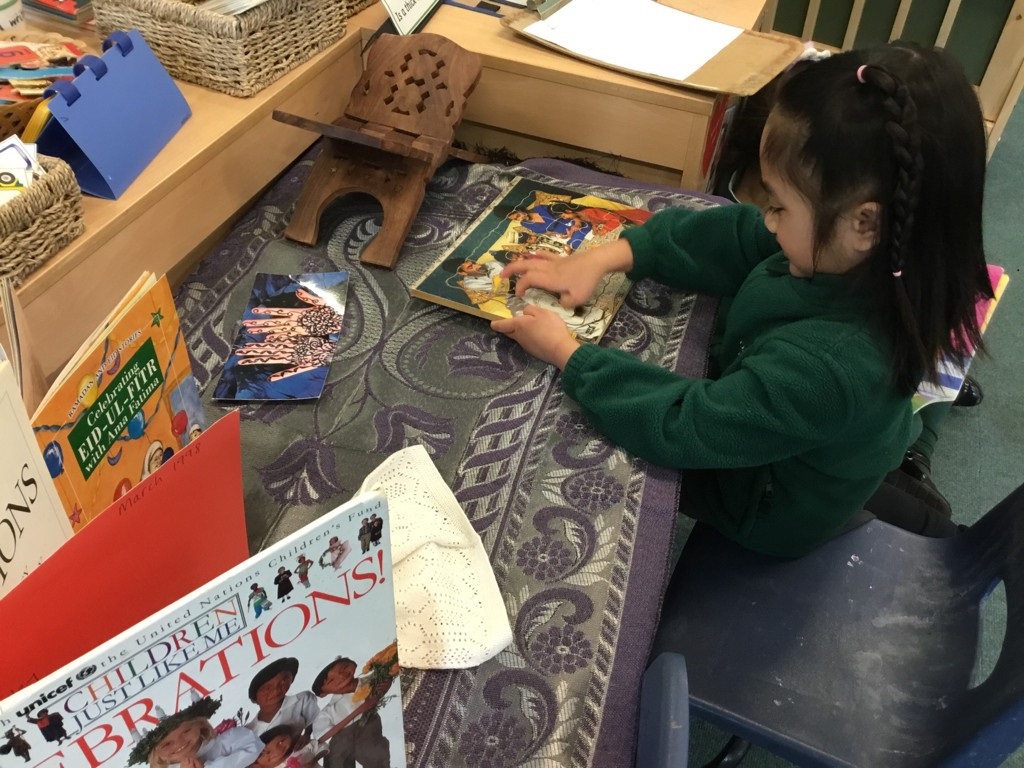
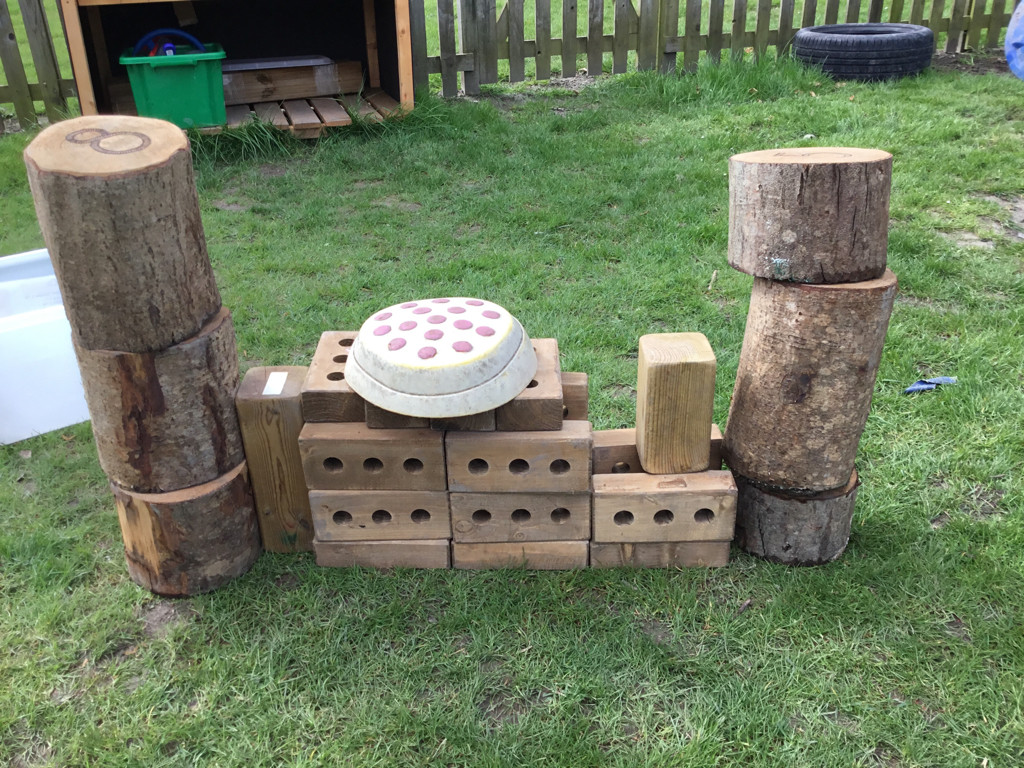
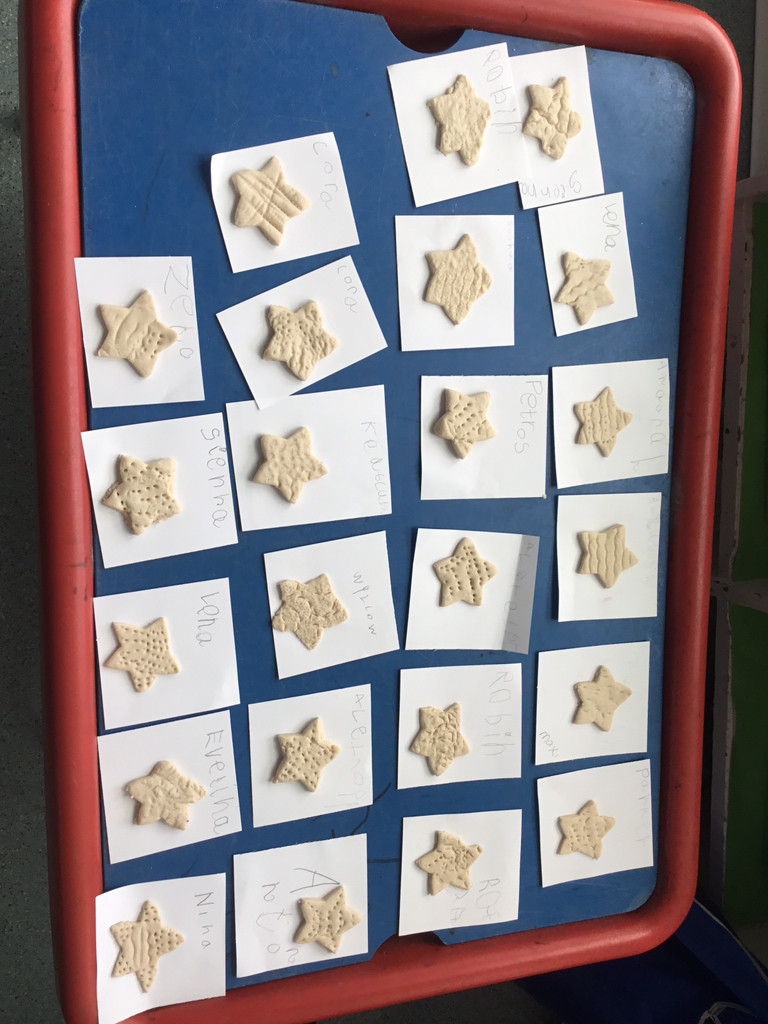
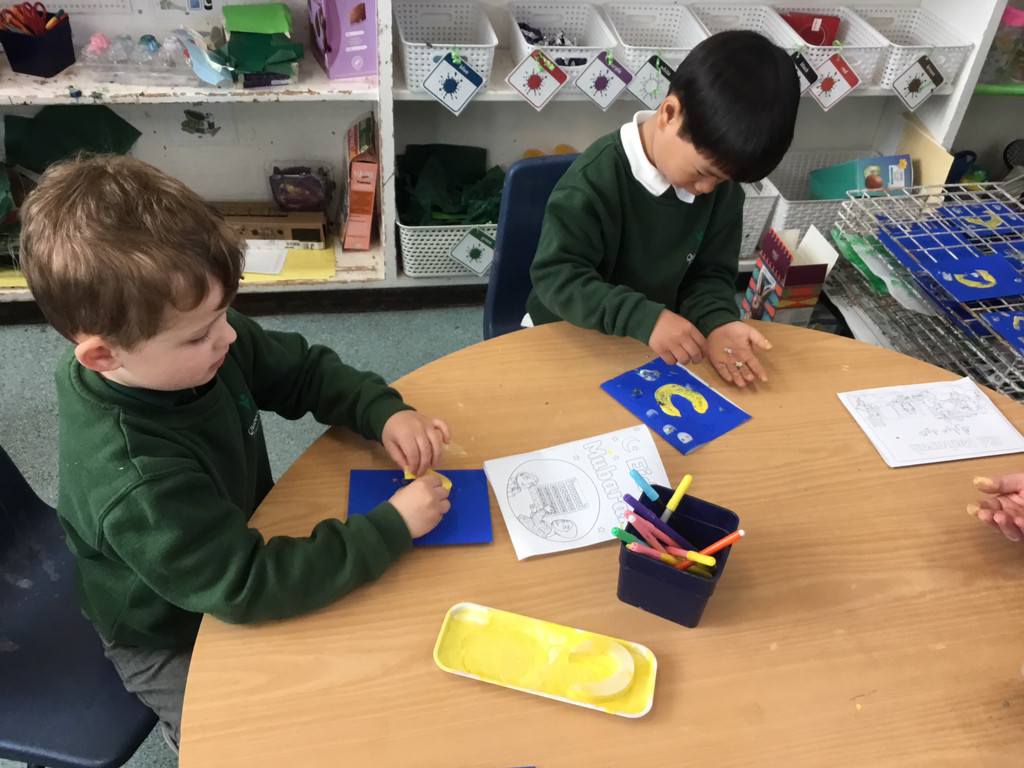
Spring Term 2024
Year 4
Year 4 had a great time visiting Cambridge Central Mosque. We found out about how the Mosque was built to give back to the local community by including lots of green spaces to encourage local wildlife. They also built in Swift houses to revitalize the local swift population.
Reception
Reception celebrated Lunar New Year with a range of activities across both classes ending the session with a Dragon dance.
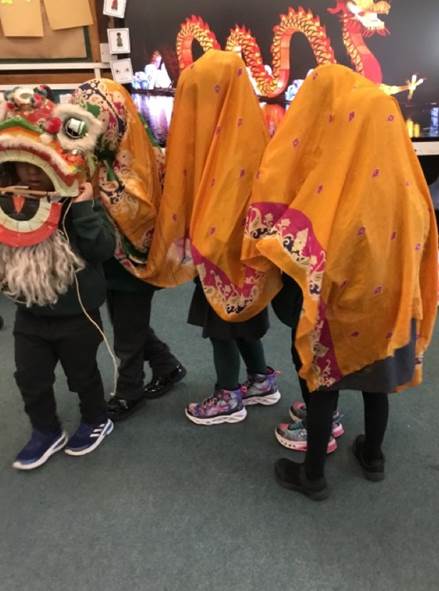
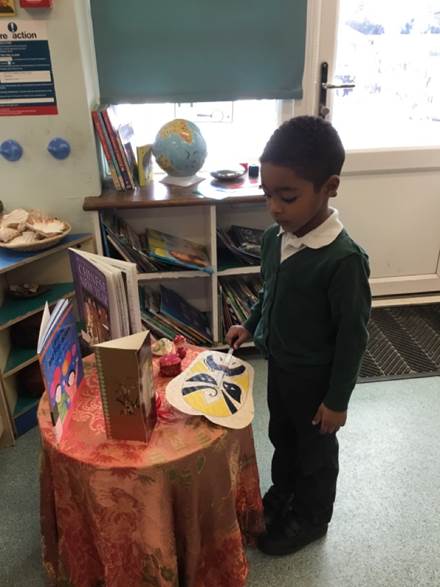
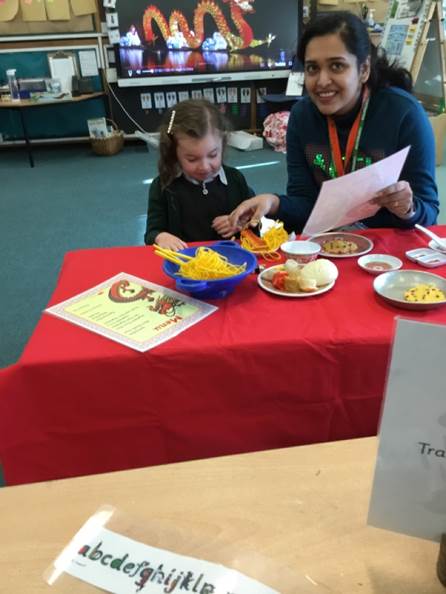
Year 5
In Year 5, the children learnt about the story of Moses and how he led the Jewish people to their promised land after receiving the Ten Commandments.
Year 2
In RE, the children learnt that the place of worship in Judaism is called a synagogue. They found out that the Jewish Torah scroll is housed in a special cupboard called an Ark within the synagogue. The Torah scroll is a long as a football pitch and is written by hand. It is written in Hebrew. The children tried writing in Hebrew by copying the alphabet.
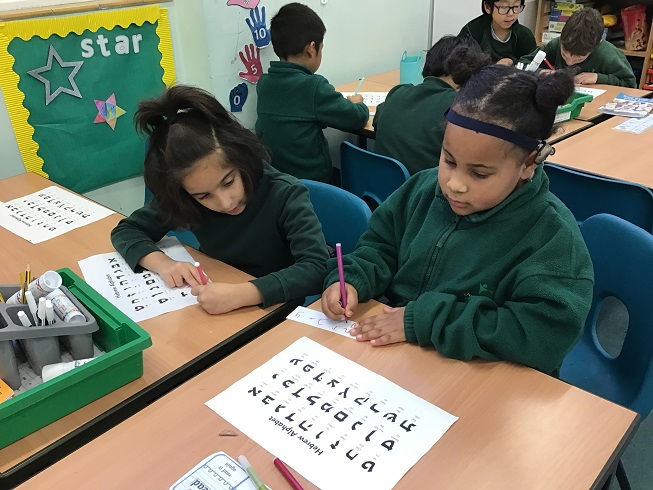
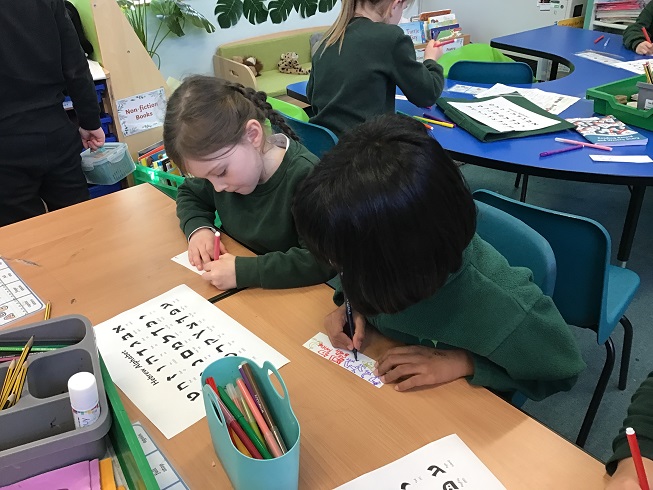
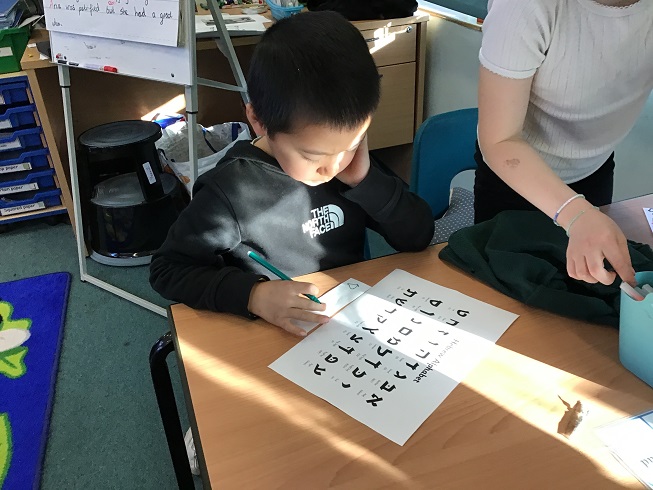
In RE, the children learnt about why Christians have given Jesus the name ‘Saviour’. They learnt about the Nativity story and heard that Mary and Joseph were told to call their child Jesus, which means ‘he saves’ or ‘saving one’. They thought about each of the characters depicted in the Nativity story and used playdoh to made their own representations of these, either by making figurines or creating something symbolic, such as a crown. The children talked about each character’s role in the story and why they play an important part in this Christian story.
Reverend Rob Hawkins took a whole school assembly about Advent. He explained that this means 'coming' and is a time of preparation in the period before Christmas which celebrates the birth of Jesus. It is all about preparing for Christmas Day. Rob welcomed a baby into his own family recently and told the children how his family had prepared for this.
Reception
In Reception the children learnt about Diwali. They took part in a range of practical activities to learn about this festival of light.
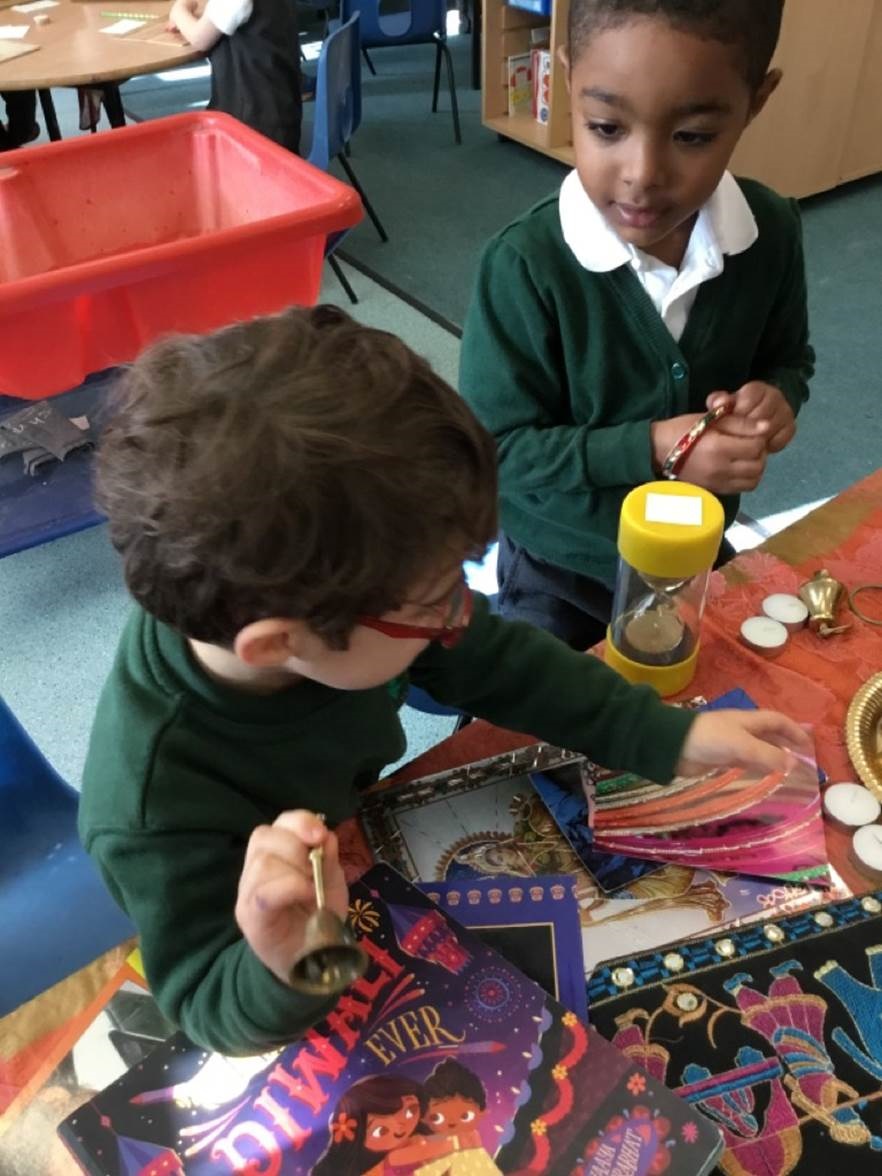
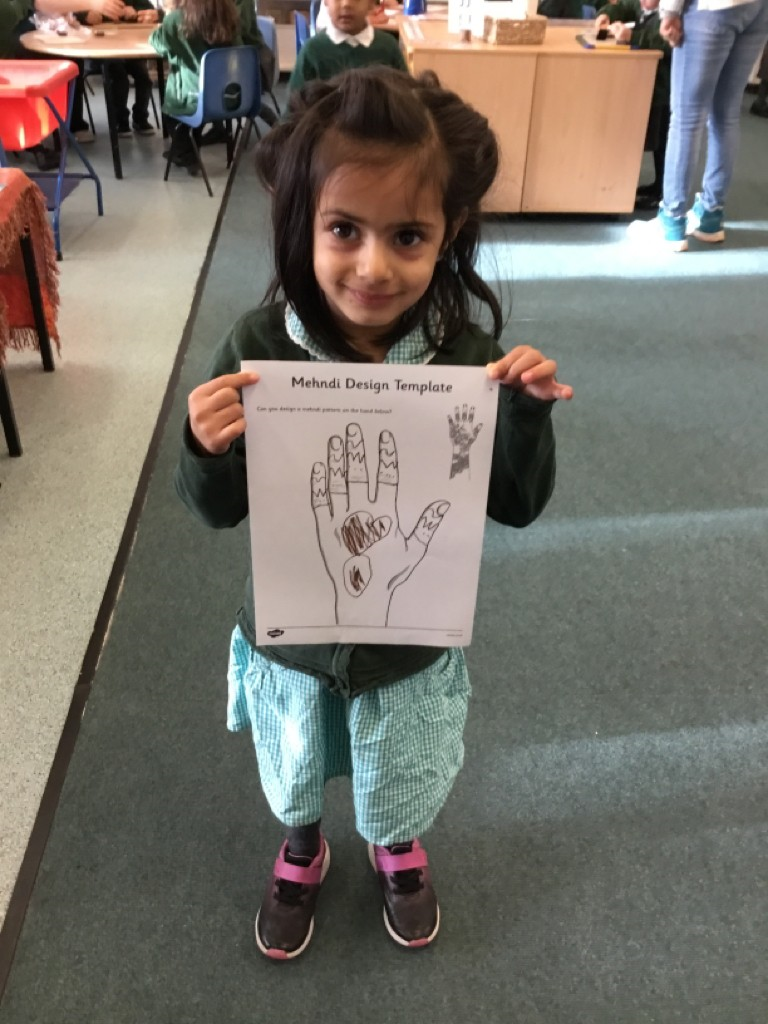
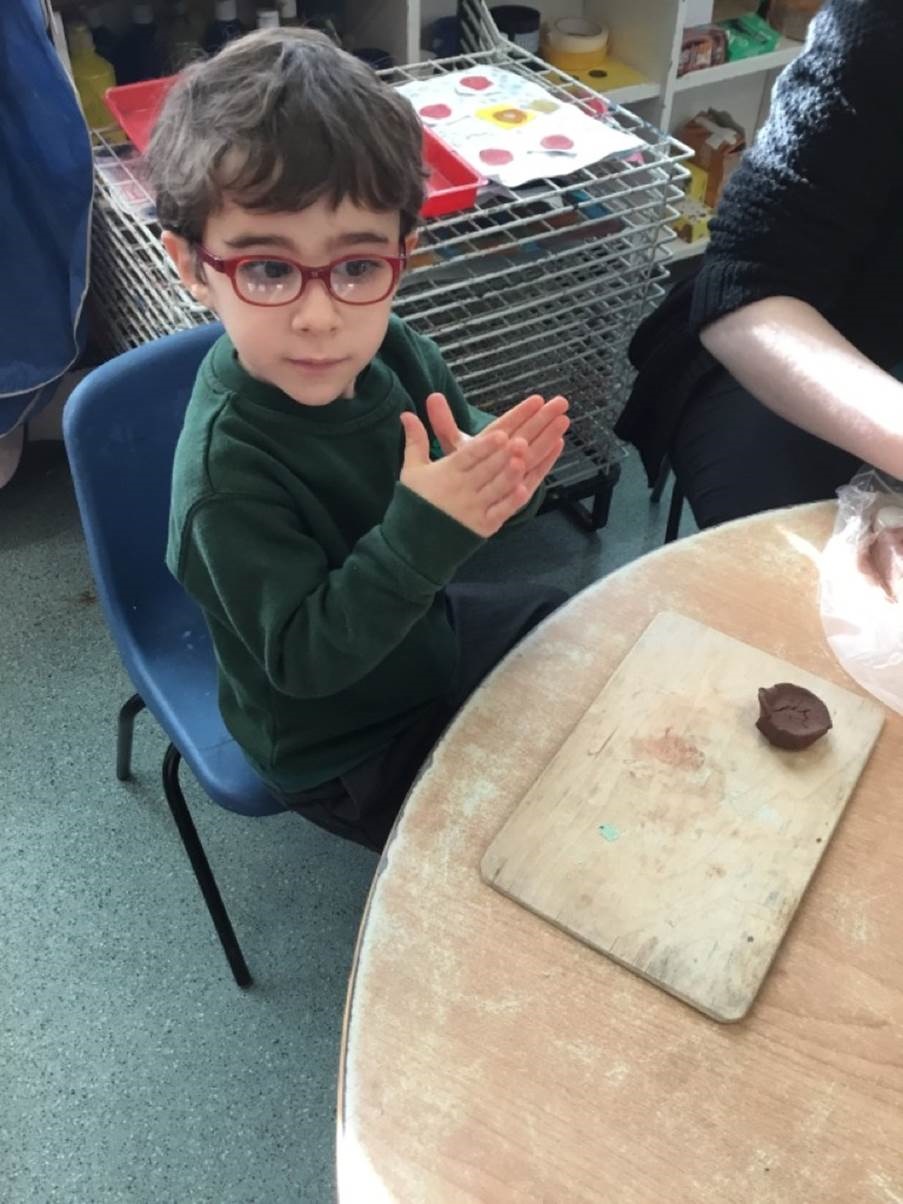
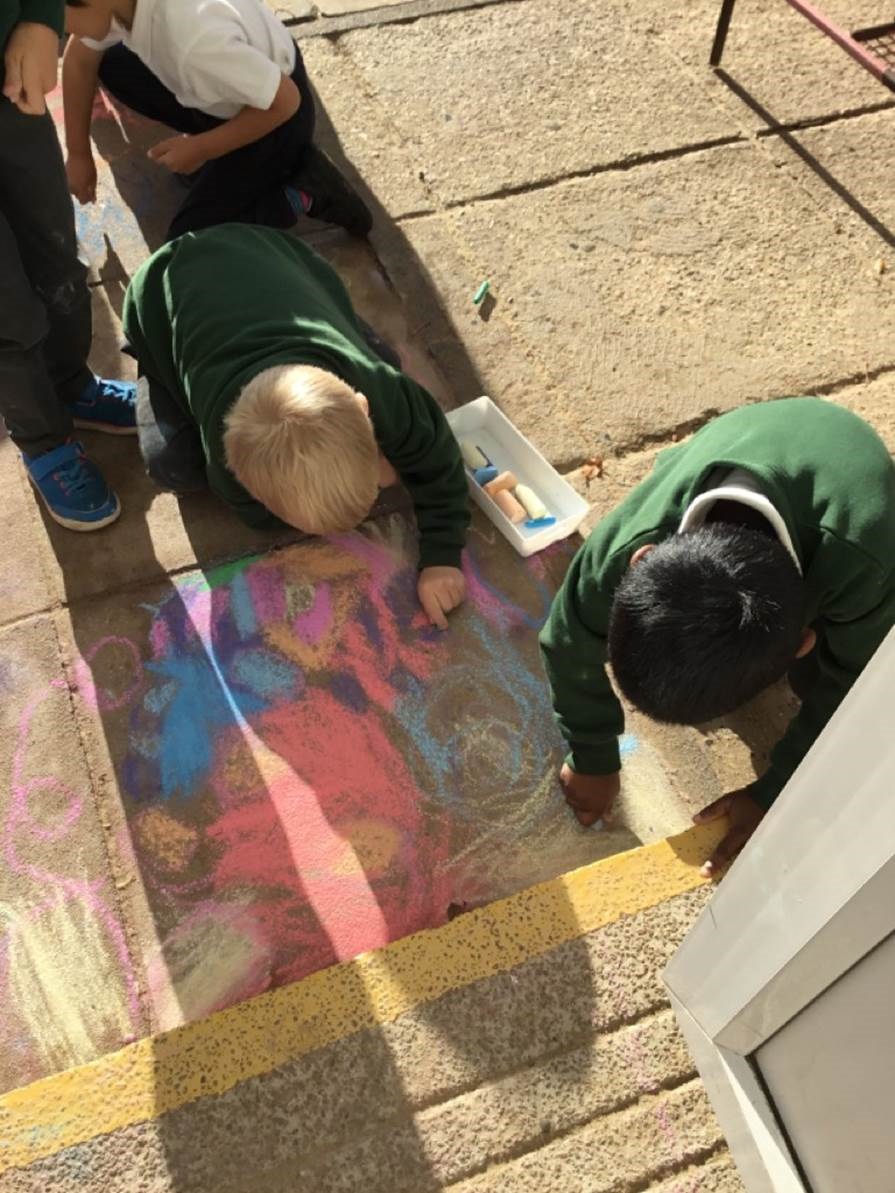
Summer Term
Our friends from St. Barnabas Church delivered an engaging assembly about conflict resolution and being fair. Through engaging, interactive storytelling, they helped the children to understand that we can work together to make sure that things feel fair for everyone.
Spring Term
The children learnt about Pentecost and Shavuot through a whole school assembly delivered by our friends at St. Barnabas Church.
Nursery
We were delighted to welcome families to nursery to share news of their Diwali celebrations.
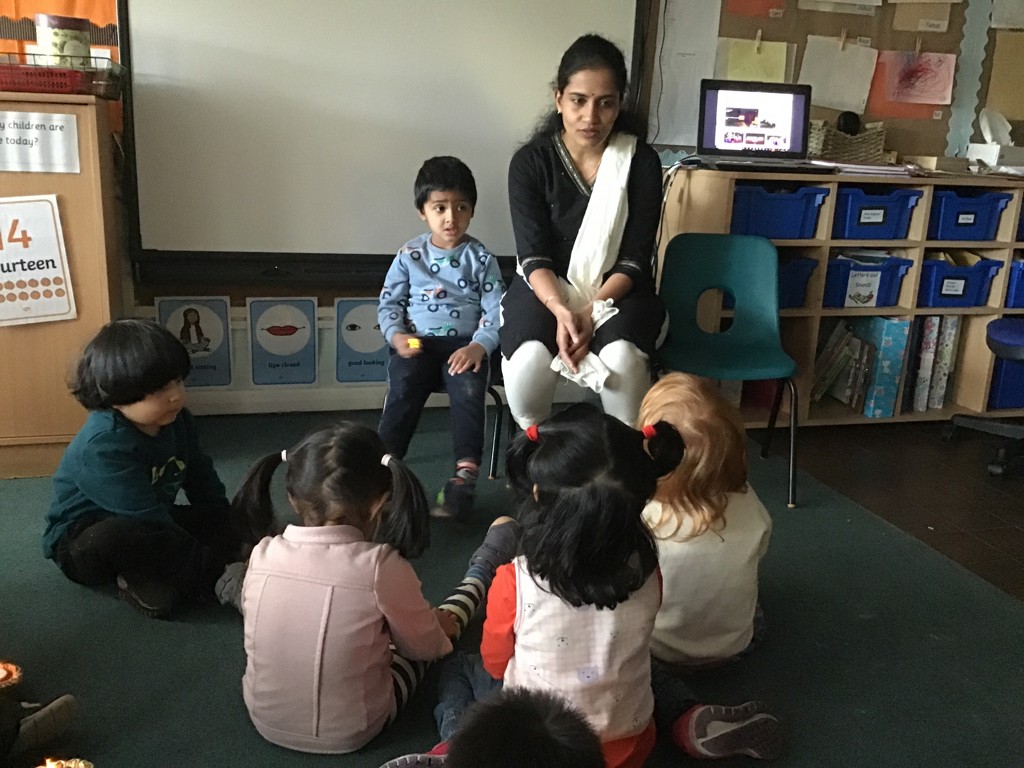
Children in Nursery learn about the importance of being kind using Kind Kangaroo, who is one of our learning animals.
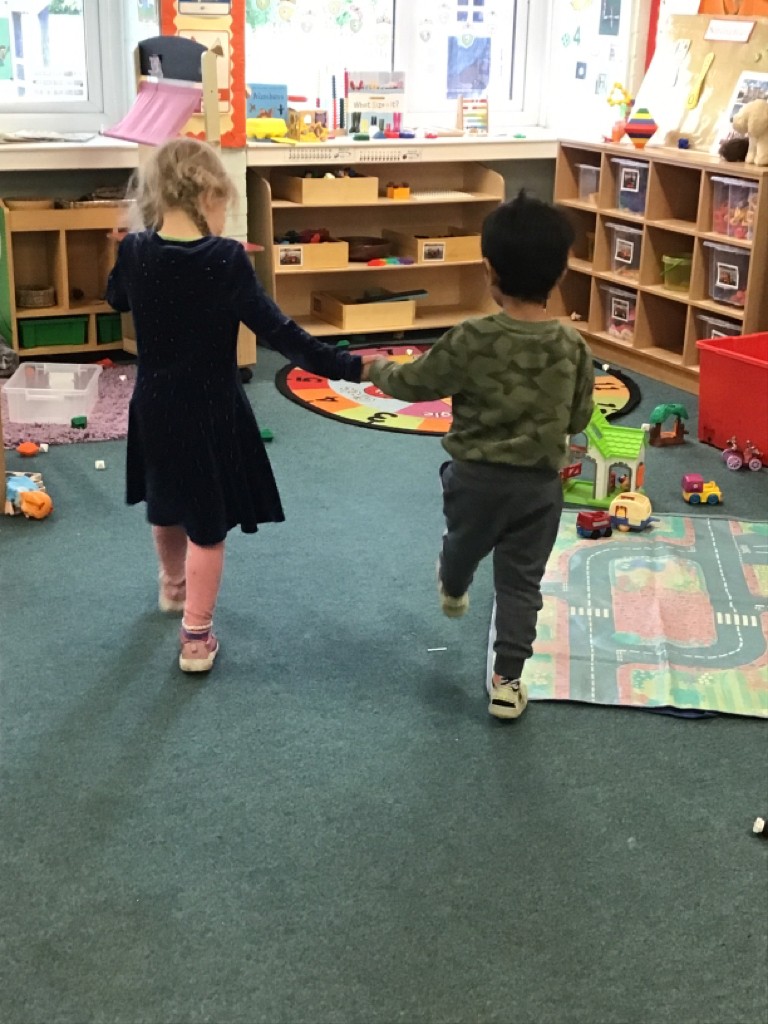
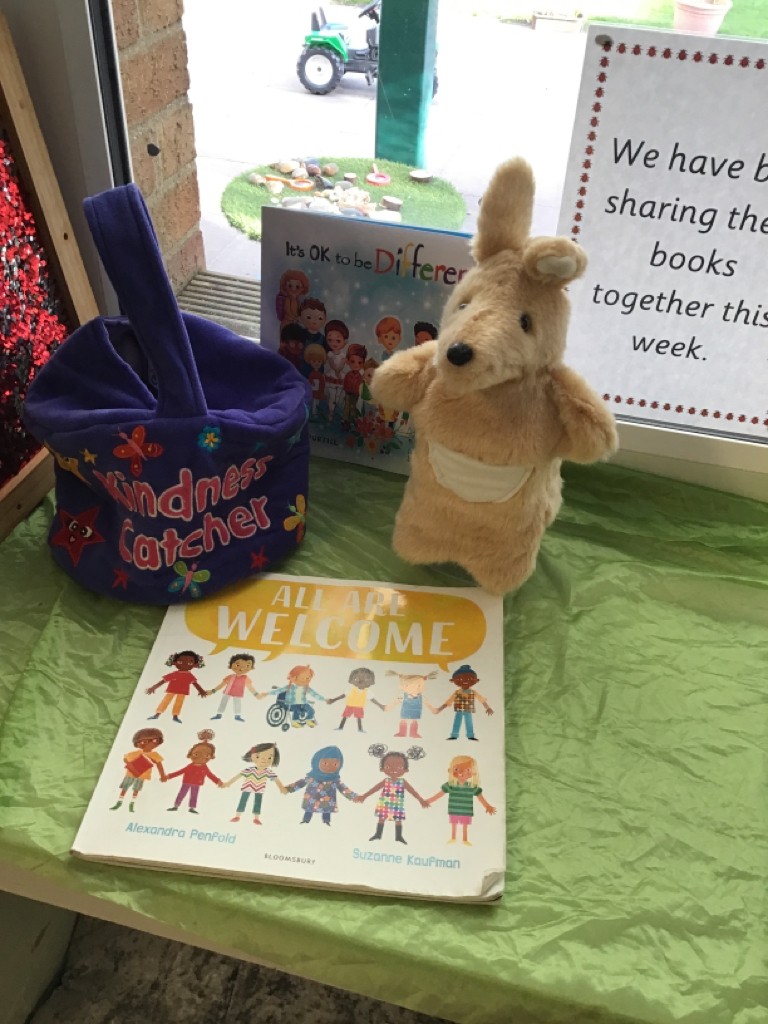
Reception
Eid
Reception children had a lovely morning learning about Eid. We looked at photos and heard about how our friends celebrate. Children were able to participate in a variety of activities across both classrooms such as making cards and building mosques.
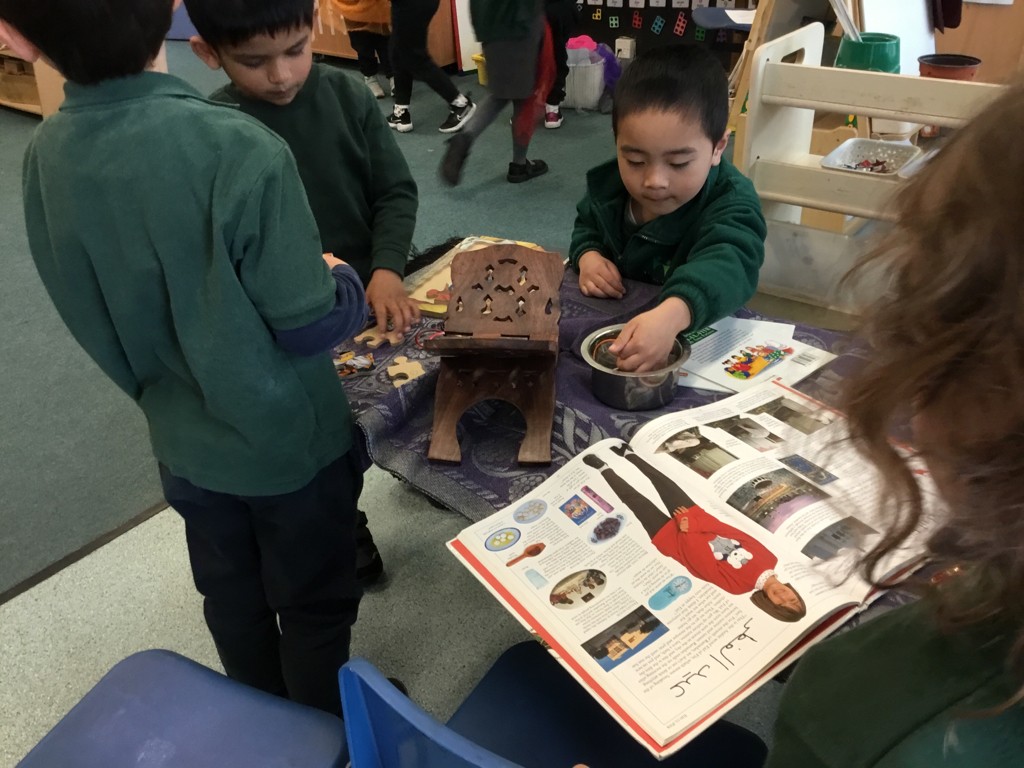
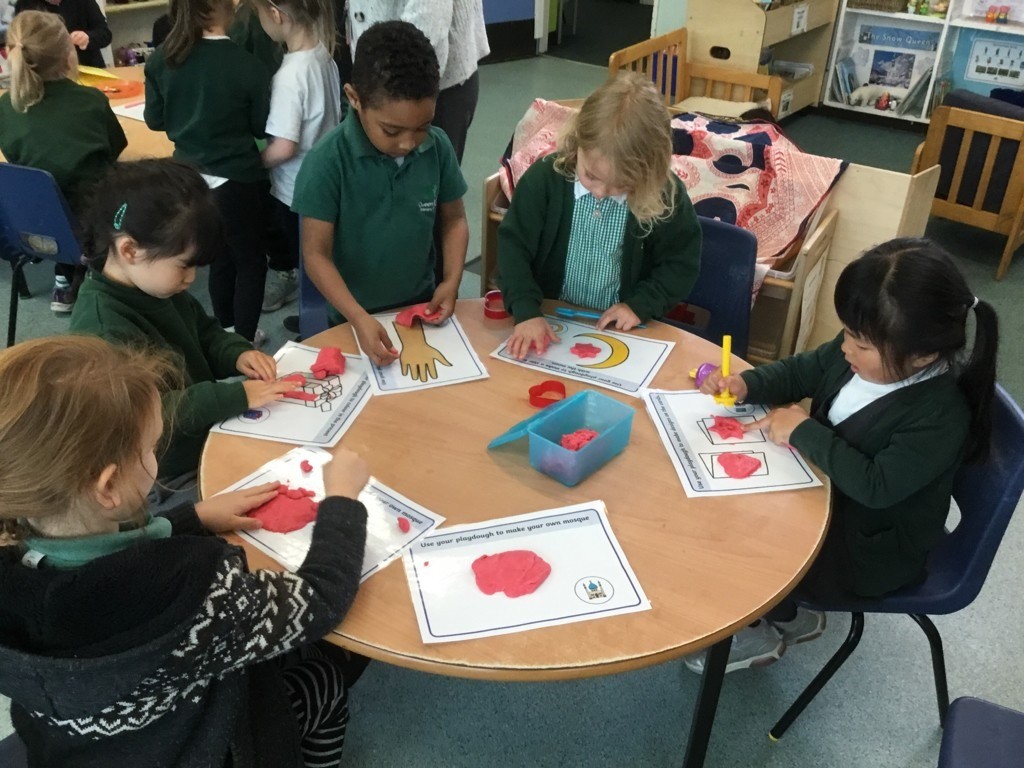
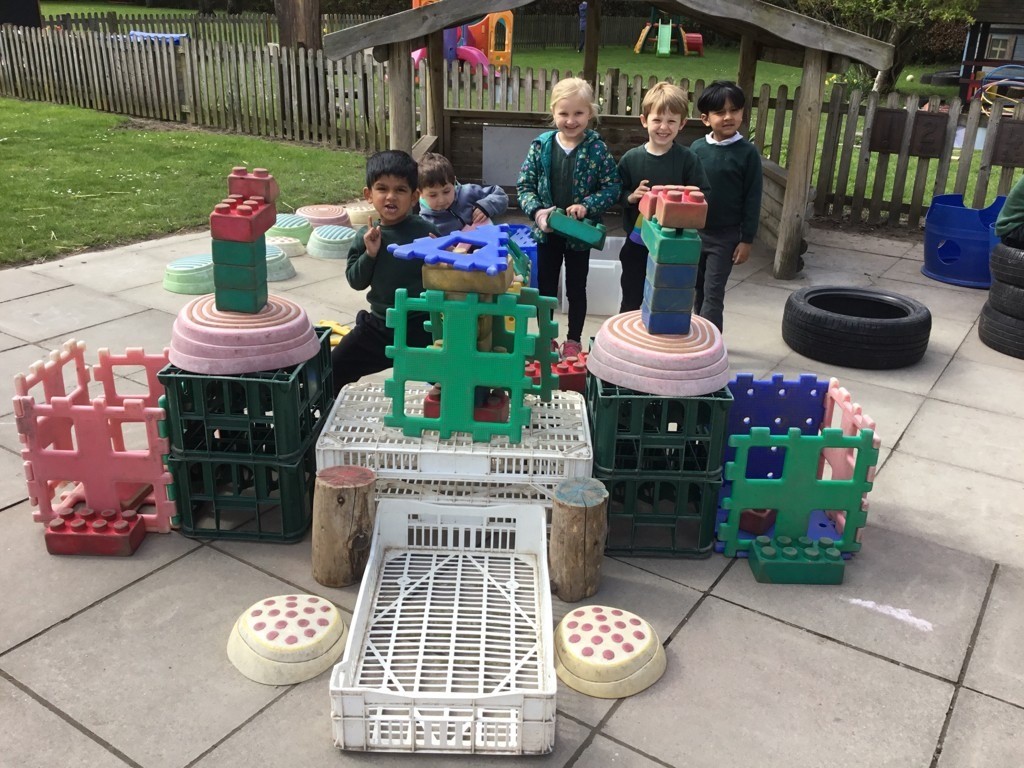
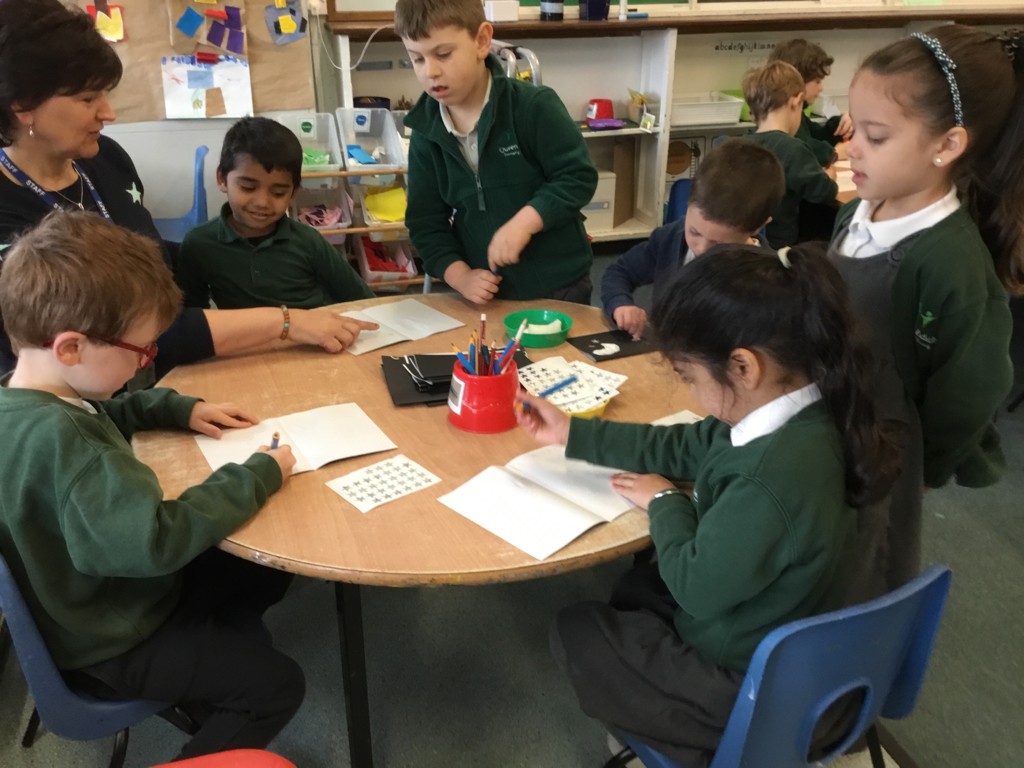
Diwali
Reception children enjoyed learning about Diwali and engaging in different activities across both classrooms. We enjoyed activities such as making yummy Raita and Rangoli patterns in the garden
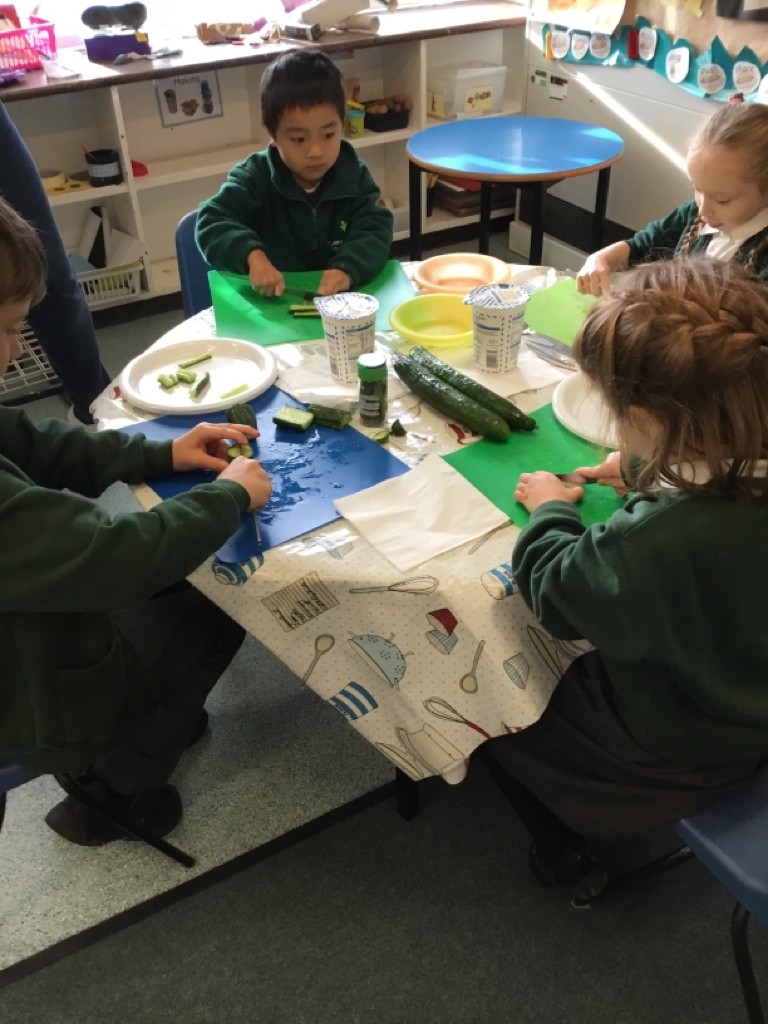
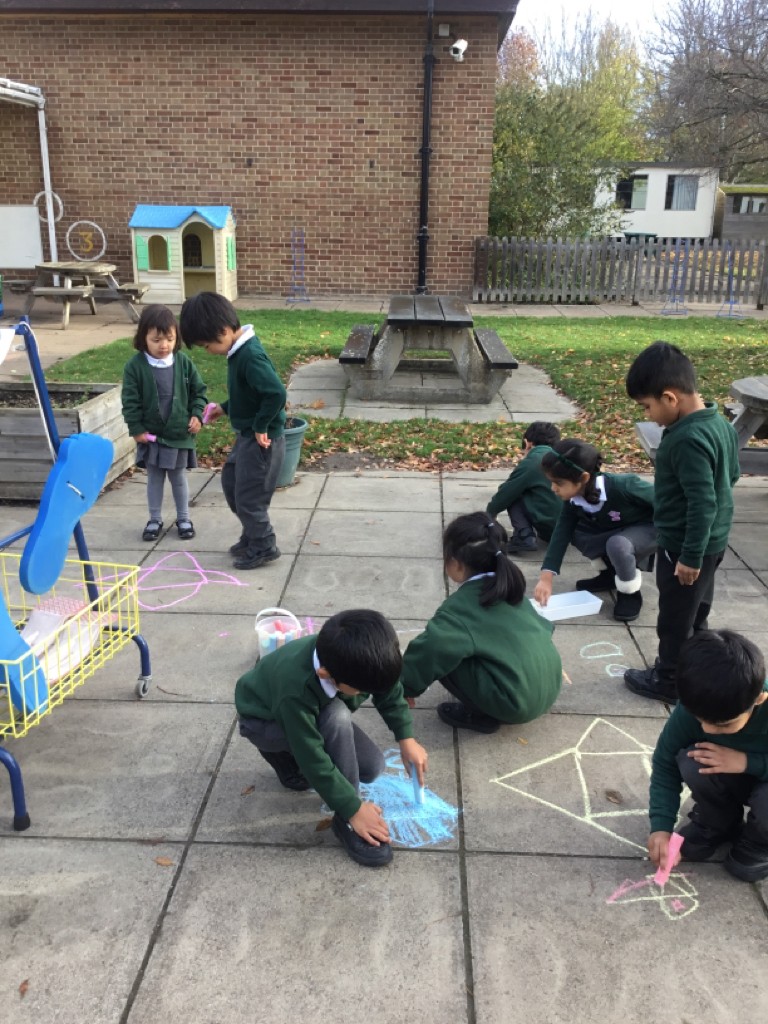
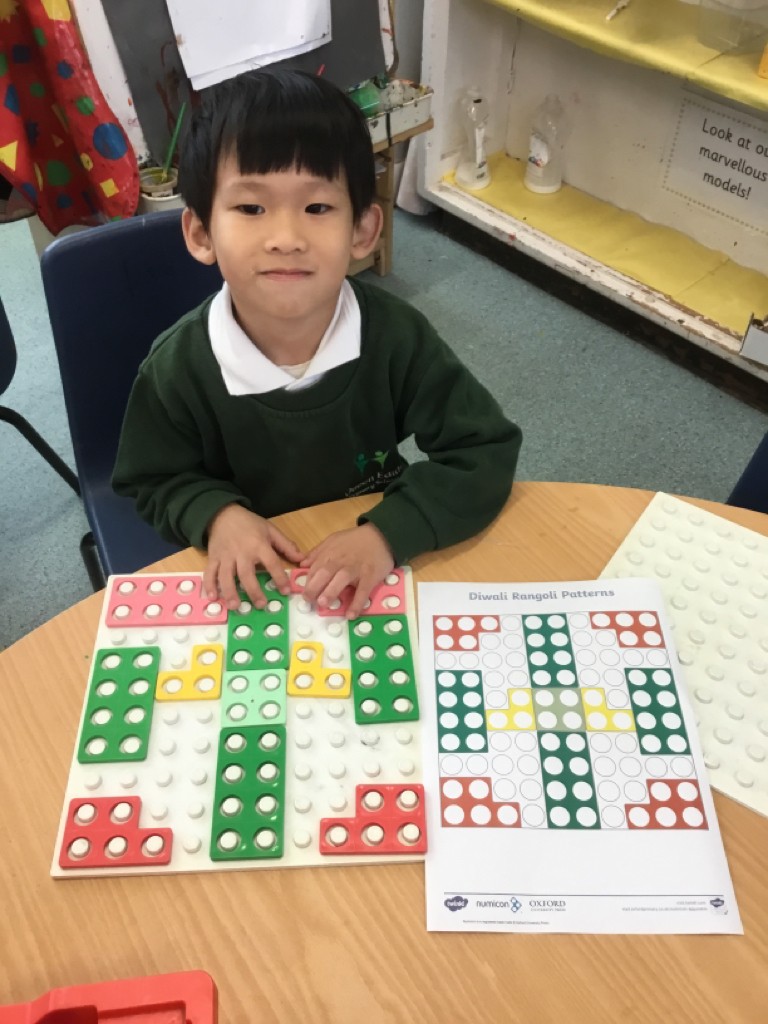
Year 1
Belonging
Year 1 have been exploring the question ‘What difference does being a Christian make to a family?’. They learnt about church as a place of belonging where Christians have a church family. They also thought about groups and places where they belong.
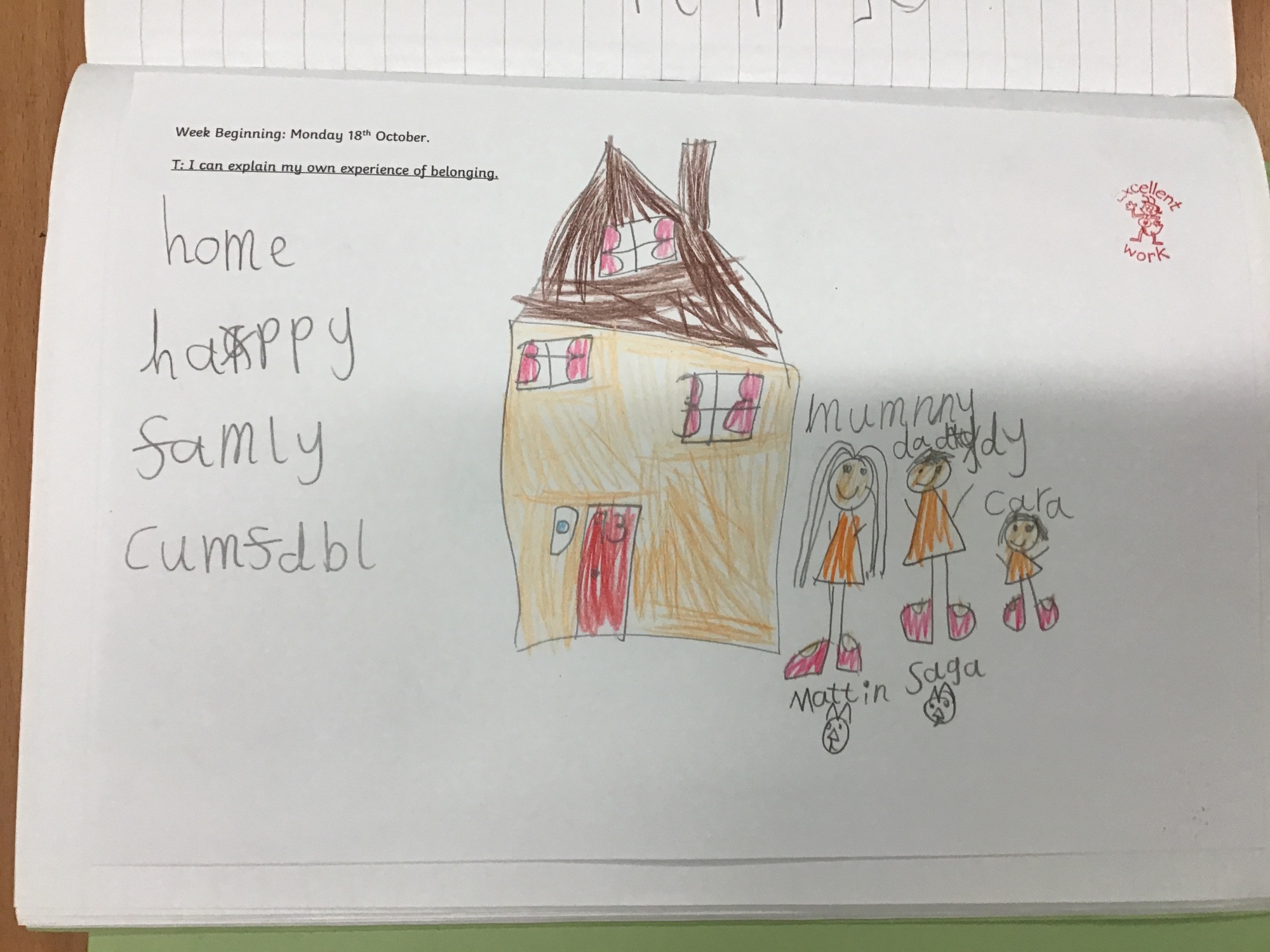
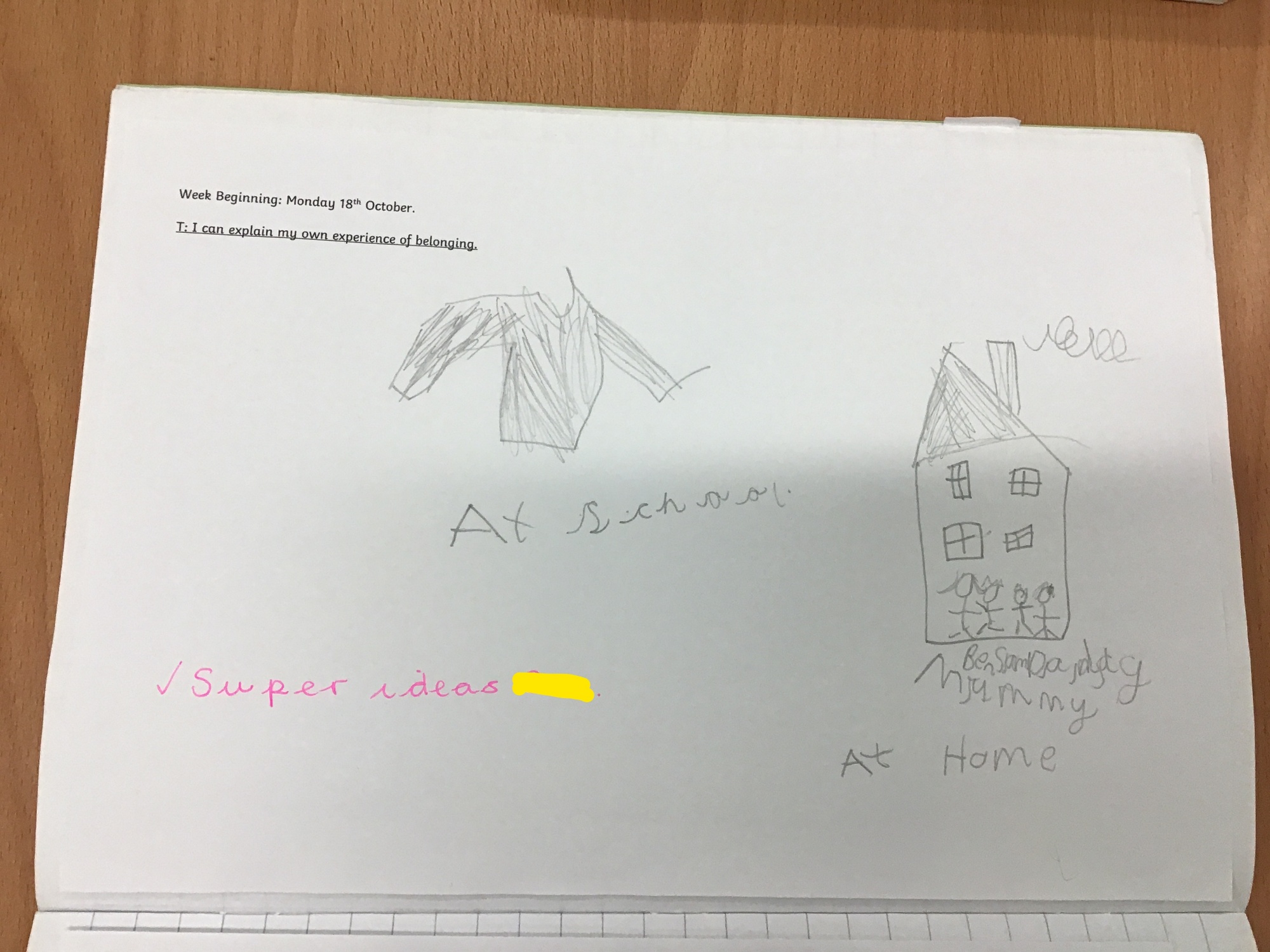
Year 2 Summer Term.
In the ‘Big Questions’ unit in RE, Year 2 have been learning how people with different faiths and world views show they are thankful. The children learnt about the Jewish festival of Sukkot. The most popular tradition of Sukkot is building, decorating, and spending time (even sleeping!) inside a hut called a sukkah.
During Sukkot, families welcome guests into their sukkah, or visit friends in theirs, enjoy delicious seasonal food and feel thankful for what they have. After learning about Sukkot, the Year 2 children went on a natural world scavenger hunt to find items and objects that they felt thankful for.
Year 2 Autumn Term.
Year 2 have been thinking hard about the nativity story this half term, focusing on what different characters were told about the baby Jesus. We made the link between the advent calendars (currently being enjoyed by many of the children!) and Advent as a time when Christians prepare for Jesus’ arrival. We had fun creating our own Advent wreaths, which are used in many churches to count time during this season.
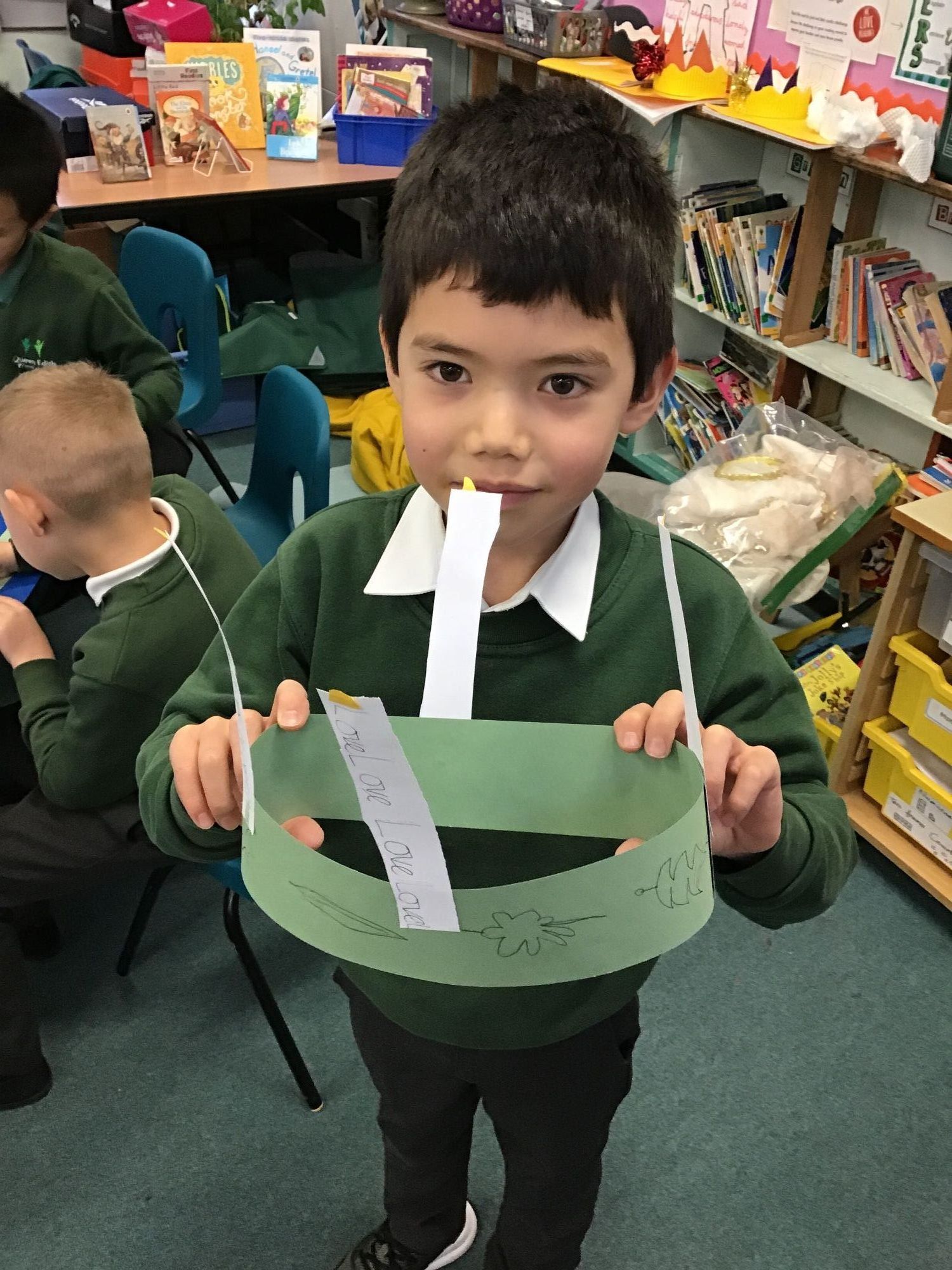
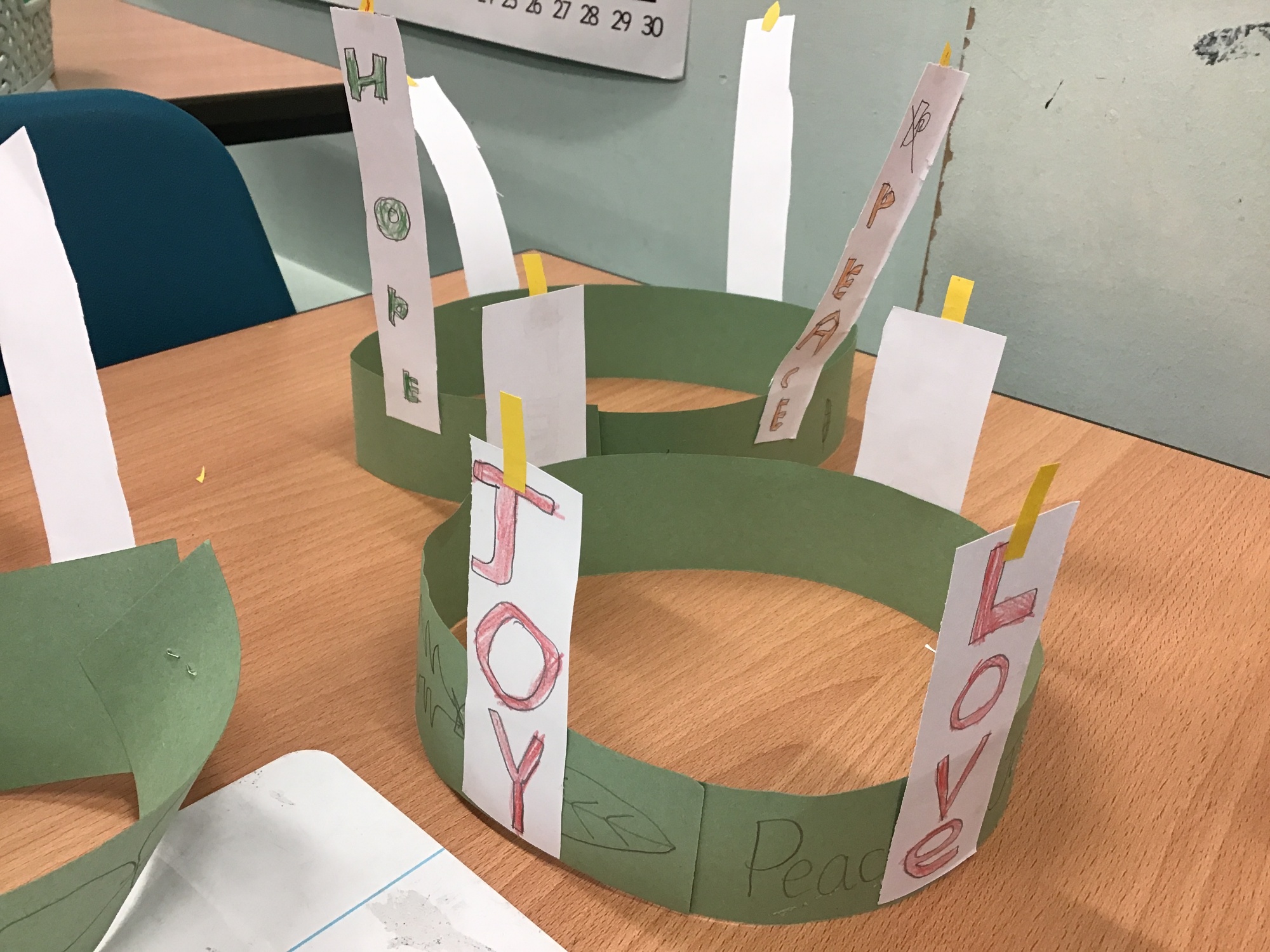
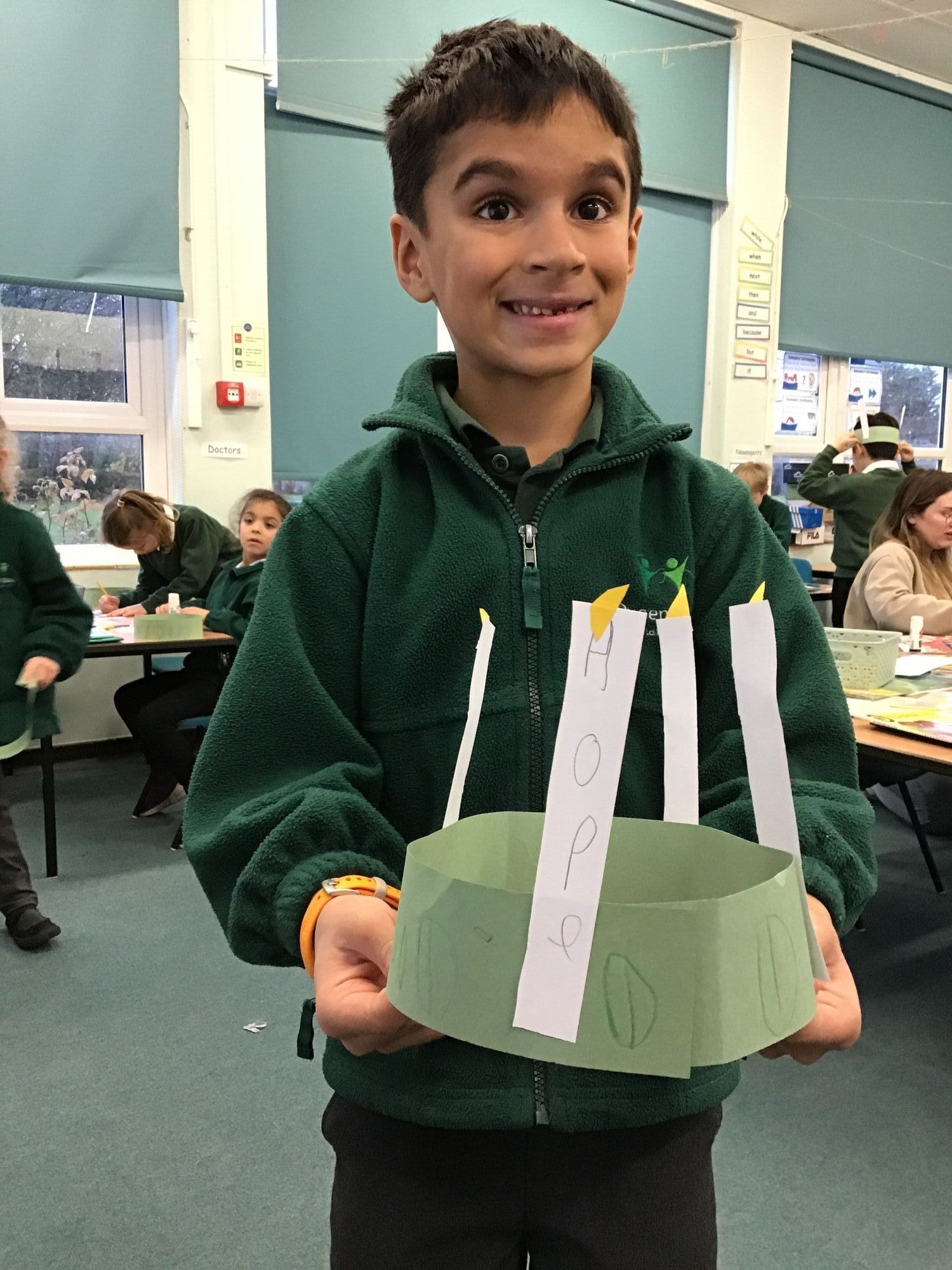
People We Trust
As part of our investigations into ‘Why do Christians trust Jesus and follow him?’ Year 2 thought about people they trust. We tried to pinpoint reasons why we might trust a person, and why it’s important to choose the right people to trust. We also found out about some people in the Bible who trusted Jesus, including Zacchaeus.
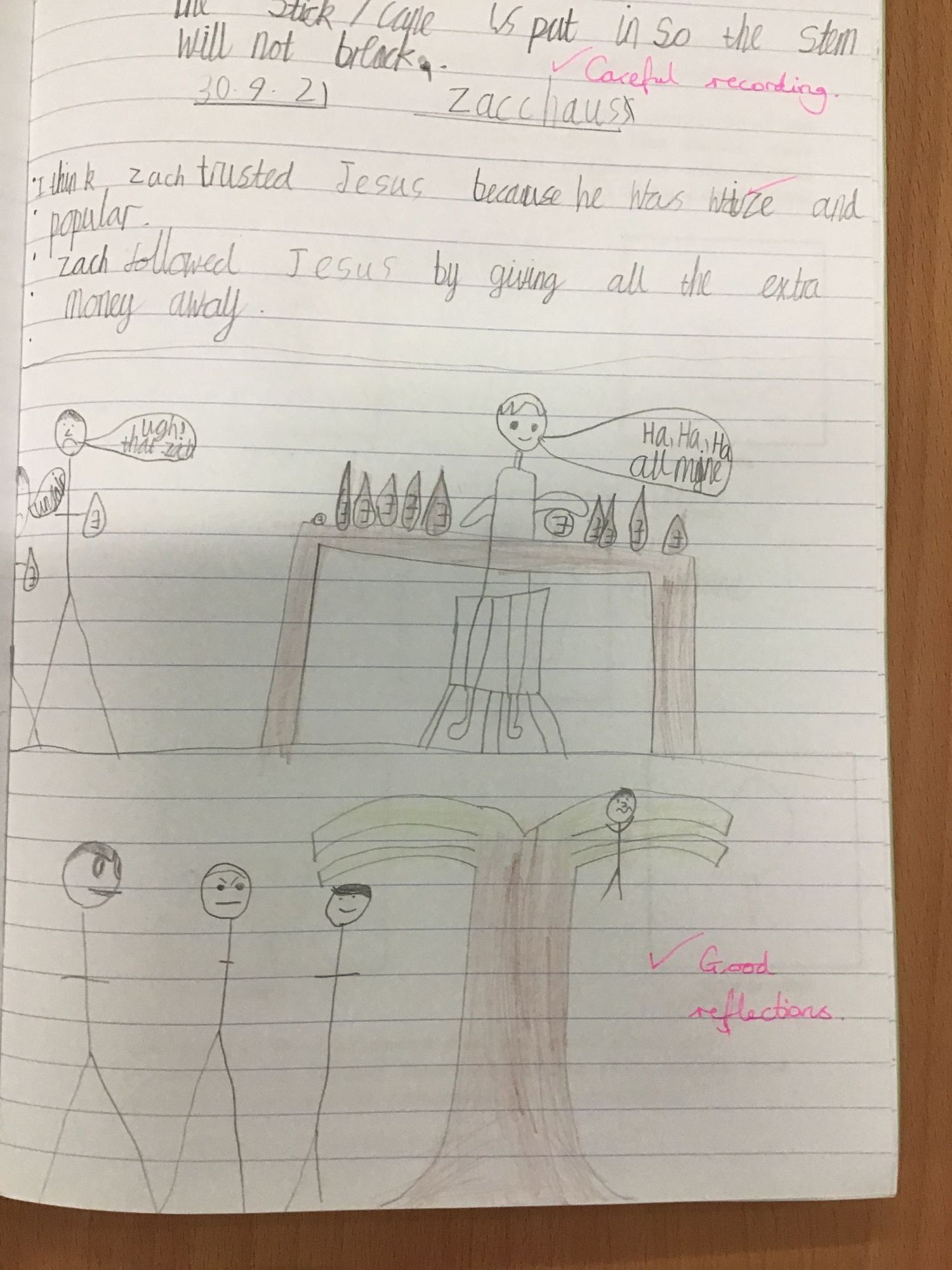
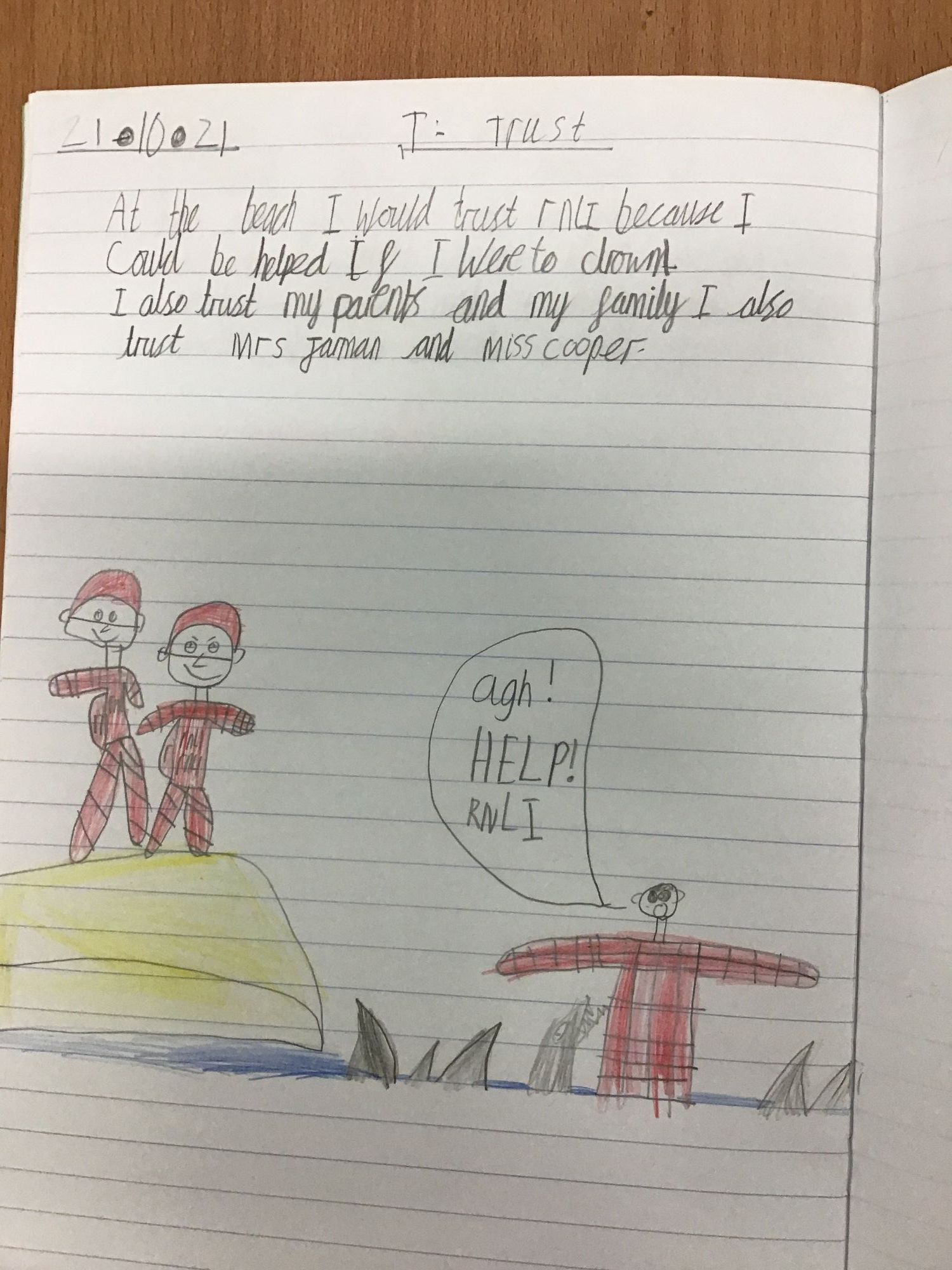
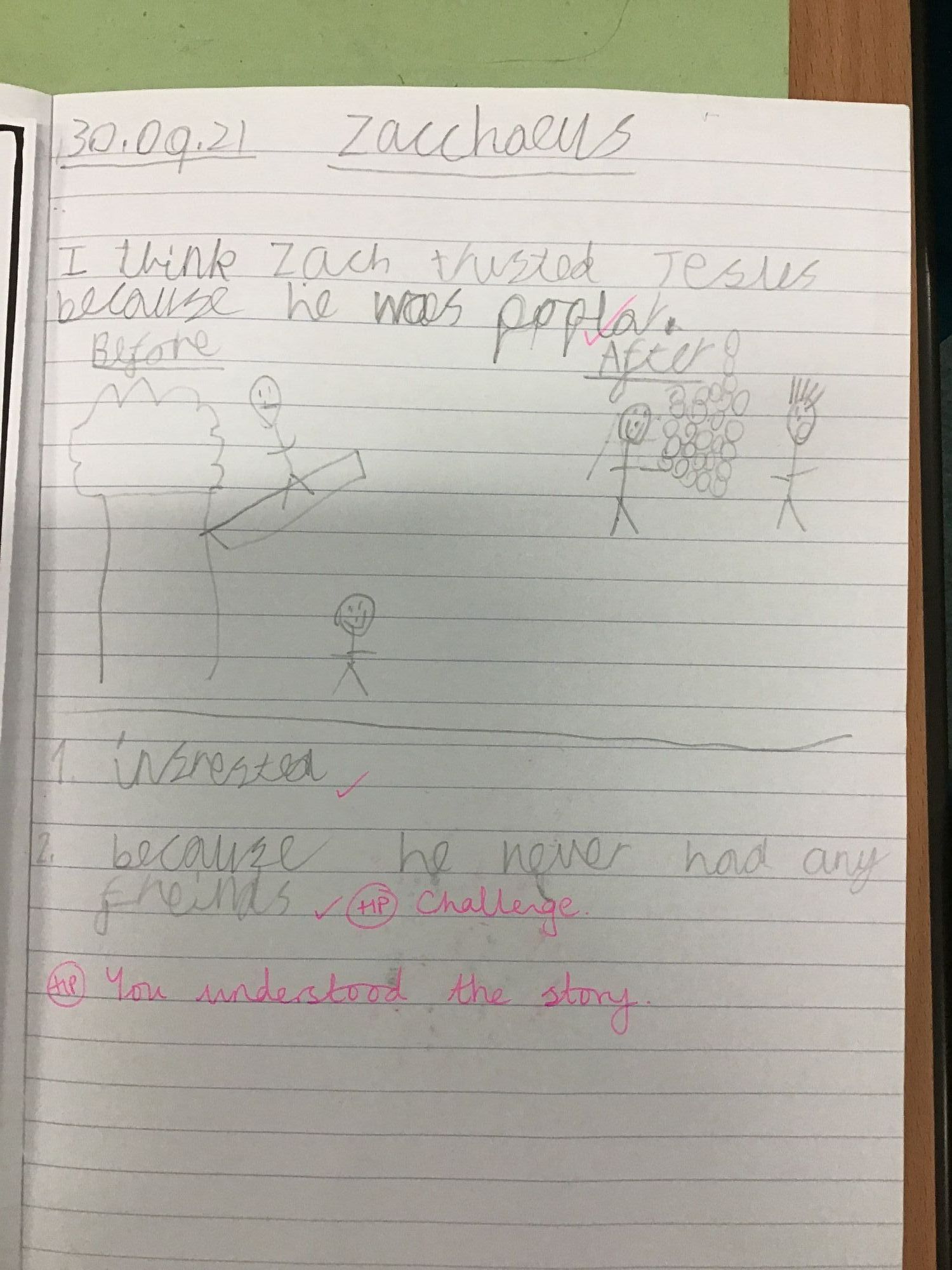
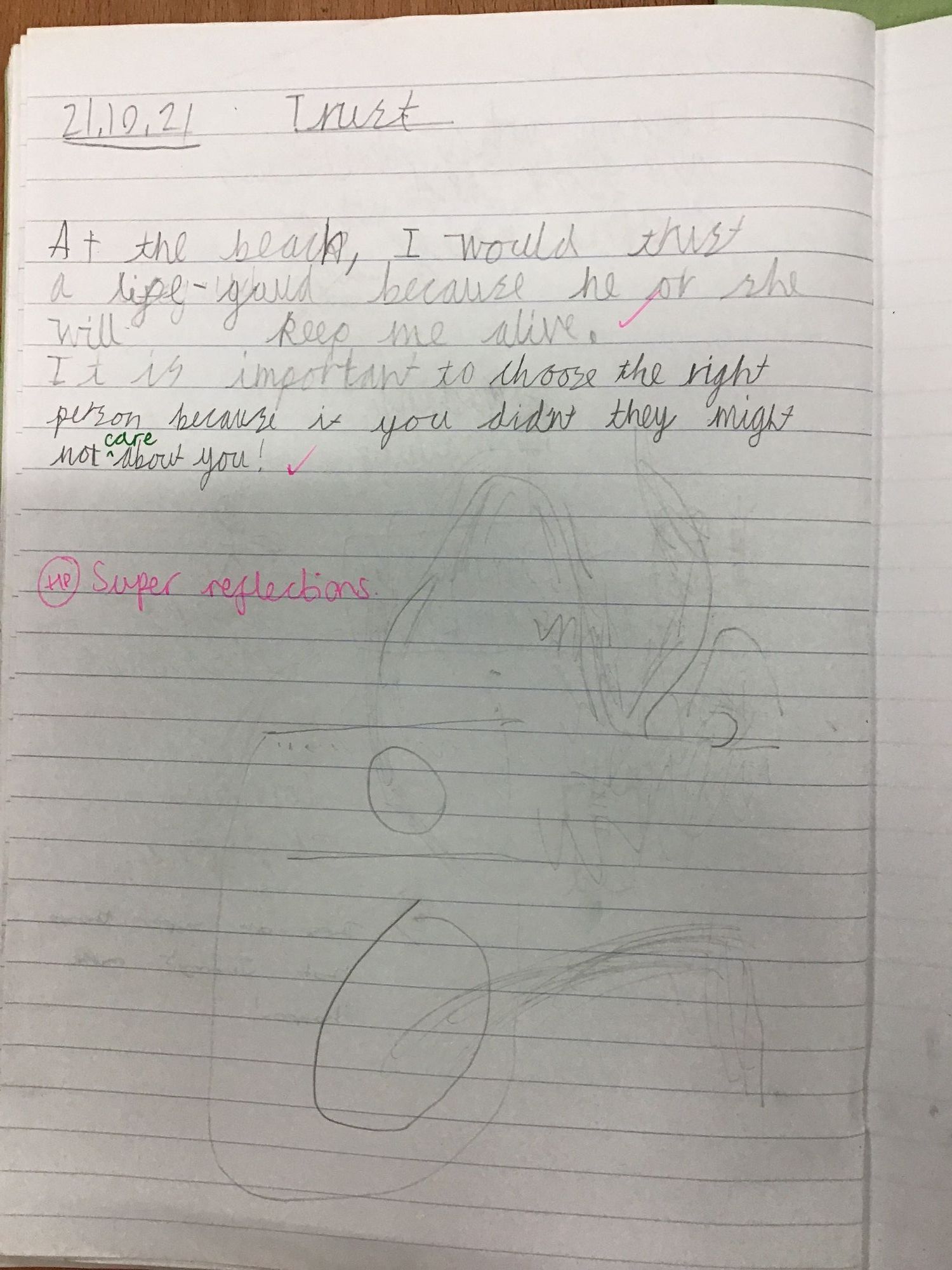
Visitor
Year 2 enjoyed meeting a Christian visitor as part of their unit on ‘Why do Christians trust Jesus and follow him?’. The children came up with loads of super questions to quiz her with and listened really carefully to her answers. First-hand experiences like this are invaluable for giving children an insight into the difference the visitor’s faith makes to their life.
Year 3
Year 3 have been building on their knowledge of Christian festivals, thinking both about what Christians celebrate at these, and how they might do this.
Year 4
Flipbook
Year 4 have been investigating ‘What difference did Paul’s conversion make to Christians?’. To help understand the concept of conversion as a complete change they made a flip book of the story, one side showing ‘Saul’ and the other about the newly converted ‘Paul’. They also explored the impact of belief on Mother Teresa and the major changes she made to her life.
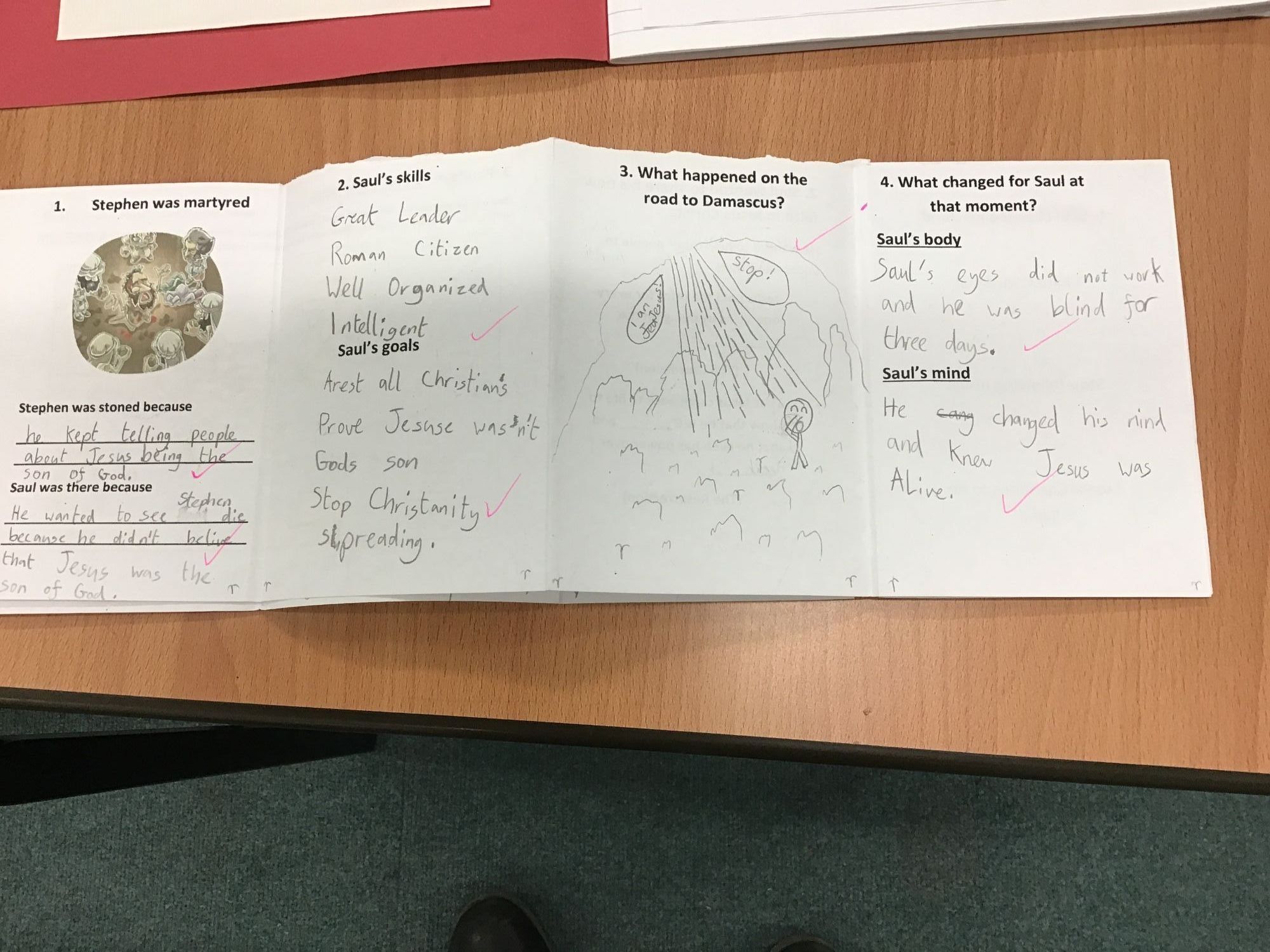
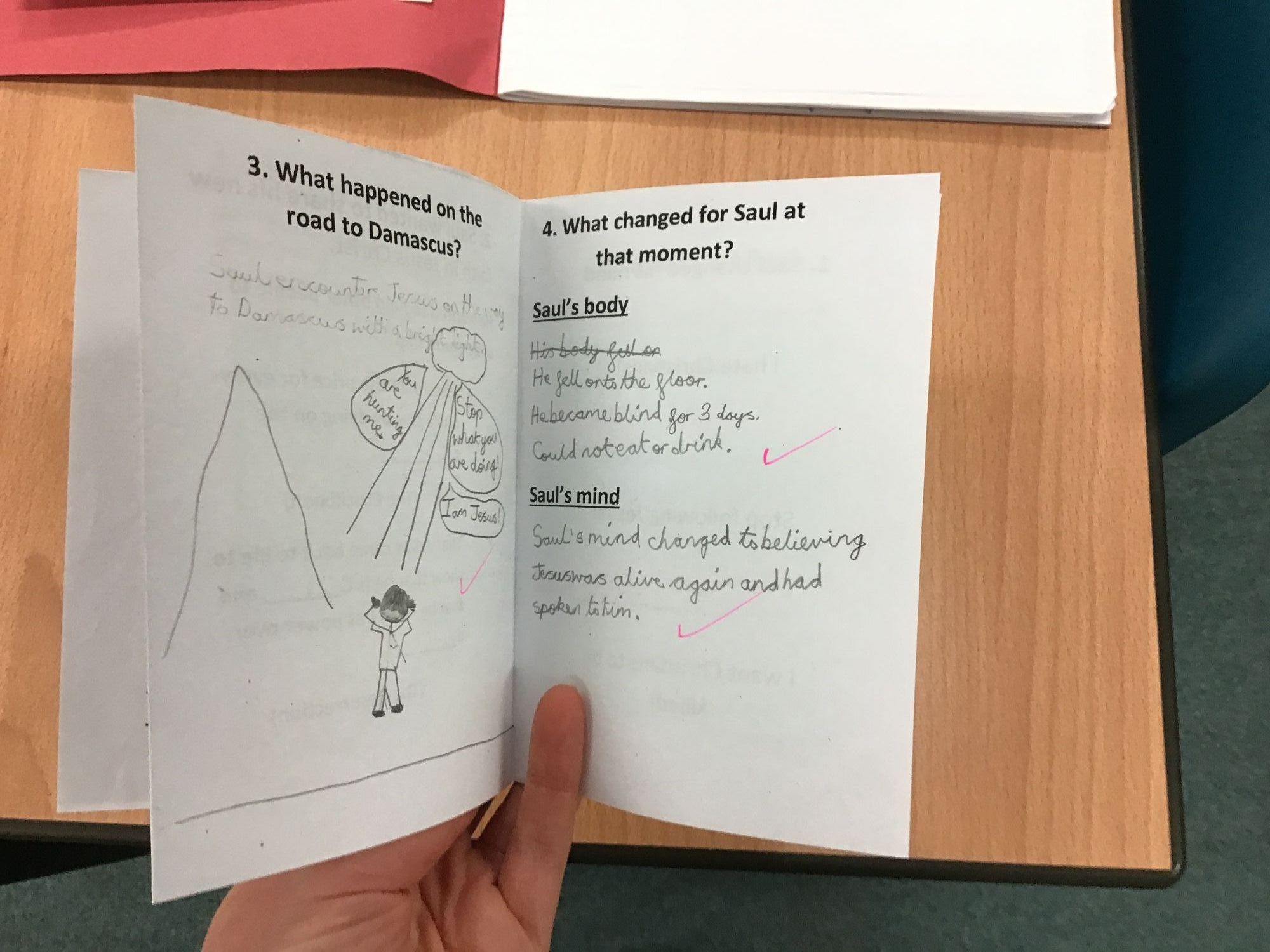
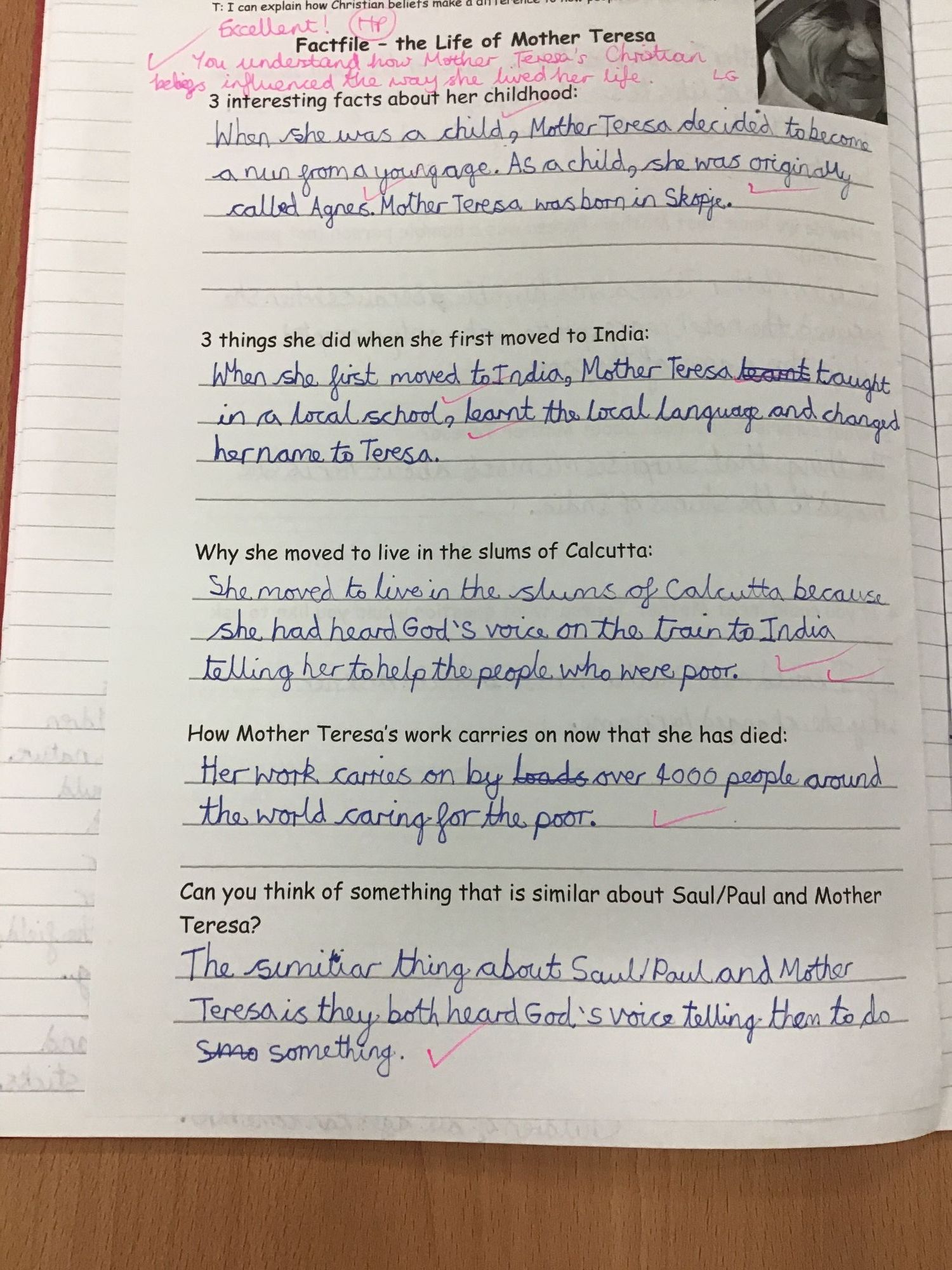
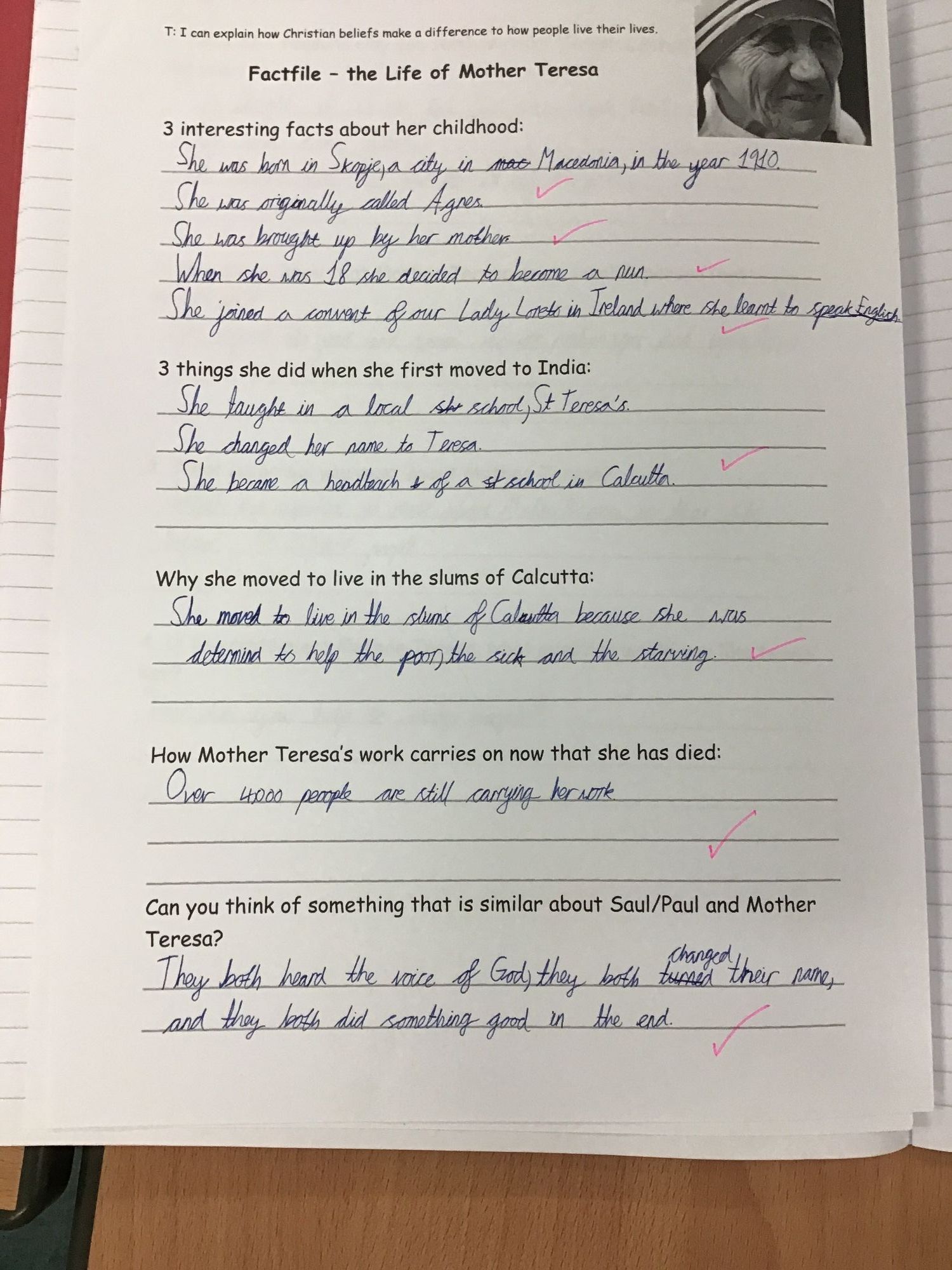
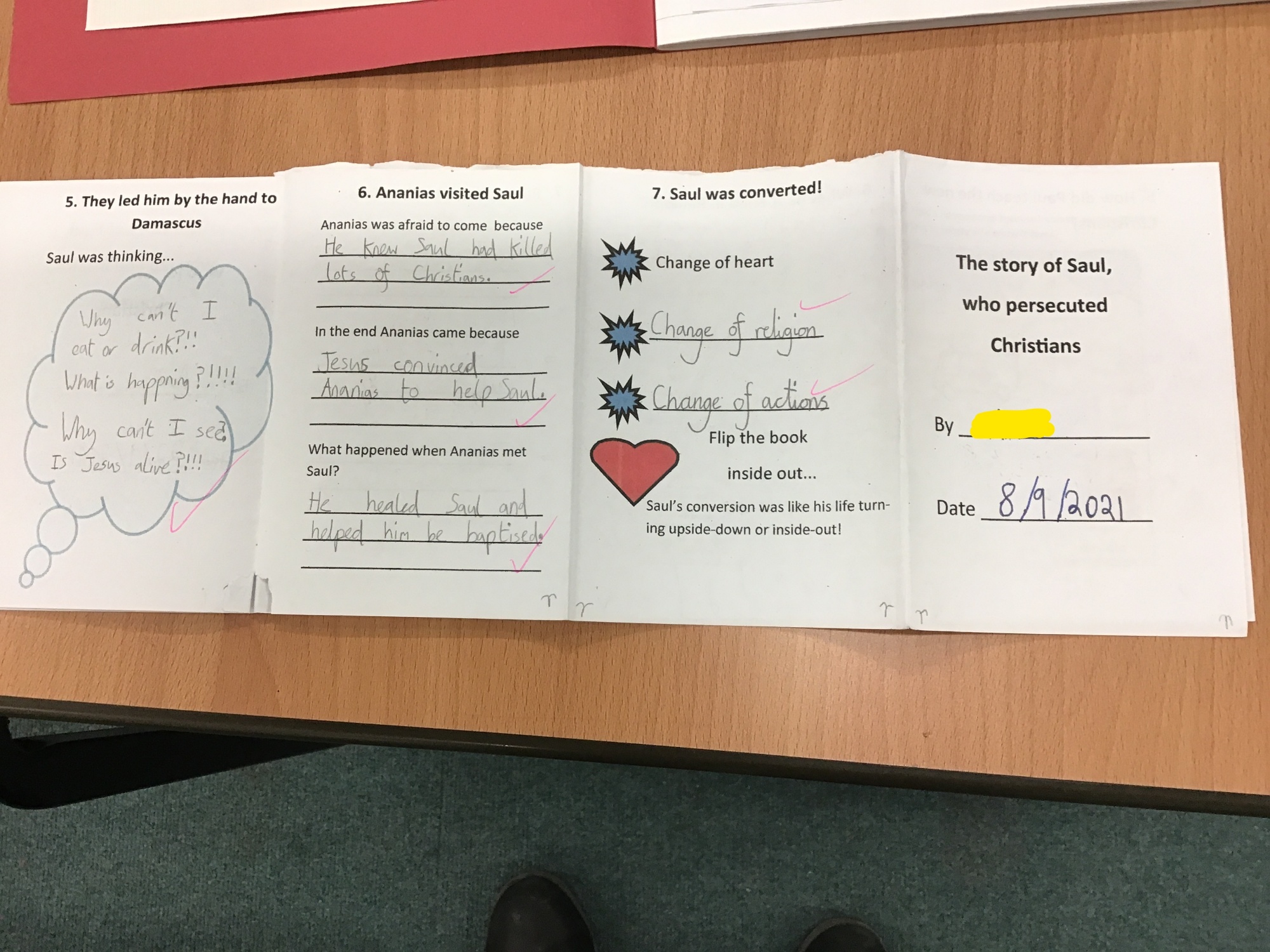
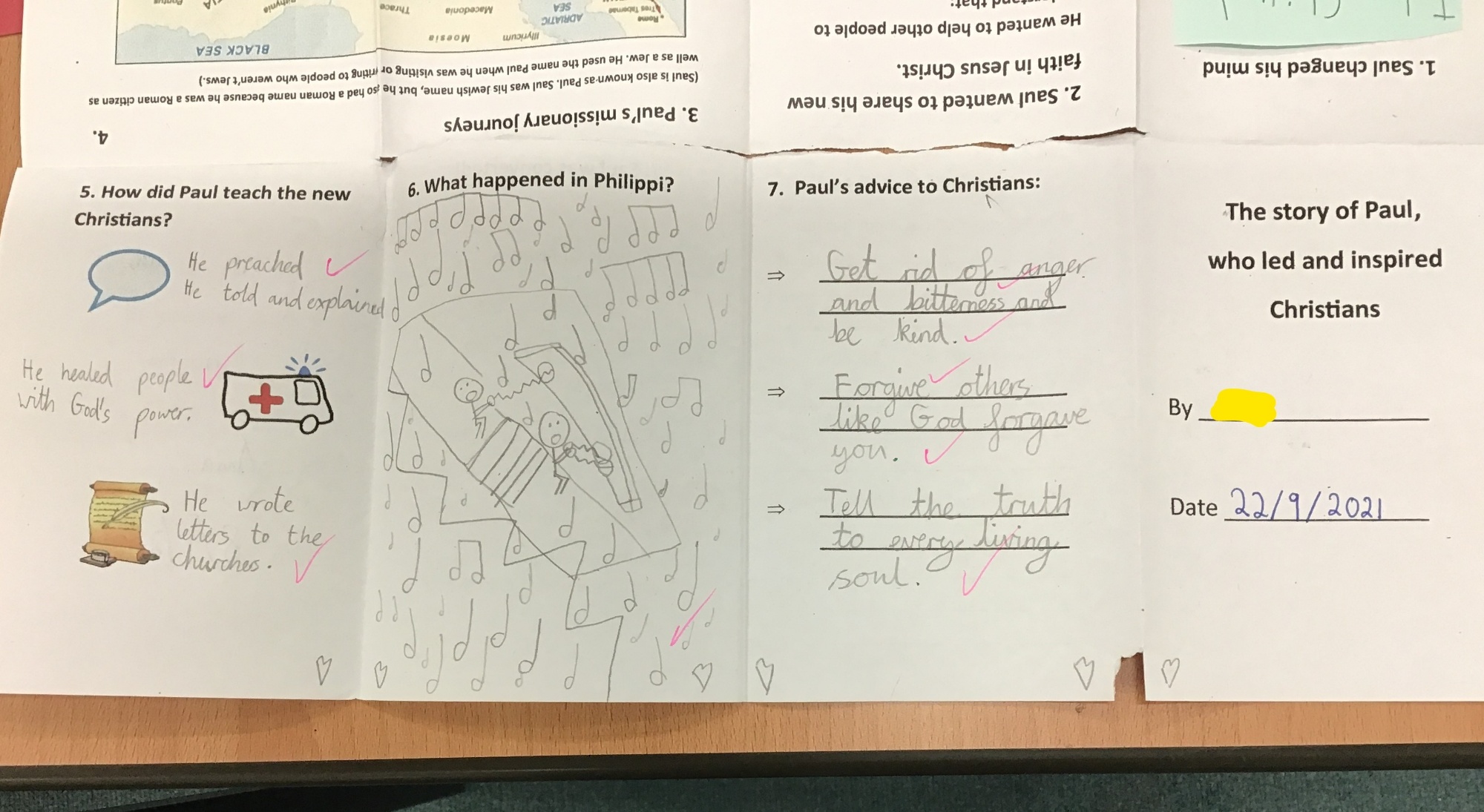
Kingdom of God
Year 4 are investigating ‘What do Christians mean by the Kingdom of God?’. They discussed the ‘golden rule’: treat others the way you would like to be treated, as well as some kingdom characteristics. They’ll be going on to explore their own ideas about what would make a perfect community and how people would treat each other within it.
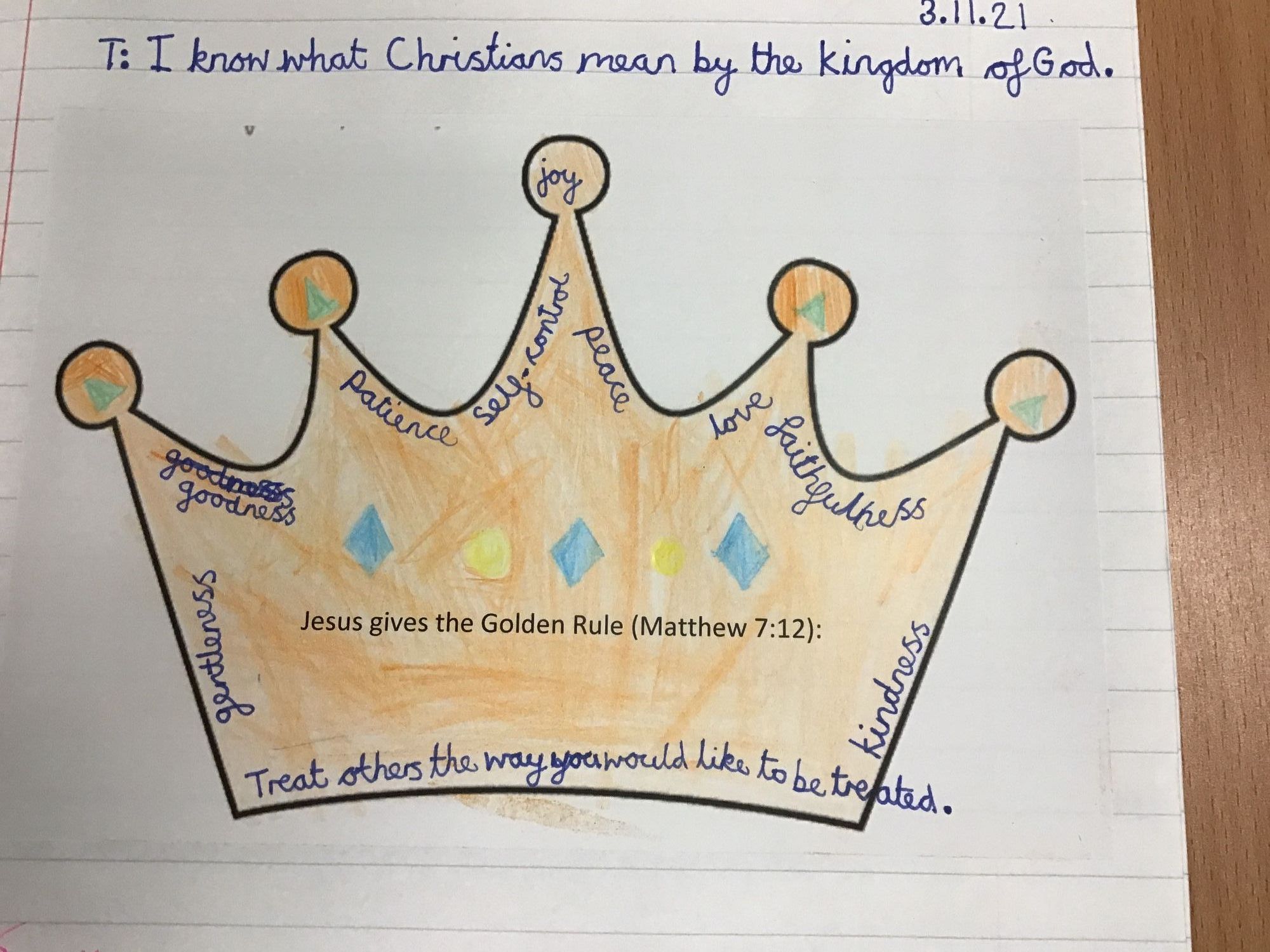
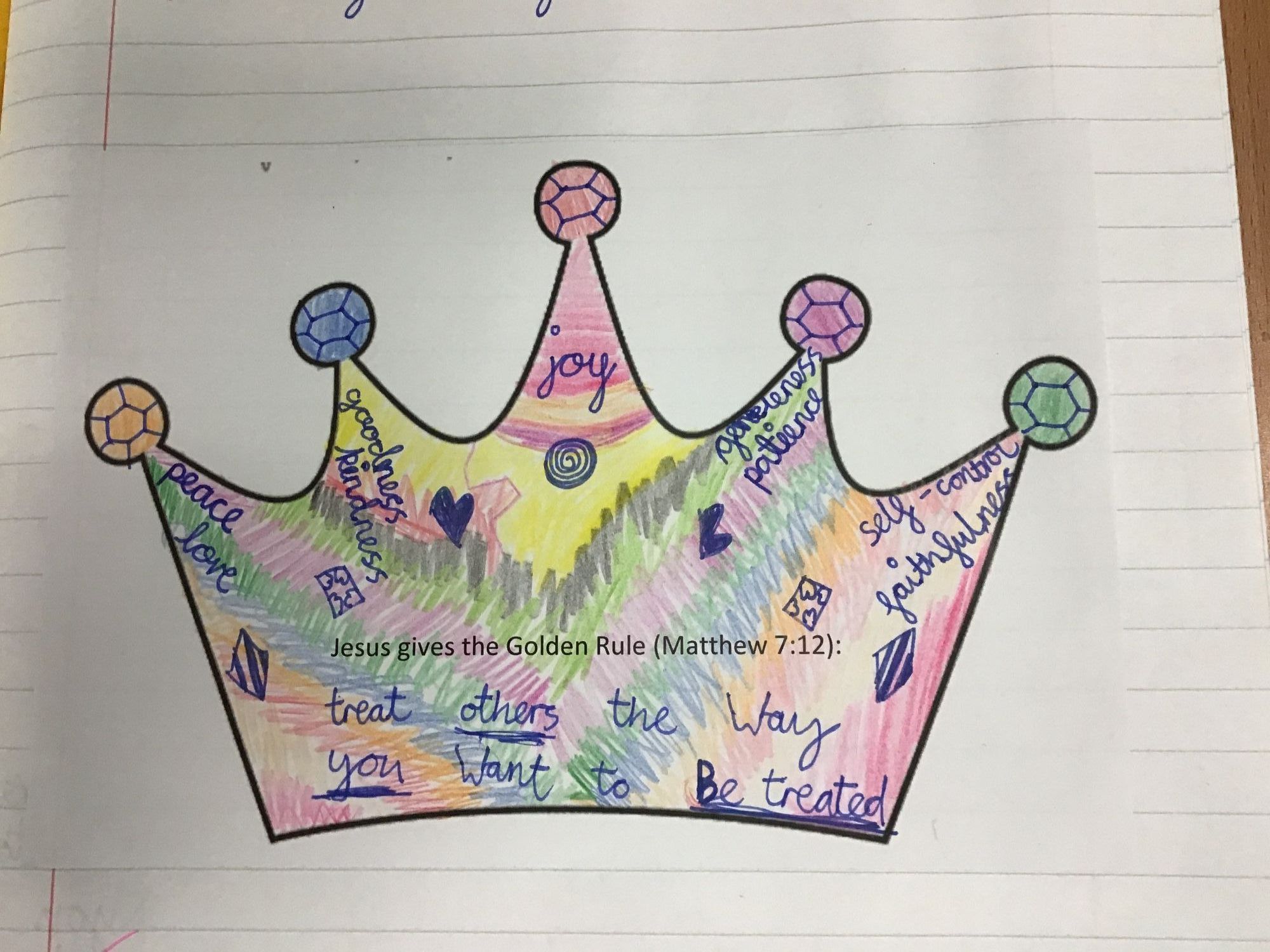
Year 6 Summer Term
In Y6, the children learn about Gautama Buddha and his path to enlightenment. They find out about the important rules that a Buddhist follows and learn where these rules come from by studying Buddhist beliefs and symbolism.
Year 6 Autumn Term
Our penultimate RE lesson this half term, learning about incarnation in Christianity, including us learning about Christingle. This is a symbolic object used in the Advent, Christmas and Epiphany services. Christingle comes from a word of German origin, Christkindl, meaning "Little Christ Child". We wanted to know how Christians show their belief in the incarnation in the way they live their lives. So, we all made one for ourselves, had a lovely time, and learned that each element of a Christingle has a special meaning and helps to tell the Christian story.
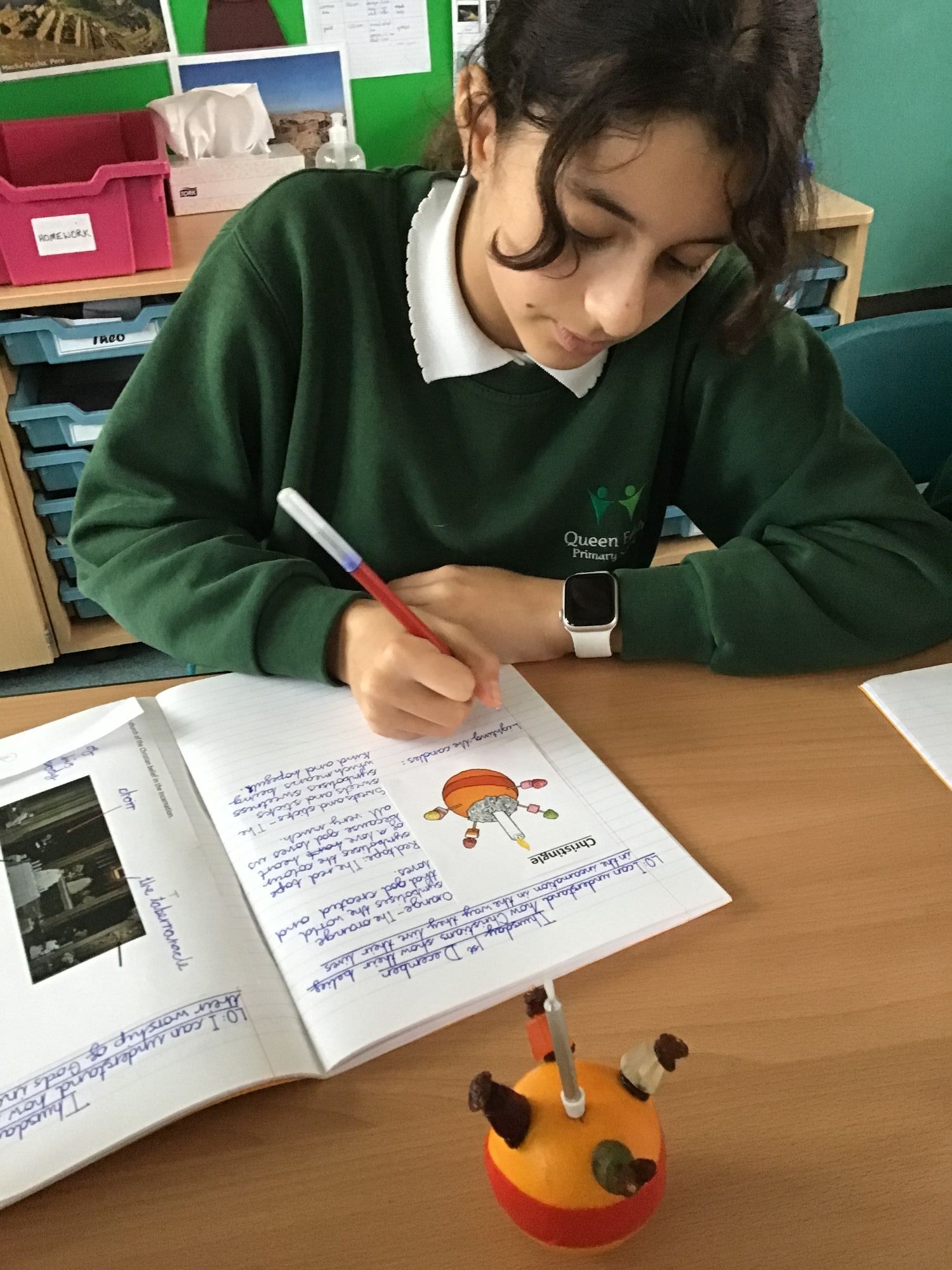
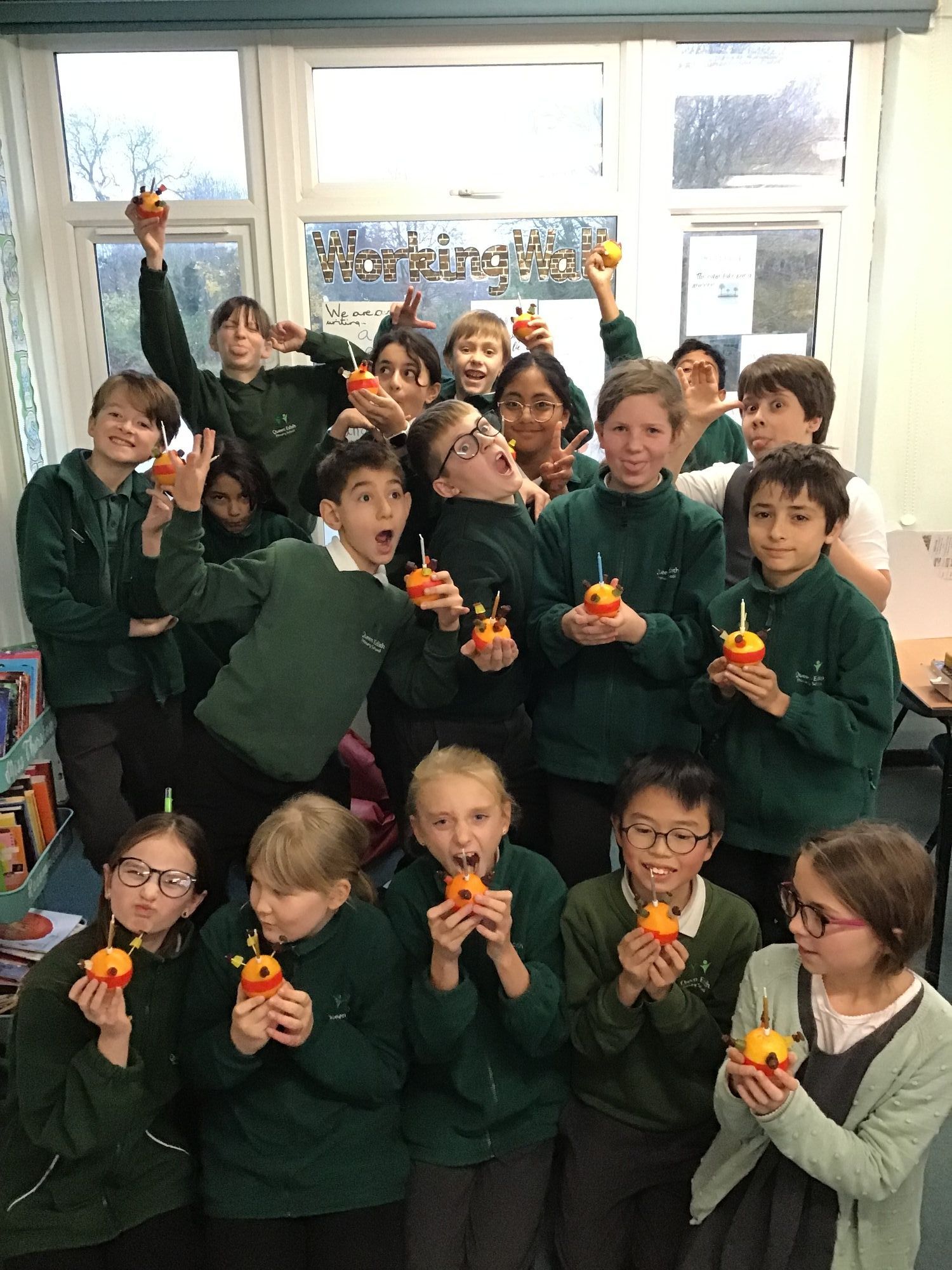
Codes for Living
Religion helps many believers make decisions in everyday life, particularly around morality. Year 6 have been considering things that they think are important, which form part of their own personal code for living. They shared their thoughts about why these things were important to them and discussed ways they show commitment to their beliefs
